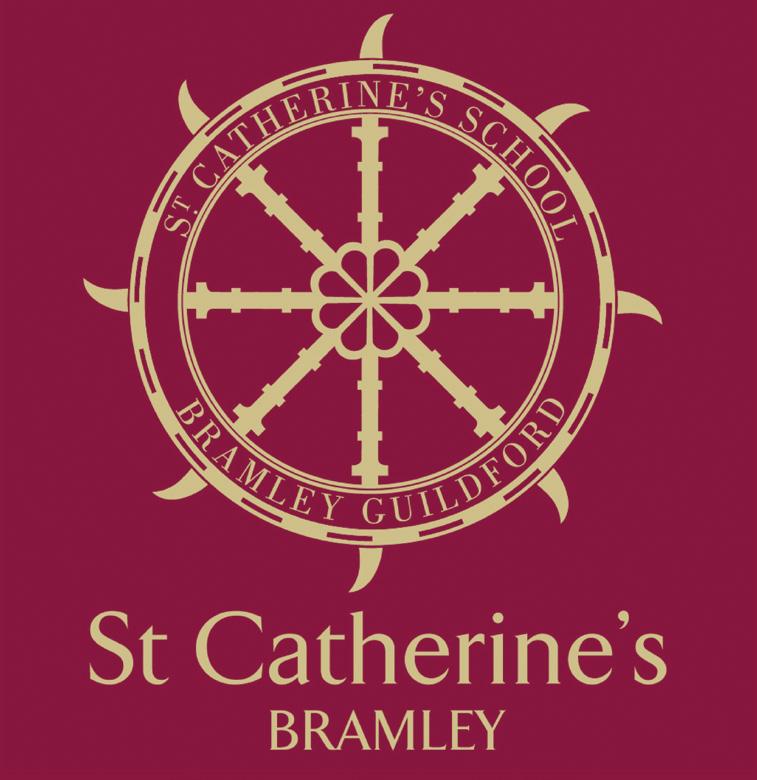
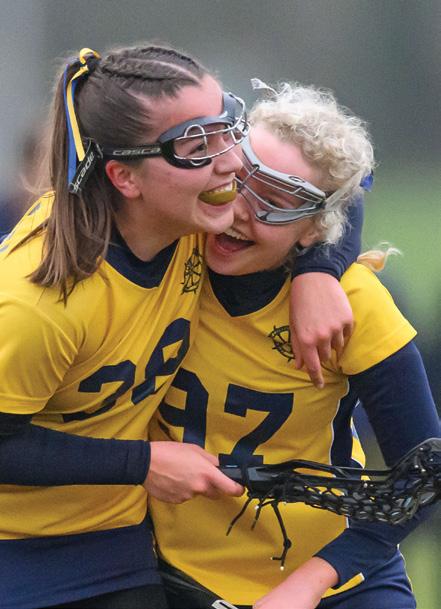
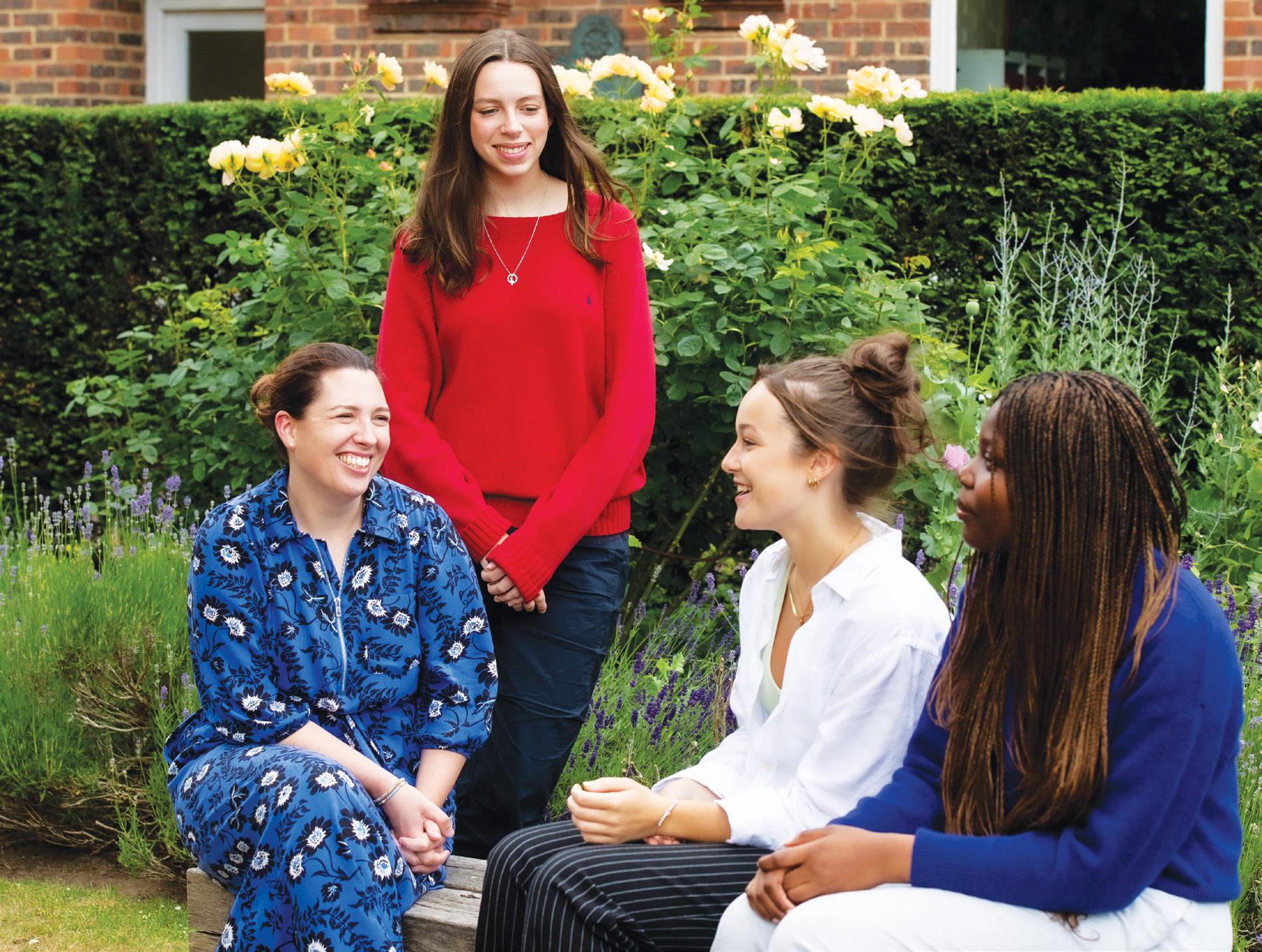
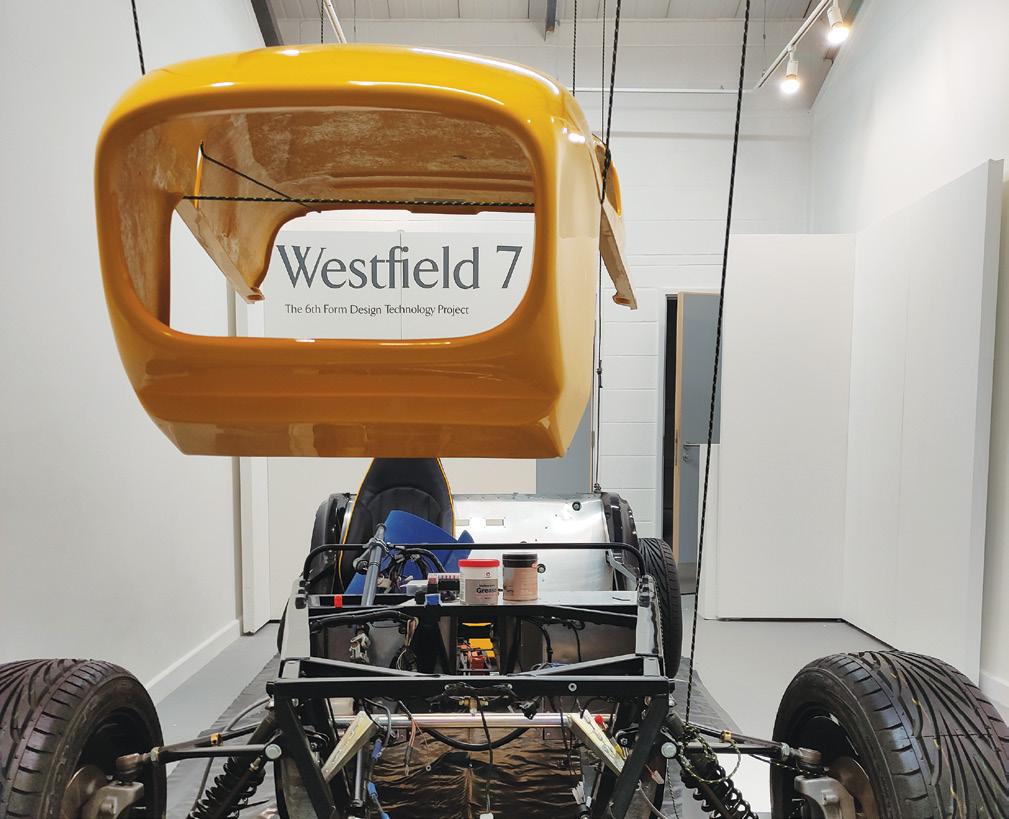
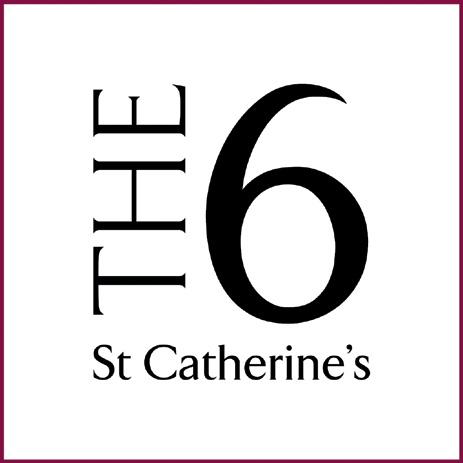
2024
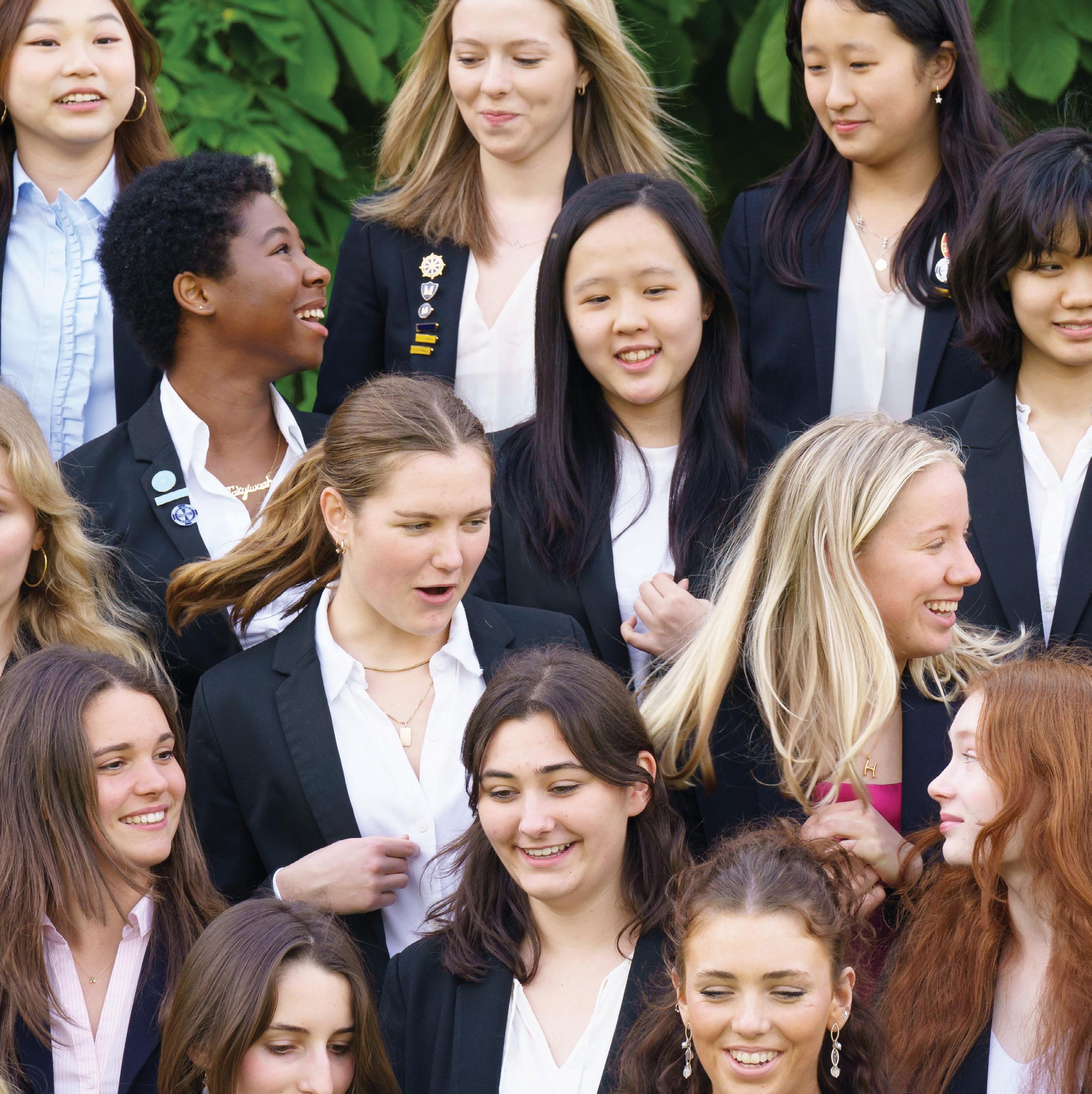
By the time they leave school, they are able to think critically, have high aspirations and a self-belief that there are few things that they cannot achieve.
Independent Schools’ Inspectorate October 2016
Why choose the Sixth Form
Boarding
The Curriculum
Choosing your A Levels
Enhancing your experience
University Choices
Careers ideas
The Association Community
A Level Results
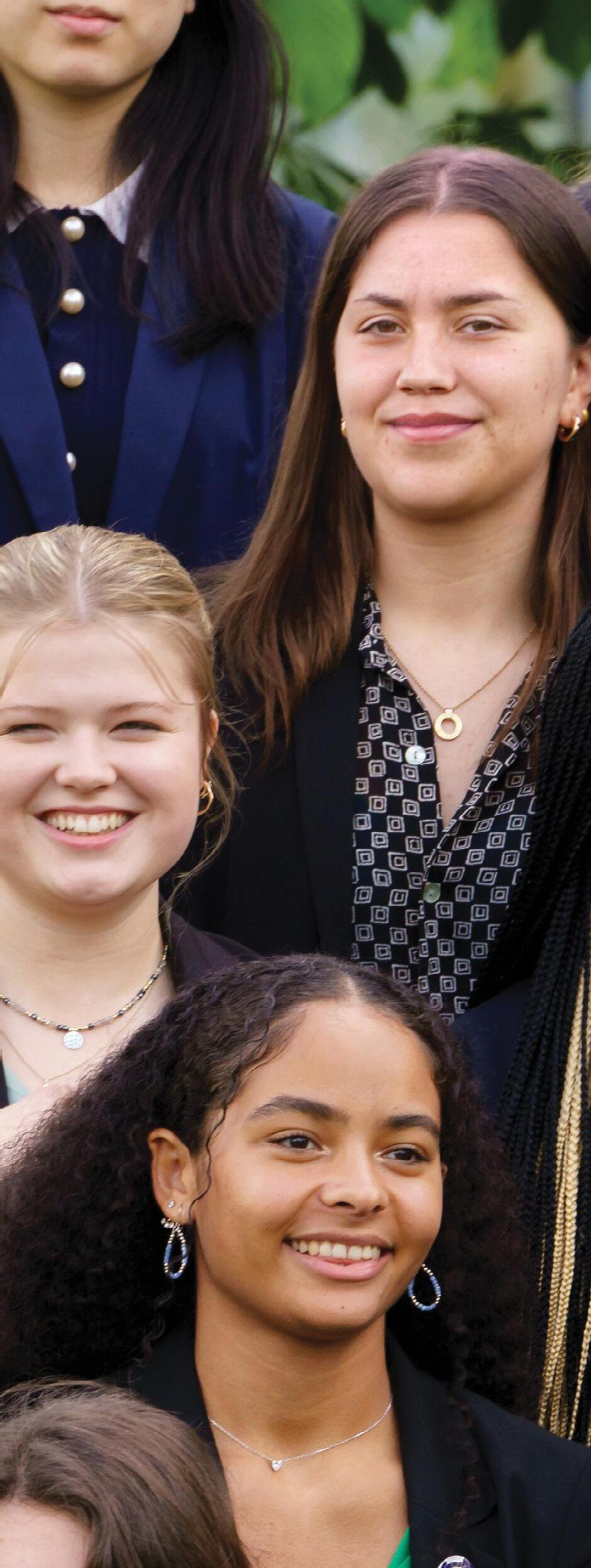
Beyond the Classroom
Where do St Cat’s girls go next?
A Level Subjects
Our Location
4 6 15 20 22 24 26 30 32 35 36 41 45 59
Welcome
FROM THE HEADMISTRESS
One of the most enjoyable aspects of being Headmistress of St Catherine’s is the privilege of watching our Sixth Form students develop from the most wonderful sixteen year olds into remarkable young women as the two years unfold.
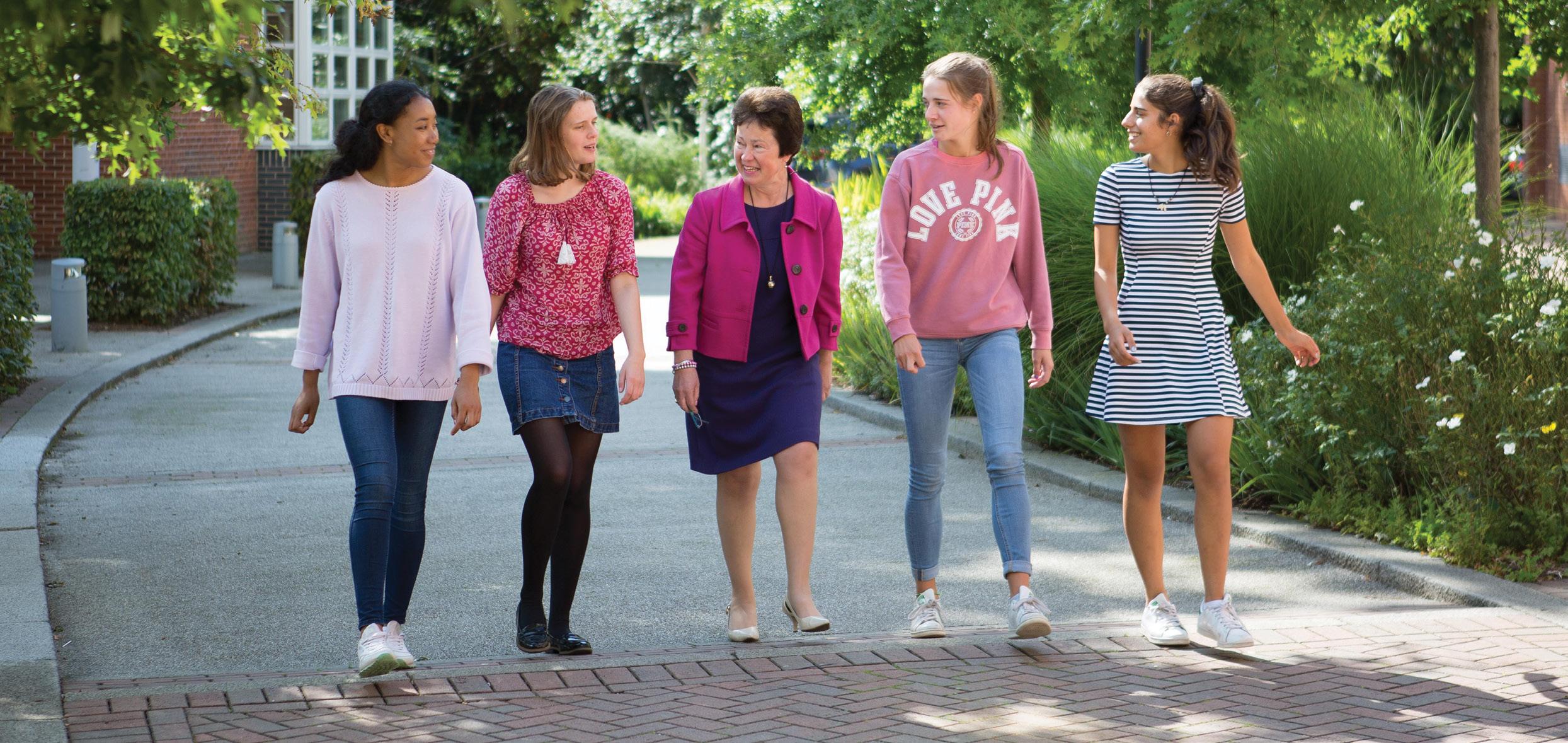
During your two years of study you will build your portfolio of qualifications: A Levels, a subsidiary subject of your choice, possibly an additional GCSE/MOS qualification, and a raft of extra-curricular experiences and certificates. Your timetable will be built round your subject choices. You can gracefully say goodbye to those areas you may have enjoyed less at GCSE and can now immerse yourself completely in the subjects you relish. Your subsidiary subject will either complement those studies or provide variety or a mindfulness moment in your busy week.
Enjoying all of your subjects means that you find you have even more energy for other activities outside the timetable, and you start to be ready to lead. Leadership skills are extremely useful lifelong. Our Sixth Form genuinely help run the School and maintain its ethos as a place where academic achievement goes hand in hand with care for others and an increased sense of responsibility. The much closer relationship with the staff also
leads to a strong camaraderie which develops over time. And, the whole experience includes having a lot of fun, too.
With the new Sixth Form Boarding House and Common Room for all, The 6 (p.15 -19), which opened in 2021, many of you will want to explore this pre-university boarding option and give yourselves more time to study and engage in extra-curricular activities. I hope that these pages will give you much of the information you need about the Sixth Form at St Catherine’s and will whet your appetite for this most exciting stage of your education.
The staff and current Sixth Form students are on standby to answer any further questions you may have. The next two years will see you taking on more responsibilities and leading from the top which is why the Sixth Form not only makes a difference but is the difference. Be sure to read what current pupils and alumnae say on page 44.
Mrs Alice Phillips MA Cantab - Headmistress
FROM THE HEAD OF SIXTH FORM
We very much look forward to welcoming you into our Sixth Form where you will find an inclusive and happy atmosphere in which everyone is encouraged to develop her talents and interests. St Catherine’s will prepare you for your A Levels, as well as for whatever lies ahead, be it university, a gap year, or another of the many opportunities possible for an intelligent and capable young woman.
By studying your favourite subjects in depth, you will develop new skills and build on existing ones. There is also the opportunity to become involved in a huge range of activities, from fundraising to film-making. Friendships are strengthened, and new ones made. You will leave St Catherine’s confident that you are ready to face life head-on and use your abilities to make the world a better place.
There is greater independence in the Sixth Form, too, which also means being responsible for managing your time effectively.
As you move into the Upper Sixth, you will contribute increasingly to the running of the School and your House, affording you valuable leadership experience as well as being a role model for the younger girls. The Sixth Form tutor team will support you in subject specialist form groups, helping you plan your university application and your future beyond St Catherine’s. Please look at our Destination of Leavers documents (p.41-43) and our A Level results which are a testament to this each year.
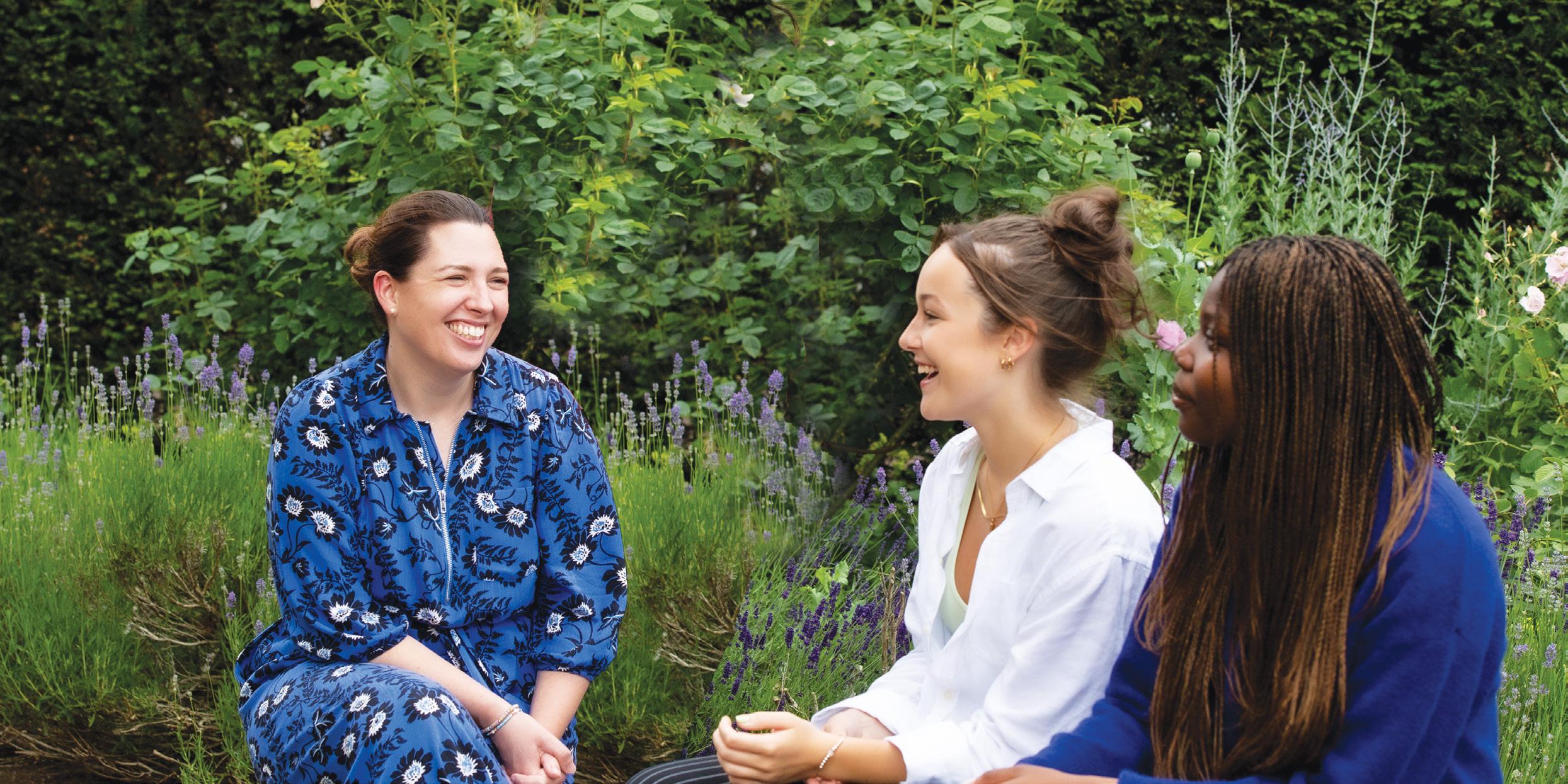
Whether it is the team-building induction days at the start of the Sixth Form, the Lower Sixth Musical that is always a highlight at the end of the School year, the leadership of House events, or a whole range of activities and trips, St Catherine’s Sixth Form is characterised by new challenges, enthusiasm, hard work, and a genuine sense of fun. When you finally leave us, it will be with a sense of achievement, purpose, self-belief, and a strong awareness of your place in the world as a young woman of extraordinary potential.
Mrs Kate Hawtin BA Dunelm, PGCE - Head of Sixth Form
St Catherine’s Sixth Form is the jewel in the St Cat’s crown .
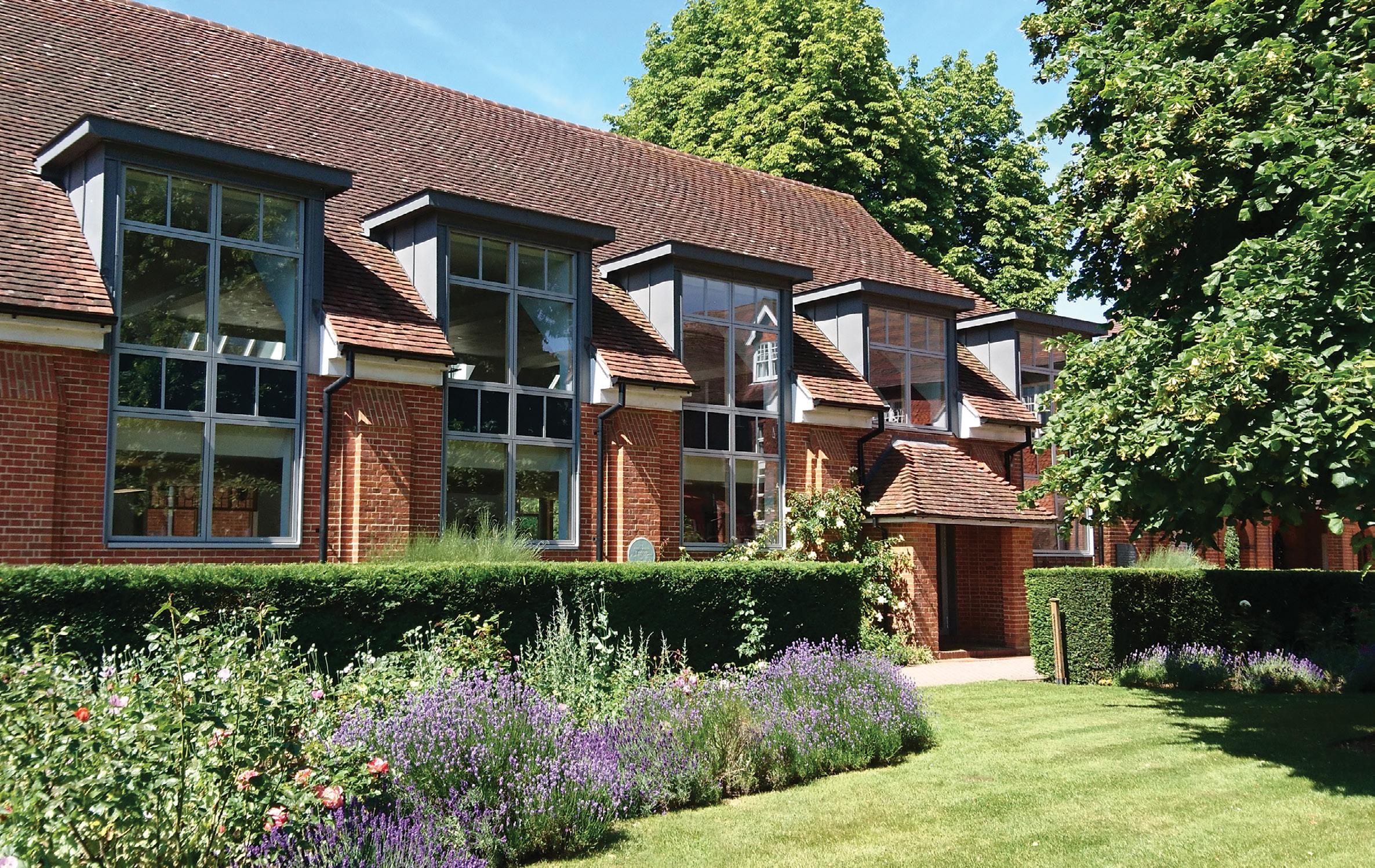
WHY CHOOSE THE SIXTH FORM AT ST CATHERINE’S?
We can list the reasons why St Catherine’s offers the very best Sixth Form experience but that won’t give you the whole story. Excellent examination results and outstanding facilities are tangible factors but what about the fundamental ethos and values which underpin the Sixth Form? House spirit is both unquantifiable and unthinkable without the leadership and energy the Sixth Form girls provide. It is hard to see where you would find such a close-knit community resulting in events such as the amazing annual Sixth Form Musical and the Charities Board Fashion and Talent Show. The Sixth Form at St Catherine’s provides an exciting launch pad for your future.
Alice Phillips, Headmistress
6
To read more about the Day in the Life of our Head Girls please scan this QR code
FROM THE HEAD GIRLS
The 6 at St Catherine’s feels like a culmination of our academic career here. It is a combination of passionate study alongside learning how to manage the responsibility awarded to us at the top of the school. As Prefects and Mentors, we have assigned roles which allow us to provide the support for the younger years that we received from Sixth Formers when we were lower down the School and to step into leadership roles in all aspects of School life.
The bonding days at the beginning of the year marked the switch to Sixth Form with an overnight stay in The 6 and bonding activities in our new form groups. It was such a big change moving from our house tutor groups to a form of people who share A Level subject interests with you. There is a strong bond within our tutor groups, and this was fostered from our first day in our new forms. Those days nurtured our sense of community within our year group, which has stuck with us throughout our Sixth Form years at St Catherine’s.
Another benefit of living in The 6 is the incredible facilities which are available to all Sixth Form students. The Sixth Form Library is a quiet study area that fosters a conducive environment for study at your own desk. We are also fortunate to have access to The 6: a social and boarding building which provides an open, vibrant space where both day girls and boarders alike can bond, relax and take a break from their studies in the Common Room. This encourages us to find the balance between work, life and relaxation, allowing us to thrive. We can catch up with our friends, with whom we might not share any classes, and form friendships with people we might not naturally be drawn to. The 6 also has 44 modern spacious bedrooms that allow boarders their own spaces to unwind at the end of the day.
The ability to choose the subjects you would like to study at A Level greatly benefits our individual learning. In all our classes, it is evident that there is a genuine passion, interest and desire to learn more about our chosen subjects from both the students and the teachers alike. As well as this, the relationships that we develop with our teachers ensure that we are supported and feel confident to reach our full academic potential.
We have both loved our Sixth Form experience as both day girls and boarders and feel we have developed skills and abilities that will remain with us for life. The independence that comes with managing our own studies, contributing to School in the form of prefect and mentoring roles and the greater freedom and opportunity to work together as a year group – for example on presenting our Sixth Form Musical, Annie, creates a supportive atmosphere and a community in which we feel everyone can flourish.
Mia and Danai, Head Girls 2023-24
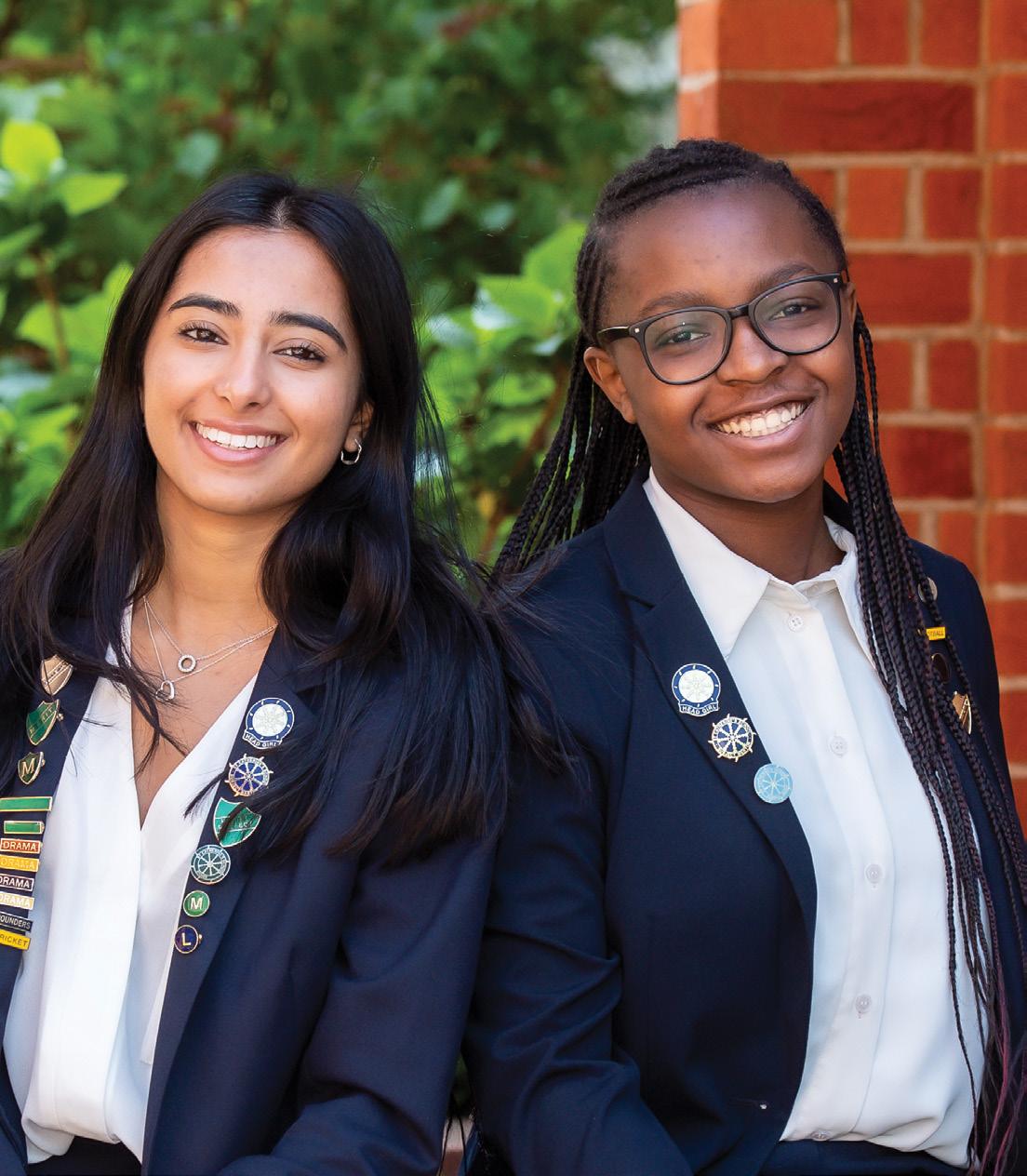
Mia and Danai, Head Girls
7
We have both loved our Sixth Form experience as both day girls and boarders and feel we have developed skills and abilities that will remain with us for life.
12
TUTOR GROUPS
87
175
1:1 84 MEMBERS OF THE ST CATHERINE’S ASSOCIATIONCAREERS NETWORK FOR LIFE
HIGHLY QUALIFIED TEACHERS
UCAS ADVICE PREFECT ROLES
8
CLUBS
28
A*- B A LEVEL A LEVEL SUBJECTS
8500+
TOP 5 INDEPENDENT SPORTS SCHOOL IN THE UK, 2022 (SCHOOL SPORT MAGAZINE)
MUSIC LESSONS
- OVER 26 INSTRUMENTS
320
GOLD DUKE OF EDINBURGH AWARD HOLDERS SINCE 2010
100+ 8 %
GIRLS IN SIXTH FORM AVERAGE SIZE OF TEACHING GROUPS
7
1:1 104
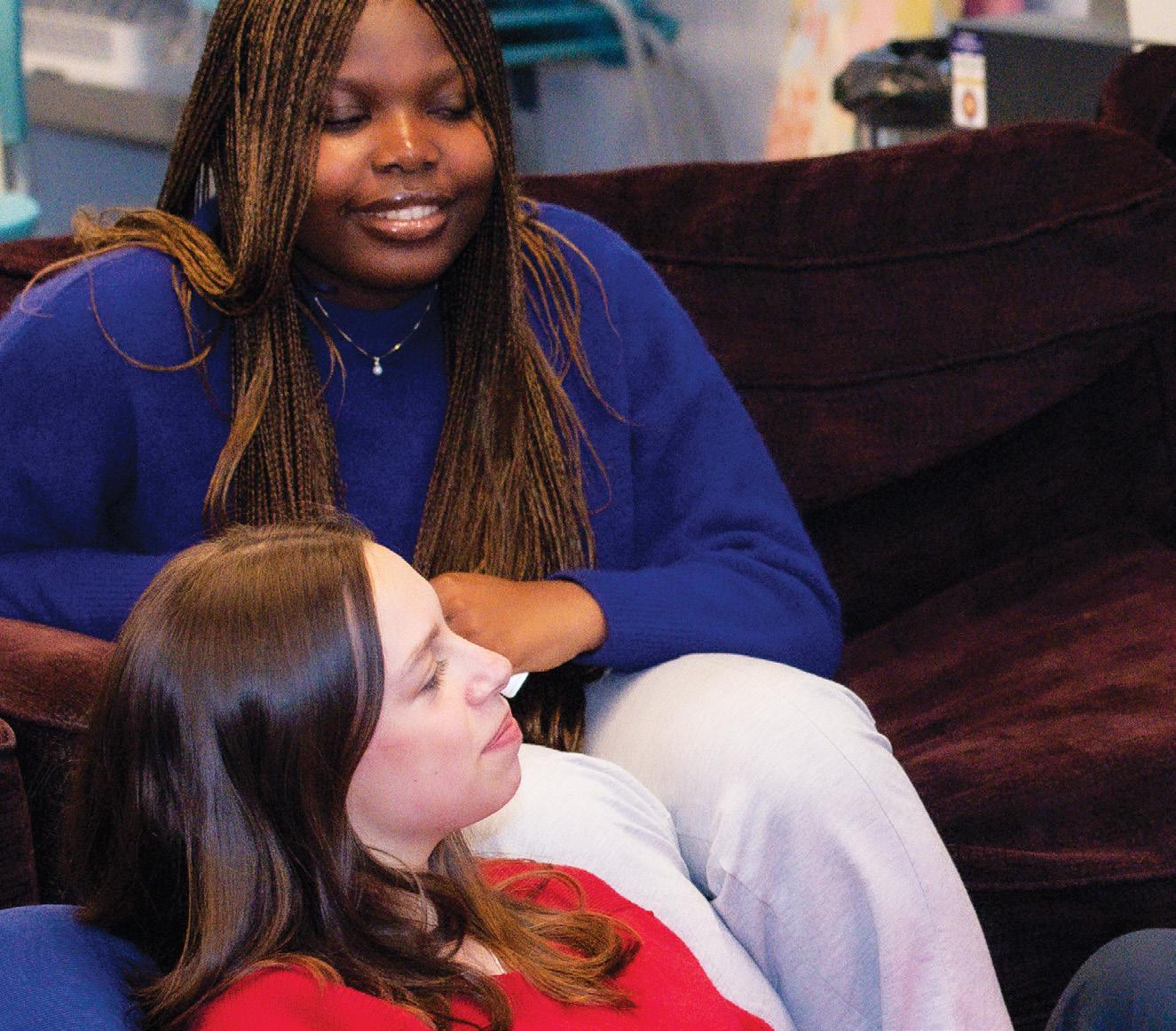
OF GIRLS GO TO OXBRIDGE OR RUSSELL GROUP UNIVERSITIES DIFFERENT SPORTS PLAYED 16 PLACE BOARDING SCHOOLS’ ASSOCIATION EXCELLENCE AWARD FOR THE 6 CAREERS FOCUSED EVENTS IN A TYPICAL YEAR SPACES FOR THE CREATIVE ARTS * See page 41 DANCE CLASSES PER WEEK (TAP, MODERN, BALLET) 12 30 70% 1st BEDS IN THE 6 9
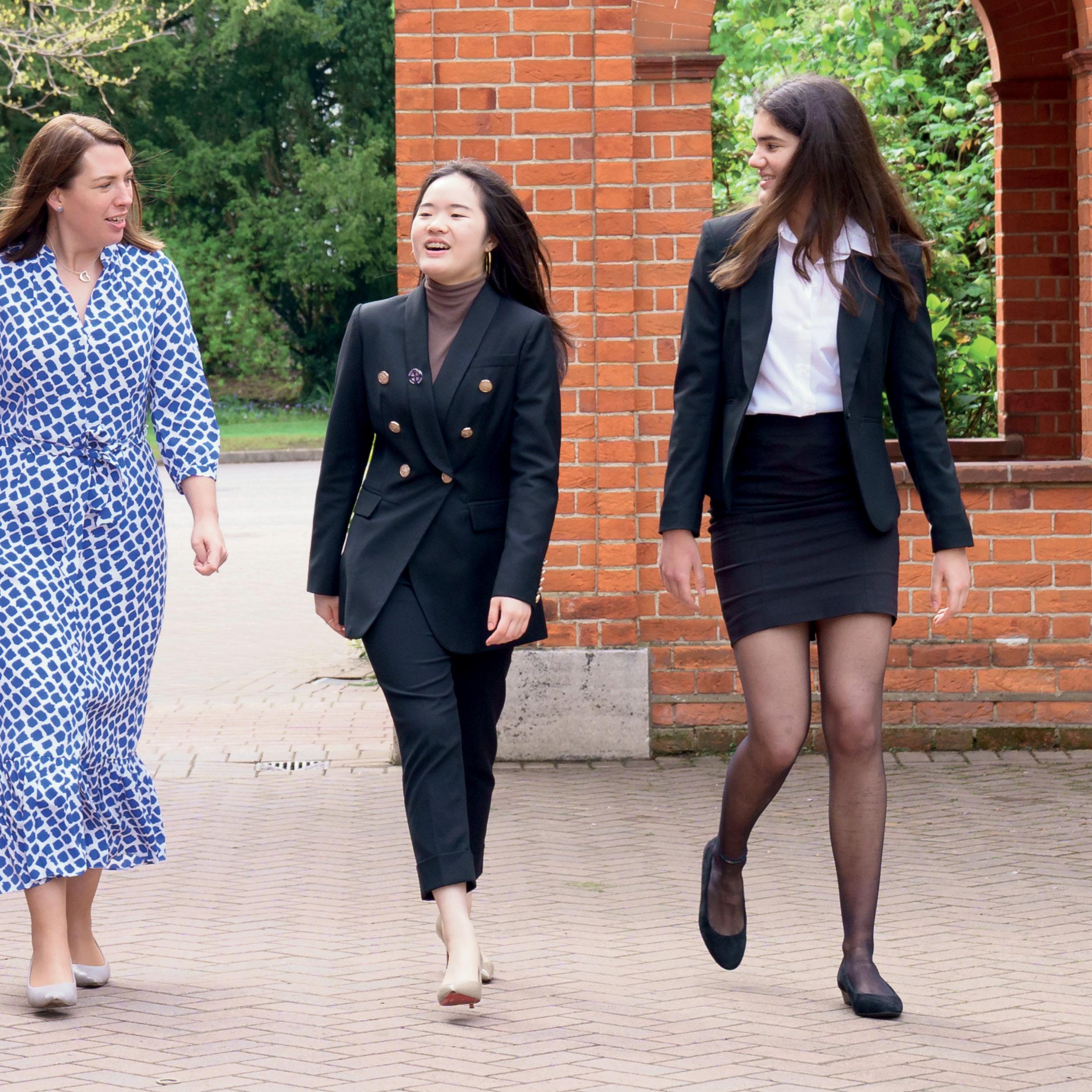
Una
10
I love how supportive all of the staff are with helping to get the best out of us! They genuinely want the best for you and will go above and beyond to help you reach your potential. Una
St Catherine’s sets out to maximise your Sixth Form experience. We understand girls. After all, we’ve been involved in girls only education for over 135 years!
These next two years will fly by. St Catherine’s ensures every day is worthwhile.
ACADEMIC EXCELLENCE
You will enjoy the benefit of working with highly qualified staff who are prepared to go the extra mile to help you. St Catherine’s staff are experts teaching girls. We also work very hard to tailor the timetable to fit your dreams and future plans, not the other way around.
Although one of the largest independent Sixth Forms in the area, class sizes are small to ensure your teachers know you, allowing them the time to provide the extra attention you need whether in the classroom or in assessing your work and giving you meaningful feedback.
St Catherine’s Sixth Form girls are bright and have high aspirations, creating an exhilarating climate which fosters intellectual curiosity, develops confidence and creates a joy in learning. At St Catherine’s you do not need to feel embarrassed about enjoying your subjects! Everyone has high aspirations.
Our results are recognised nationally. 70% of St Catherine’s girls go to Oxbridge or Russell Group Universities. 8% choose overseas colleges and universities and 22% non-Russell Group universities and Music & Drama conservatoires. In addition, The 6 at St Catherine’s was recognised as a community as the Winner of The Boarding Schools’ Association ‘Supporting Excellence’ Awards 2022.
SUPERB FACILITIES
You will enjoy access to everything you could possibly need to make your next two years a success: an attractive and dedicated Sixth Form Library, with full access to fast broadband and plenty of sockets for mobile devices, and a modern Common Room and kitchen in The 6 You will also have a state of the art sports and performance space – the Anniversary Halls – and plenty of resources, from books to computers, to ensure you have everything you need to be an effective learner and communicator in the 21st century. Extensive grounds and attractive green spaces add to the mix, making our Sixth Form a wonderful environment for your next two years.
BOARDING OPPORTUNITIES GALORE
Many day girls opt into Sixth Form boarding which offers a whole raft of benefits, not least the extra time gained for work and relaxation. Read more about it and all the boarding facilities in The 6 on p.15.
St Catherine’s offers a raft of opportunities, inside and outside the classroom, and via our long-established and highly regarded House System. When it is time to complete your Personal Statement for UCAS or any other applications, you will be pleased you chose St Catherine’s because your active participation in sport, music, drama, outdoor pursuits and charity work will make your application stand out. Moreover, you will all have had the opportunity to lead and take responsibility. As a result you will develop those so-called ‘soft-skills’, which will benefit you in all sorts of ways at university and later in the world of work. Girls appreciate the advice and support they receive throughout their university applications and, for those who decide to take a gap year, that help continues, until you reach your chosen next step.
Katie Waller (2020), History 1st Class, Nottingham
11
I never would have taken History forward without the amazing teachers at St Cat’s. Mrs Cooke, Mrs Burns and Mrs Higgs taught me so much.
WELLBEING
One of the best features of the St Catherine’s Sixth Form is the level of personal support and care you will enjoy.
You will be assigned a personal tutor who will, more than likely, be a specialist in one of your chosen subjects areas and who has the experience to guide you in your academic studies and oversee your progress in general.
Your tutor will be your first port of call if you have any worries, be they academic or pastoral, and you will see your tutor twice a day for regular support. In addition you can, of course, talk to the Head of Sixth Form or your School Housemistress/Housemaster and, for boarders, the Sixth Form Boarding Housemistress, Senior Boarding Housemistress and the Resident and Medical Staff at any time.
As you build the foundations for the next important and exciting phase of your education, it is good to know you are in very capable hands. Make the best of everything on offer.
A SIXTH FORM JUST FOR GIRLS
We believe this is important. Why? Because it creates an environment where girls can take academic risks and make mistakes along the way without fear of assumptions being made that are gender based, and where there is no shame in working hard or being successful. It also supports a ‘can-do’ philosophy. Girls hold all the senior positions at St Catherine’s: all the scientists are girls, all the mathematicians are girls. There is no subject area or activity in which girls do not excel here.
HOUSE SYSTEM
Those of you in the Fifth Form will understand the fundamental role of the House system at St Catherine’s. As a Sixth Former, you will play your part in running your House, gaining valuable, transferable skills and enjoying the many house competitions and events.
St Catherine’s Sixth Formers experience genuine roles of responsibility and leadership with proper job descriptions which make a real difference and to which the younger girls aspire. Head Girls, House Captains and a whole host of other prefect positions are pivotal. It is hard to imagine the School could run so effectively without this input.
LIBRARIES
In addition to the Speech Hall Library, their study centre, the Senior School Library provides excellent support for Sixth Form students. As well as books supporting curriculum teaching there is a particular focus on providing extended reading material and students are encouraged to read around their subjects to support their studies and help them decide on their university courses.
The Library takes a selection of national newspapers and magazines including The Economist, The Week and New Scientist. We also subscribe to an impressive list of online publications and services and the Senior School Librarian is available to help with literature searching and all aspects of using the library.
Pupils can access the Oliver Library Catalogue on any computer in School or from any device at home: an excellent resource.
I have really grown thanks to my leadership roles in Sixth Form, such as House Captain, lacrosse team captain and Duke of Edinburgh’s Award mentor. These have helped me improve my confidence and public speaking and made me feel so much more involved with life at School.
Ellen
12

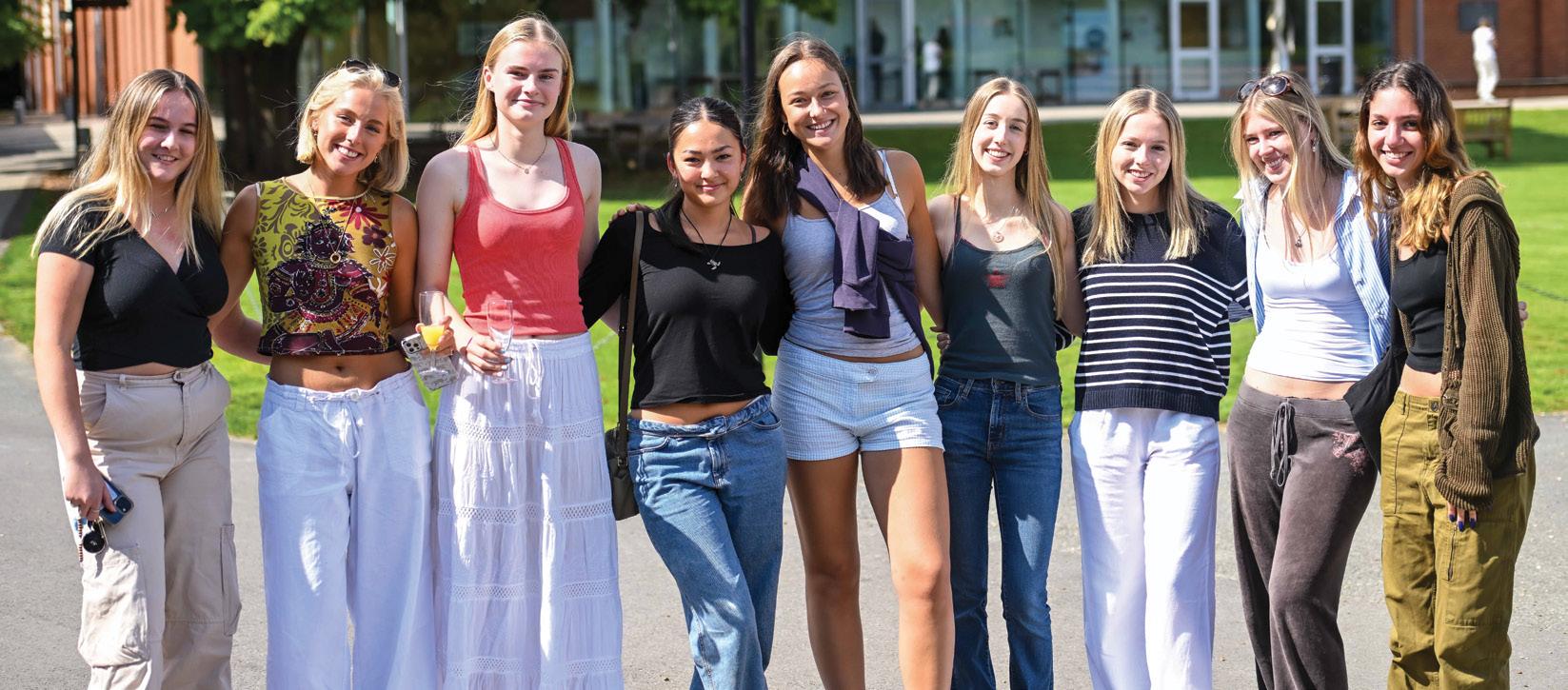
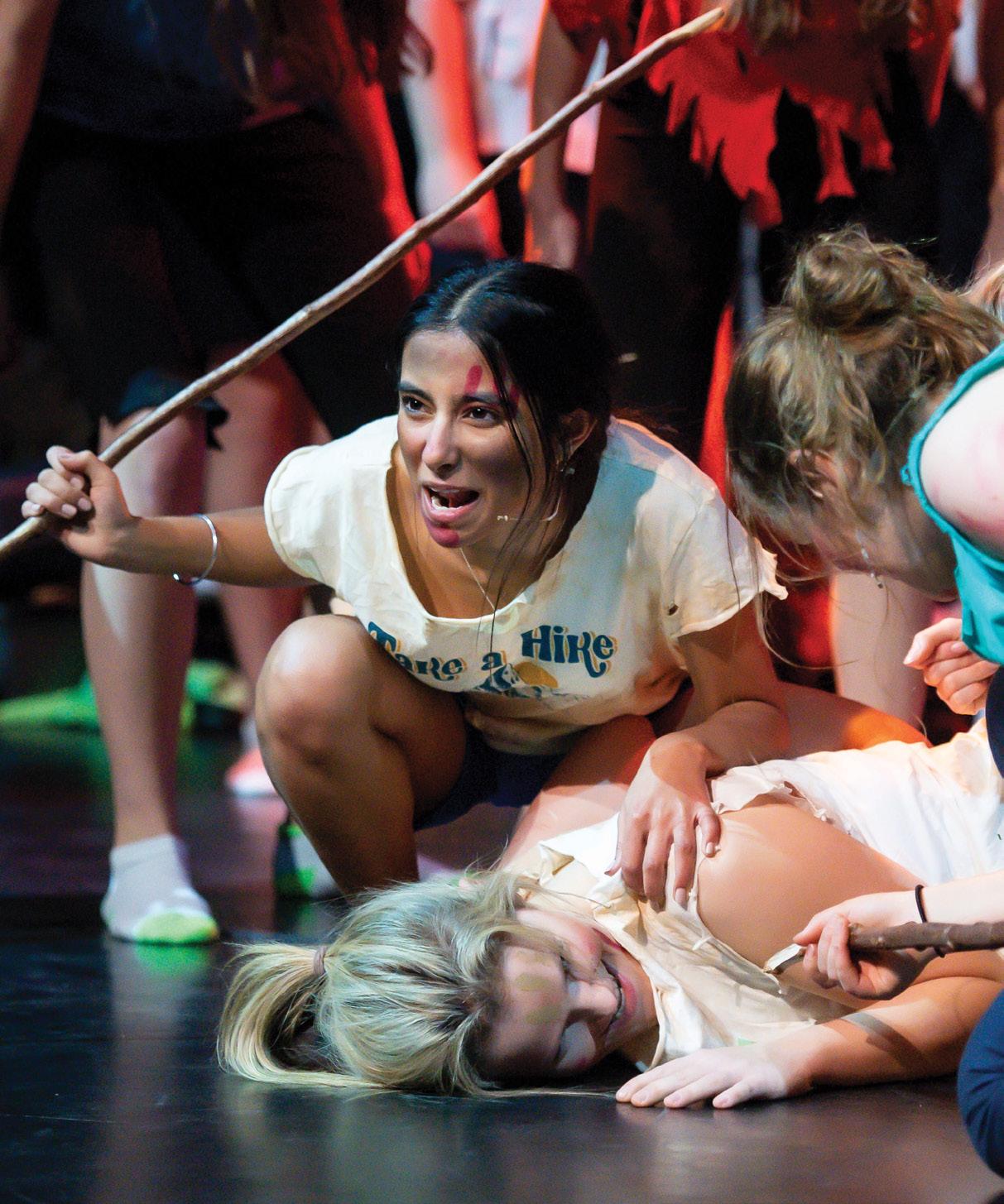
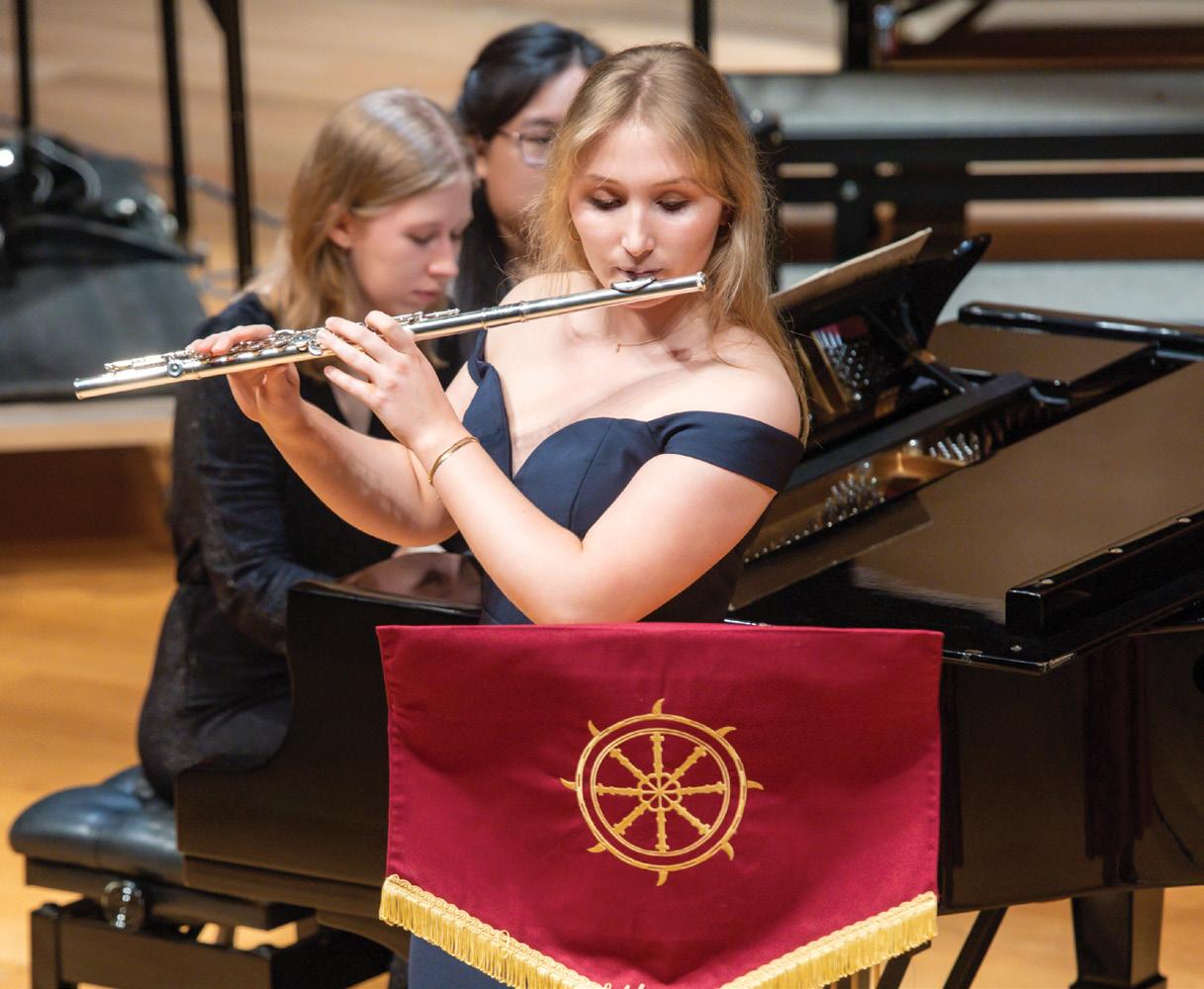
13
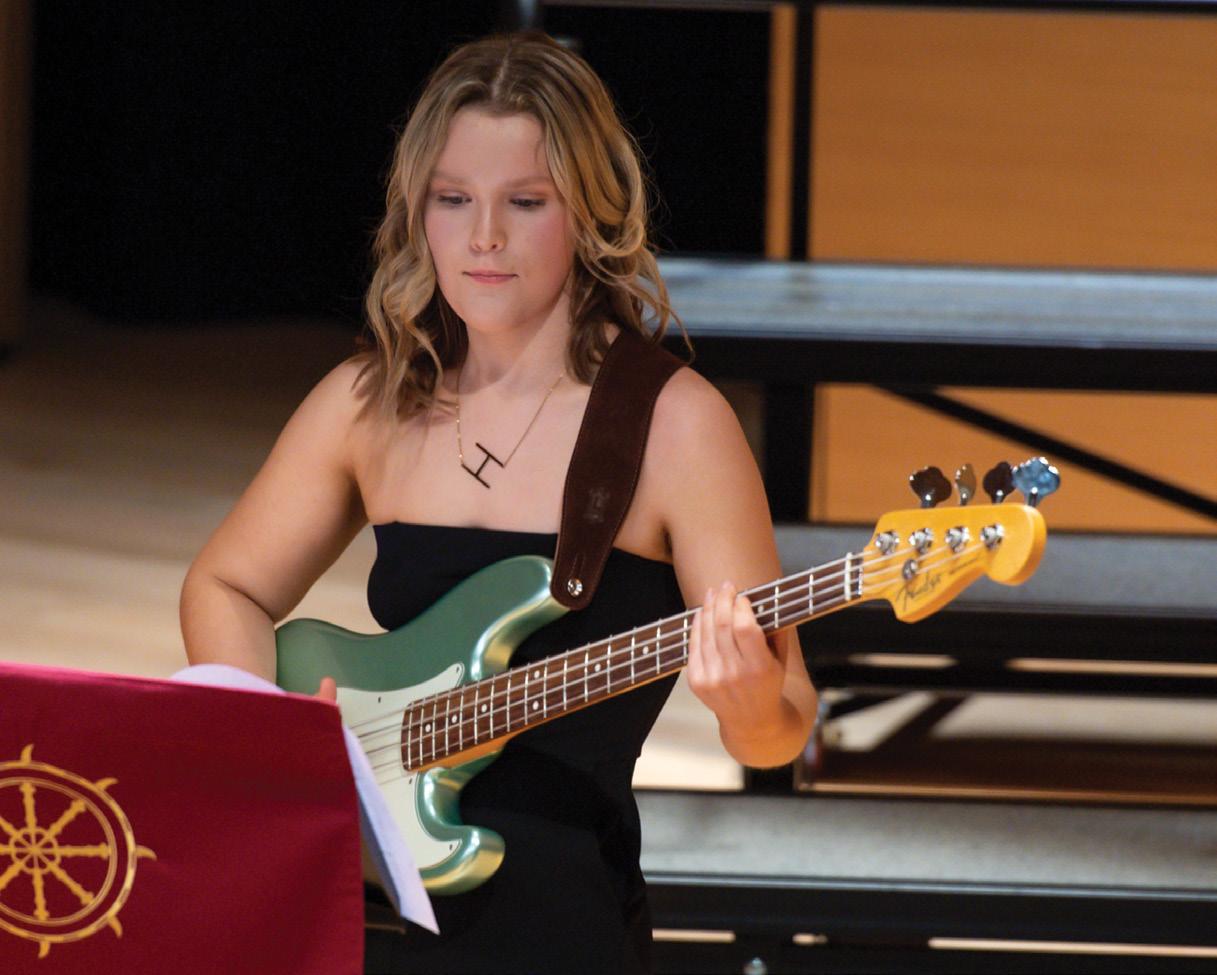
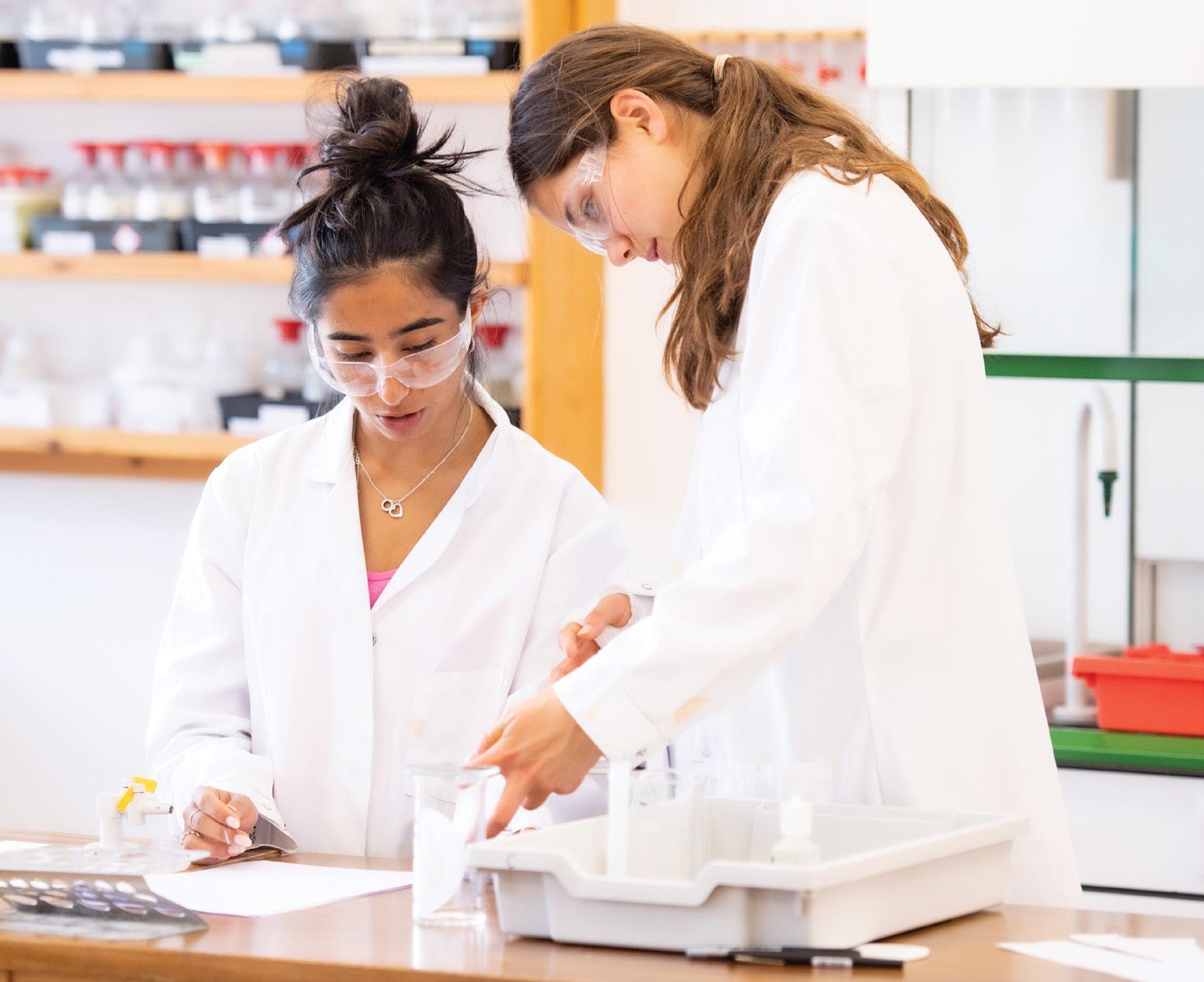
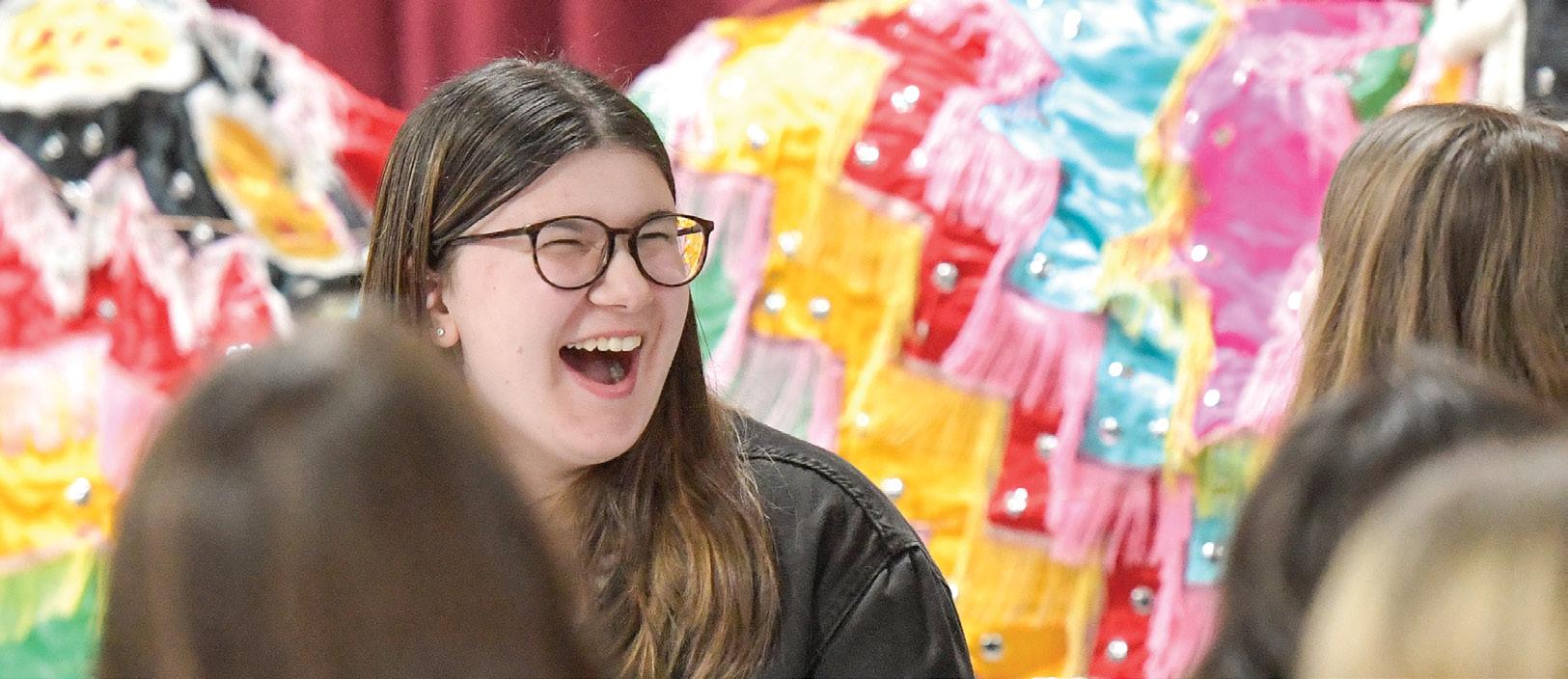
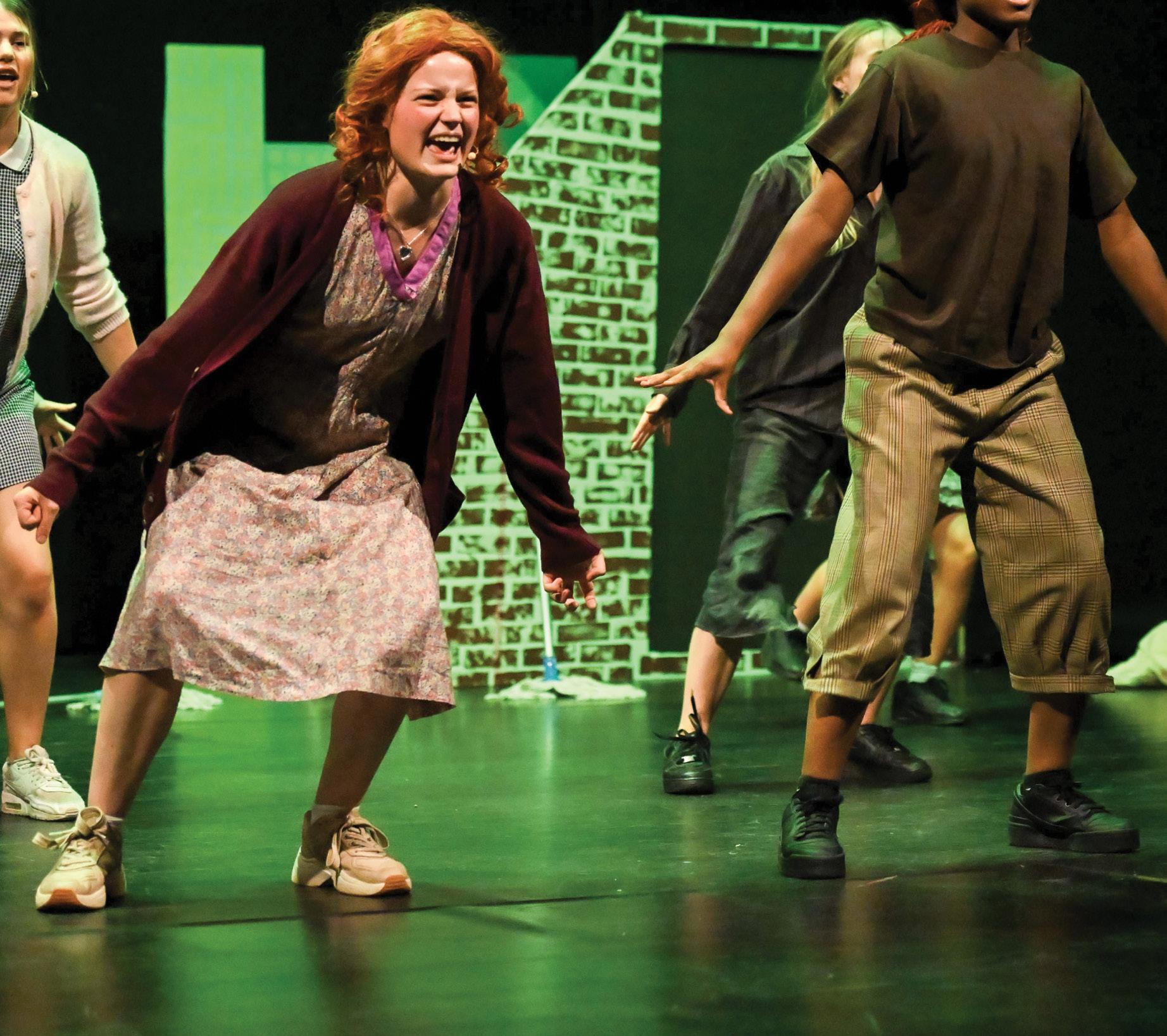
14
BOARDING
Boarders are fully immersed in life at St Catherine’s, with so many opportunities for ‘work, rest and play’. The Sixth Form Boarding House is run by Mrs Jackie Street, along with her boarding team of resident House Tutors. Together, they aim to ensure you feel welcome and that you enjoy a home-from-home experience.
Sixth Form boarding offers an enormous number of benefits and is a very popular option because it is a great transition between school and university. Current day girls opt into boarding when they enter the Sixth Form and new girls join us from the UK and abroad.
Boarders enjoy a far wider range of freedoms in the Sixth Form, based on mutual respect and trust. Resident boarding staff enjoy their roles, ensuring there is always the right level of support and structure at this important time.
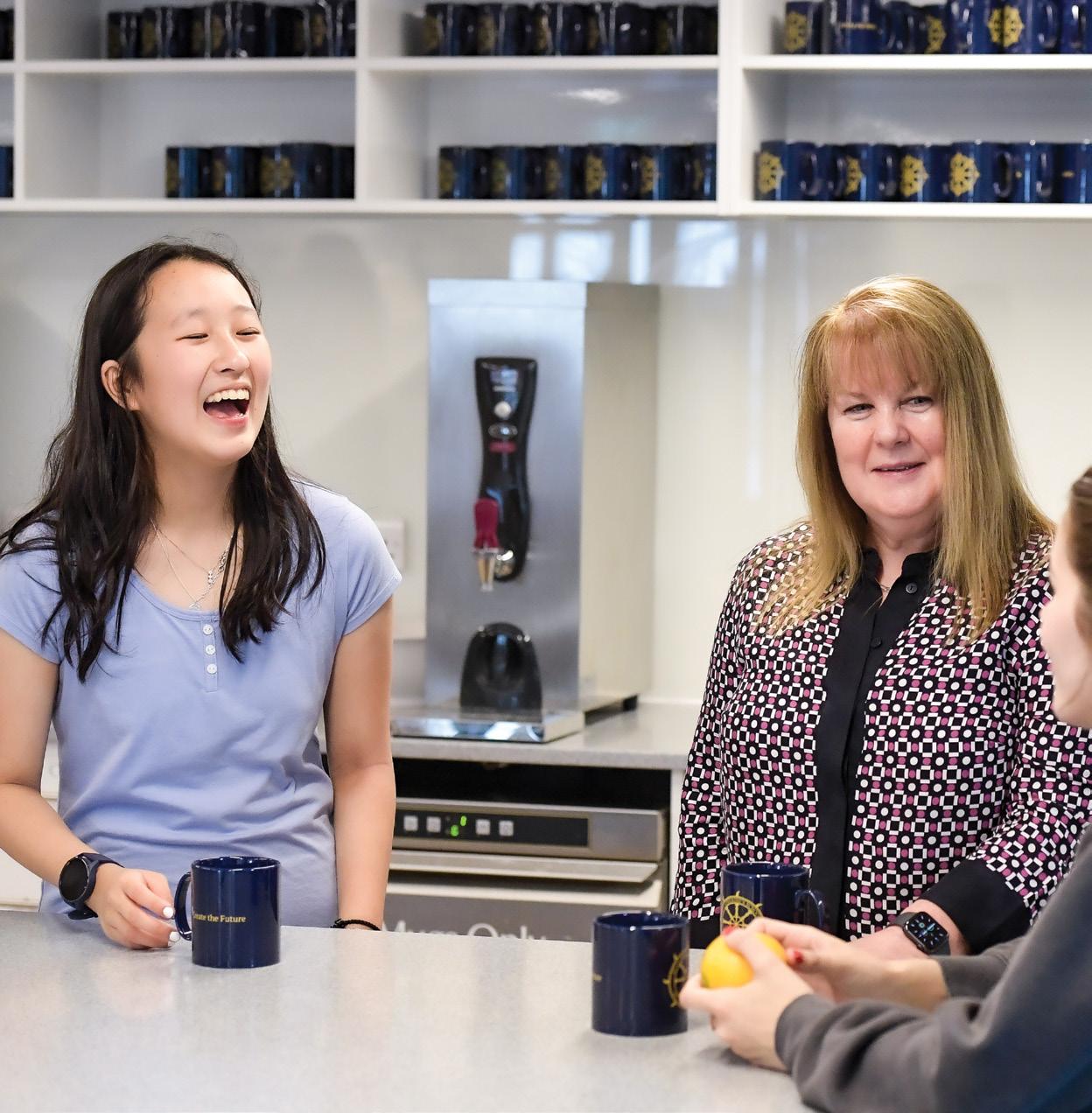
We asked girls what they like about boarding in the Sixth Form. They all agree the opportunity to make friends and be a part of a close-knit community are compelling reasons but there are others! Time saved is a huge bonus, with easy access to sport, drama, art and music facilities before school and into the evening as well as more time in which to study. There is no commuting/travel time.
Boarders can choose to work in their rooms during study periods or in the Speech Hall Library, known affectionately as ‘the SHLib’, which is open late and at weekends.
Boarding helps you manage your time. It enables sportswomen to attend early morning practices, have a delicious breakfast, shower, and still be ready for registration at 8.30am. Accessing Music practice rooms, Sixth Form Art Studio, drama rehearsals, Sixth Form Lectures, and school concerts all becomes blissfully simple. The fitness suite, squash court and swimming pool are available for use by boarders in the evenings. Open House is a popular weekly social event hosted by Mrs Street. And weekends are never dull with lots of exciting trips as options, sports fixtures, concerts and rehearsals, as well as time to study.
Solange
15
I love the supportive environment of the boarding house staff and the people around me. Everyone is really nice and always ready to help. I feel safe and supported.
To learn more about the building of The 6 please scan the QR Code
YOUR OWN SPACE – THE 6

St Catherine’s is a community, not an 8.30am4.00pm School. Our boarding community of over 170 girls means St Cat’s is always open. You can make use of the gym or pool in the morning or the Sixth Form Art Studio in the evening, reduce your travel time and focus on your studies.
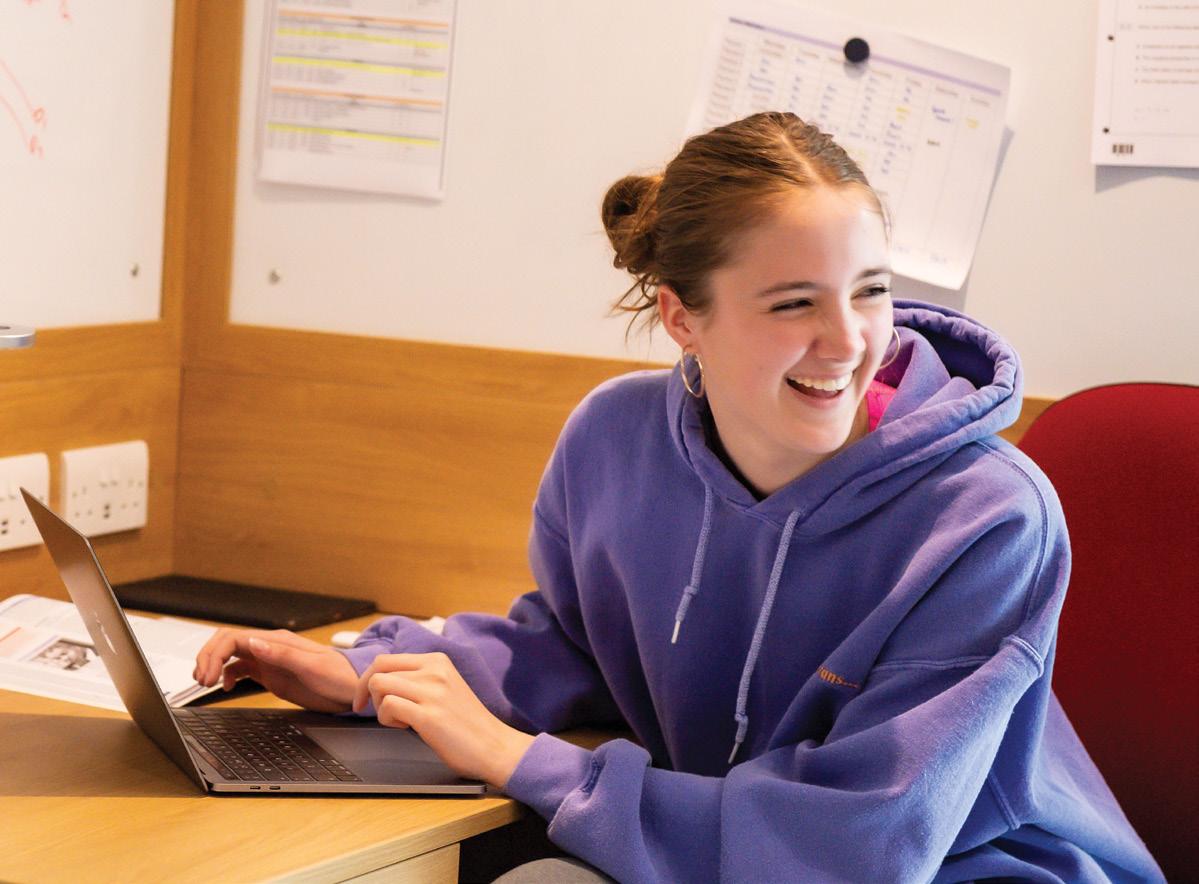
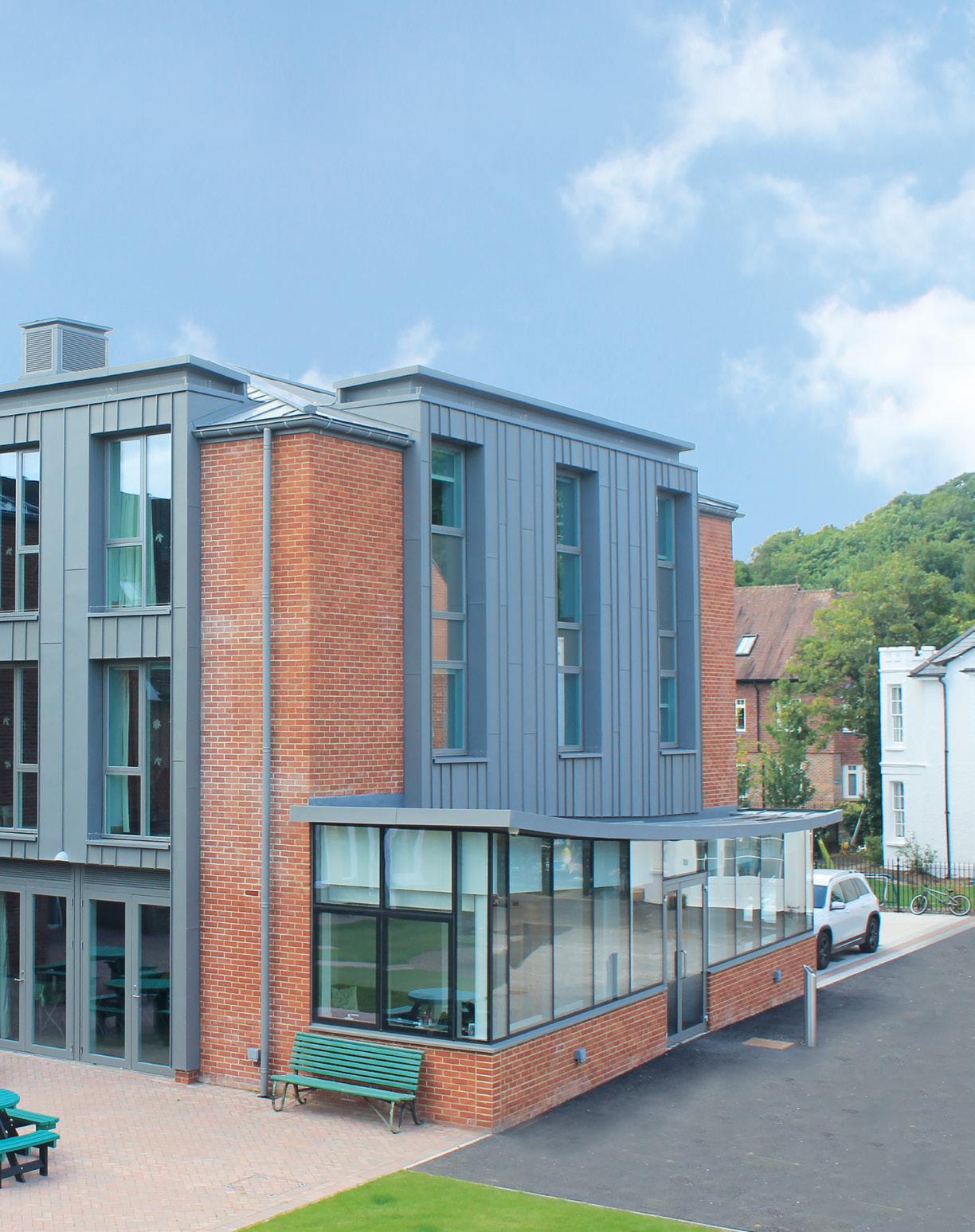
The 6 is a new building offering vibrant, modern boarding accommodation and a huge Common Room, a place where day girls and boarders can relax and recharge during the school day. There really is no better reward after a match or tough study session than tea or hot chocolate and toast, sitting on a comfy sofa chatting with your friends!
With spacious twin study bedrooms and bright, modern bathrooms, The 6 really does offer a home-from-home environment.
16
THE 6 IN NUMBERS
Common Room..........
for all the Sixth Form community, day girls and boarders alike: a comfortable seating space offering girls a place to relax, with a fully fitted kitchen to prepare refreshments anytime and meals at the weekends if the girls so wish.
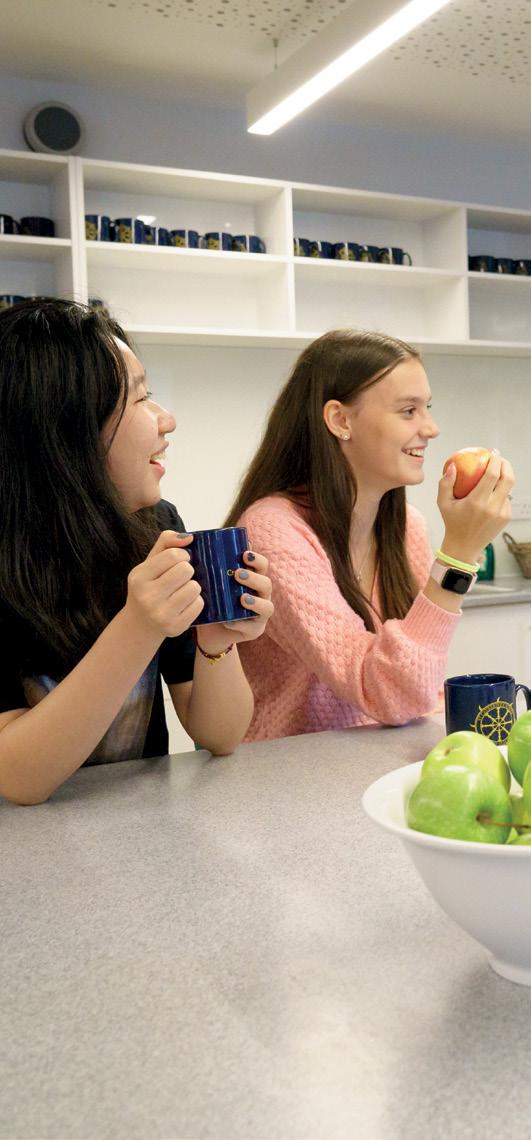
‘Snugs’ – social spaces..........
off the main bedroom areas on the first and second floors for quiet time, relaxation, conversation, to watch TV or listen to music in the evenings and at weekends, or to share chat about the day’s events or homework challenges.
Staff Reception Offices..........
to welcome our girls and visitors and also to support you in day-to-day Sixth Form life. There is always a member of the teaching staff on-hand 24/7.
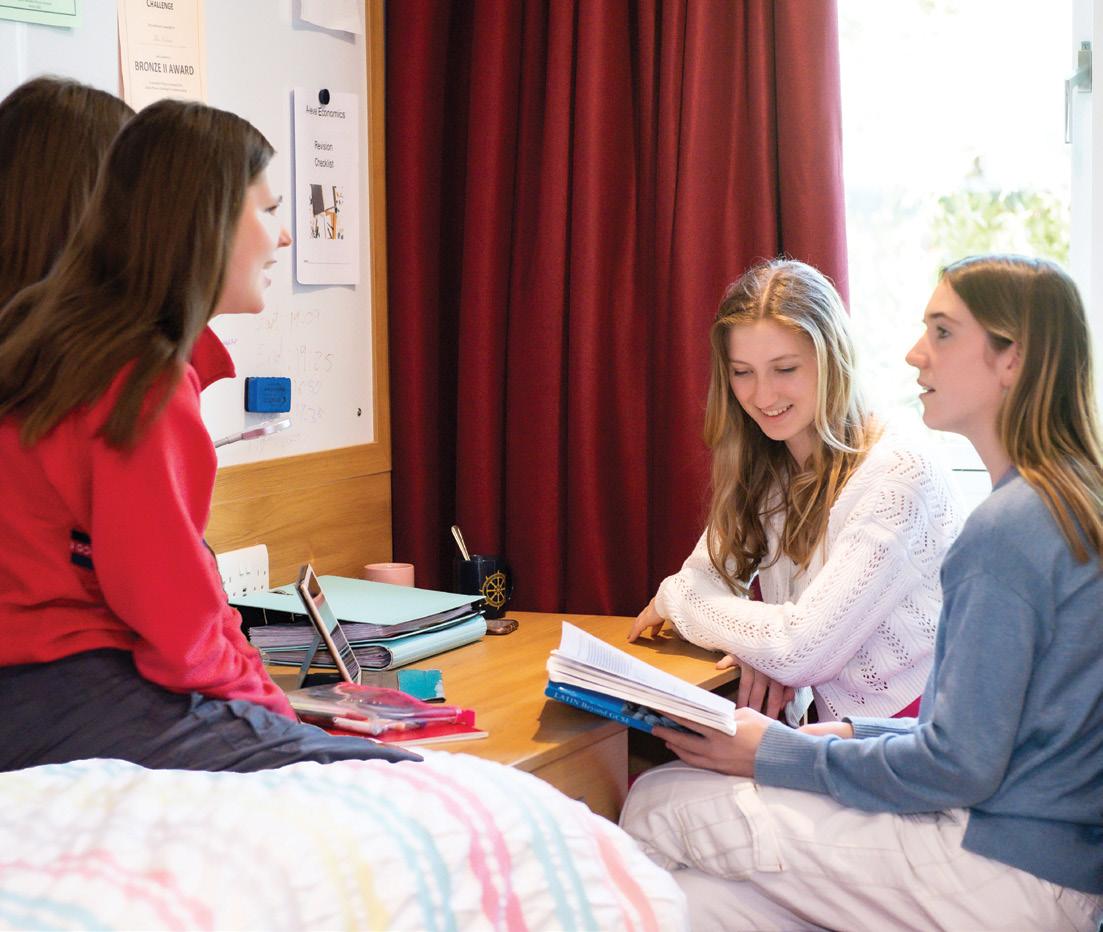
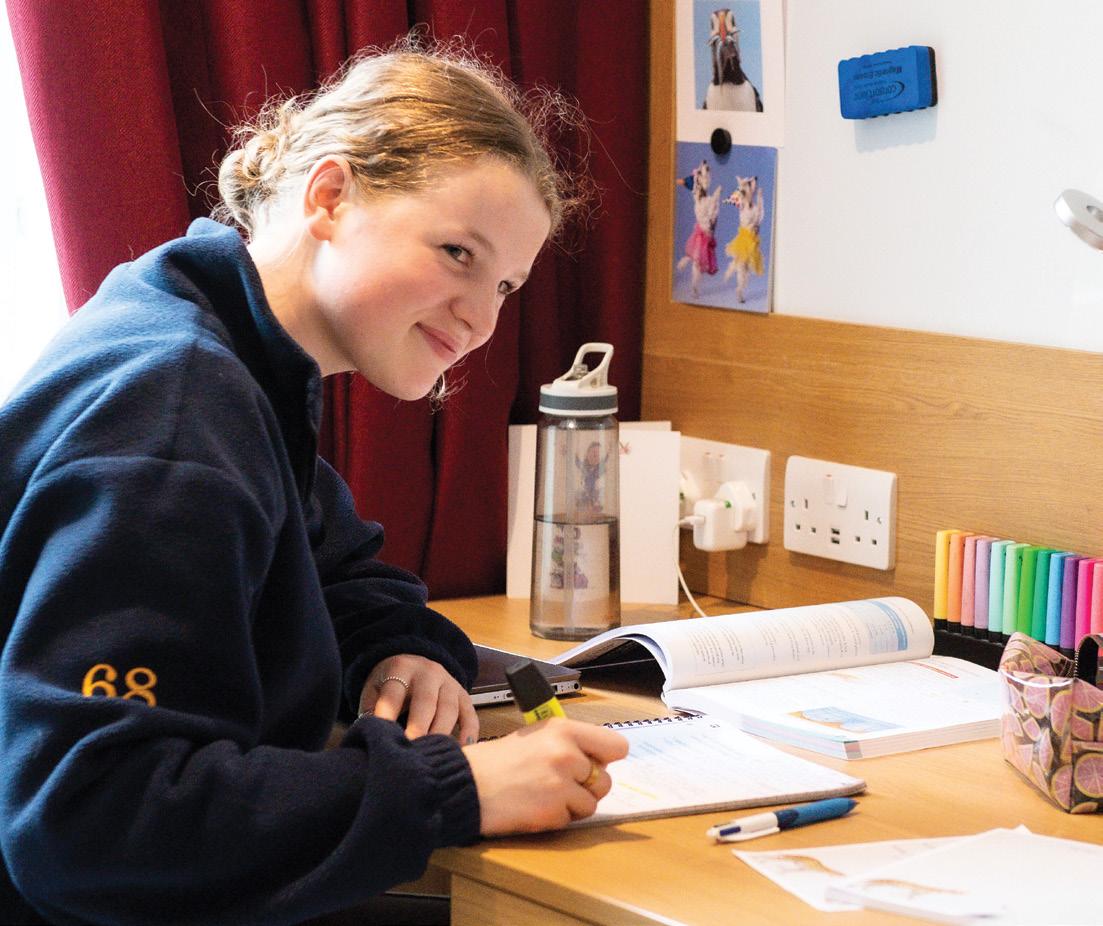
Staff Flats..........
so that boarders have guidance and support when they need it, just as they would at home.
Bathrooms..........
because we know that teenagers like hot, powerful showers and lots of bathroom space! You will have modern, contemporary bathrooms and ‘private’ bath spaces for relaxation.
Twin Bedrooms
designed by boarders for boarders. You will have a comfortable bed, a wardrobe with full length mirror, lots of under-bed storage, floor-to-ceiling windows for extra light, and your own study desk and shelving. You can make your room your own with your large pinboard walls and magnetic whiteboards for daily notes/reminders.
17
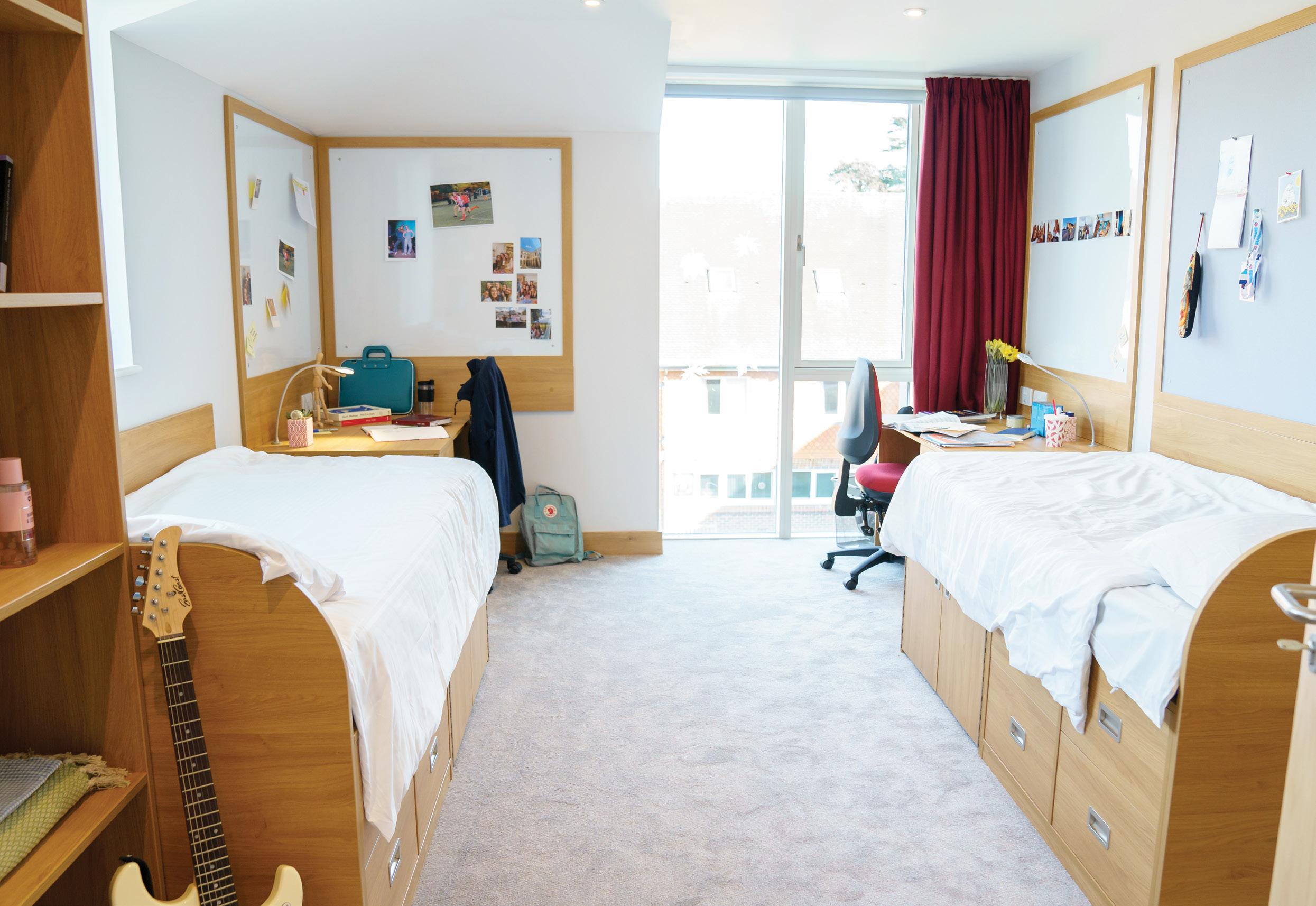
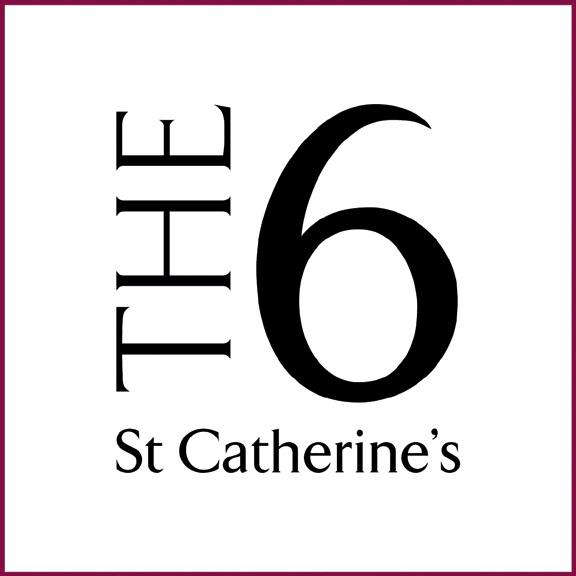

18

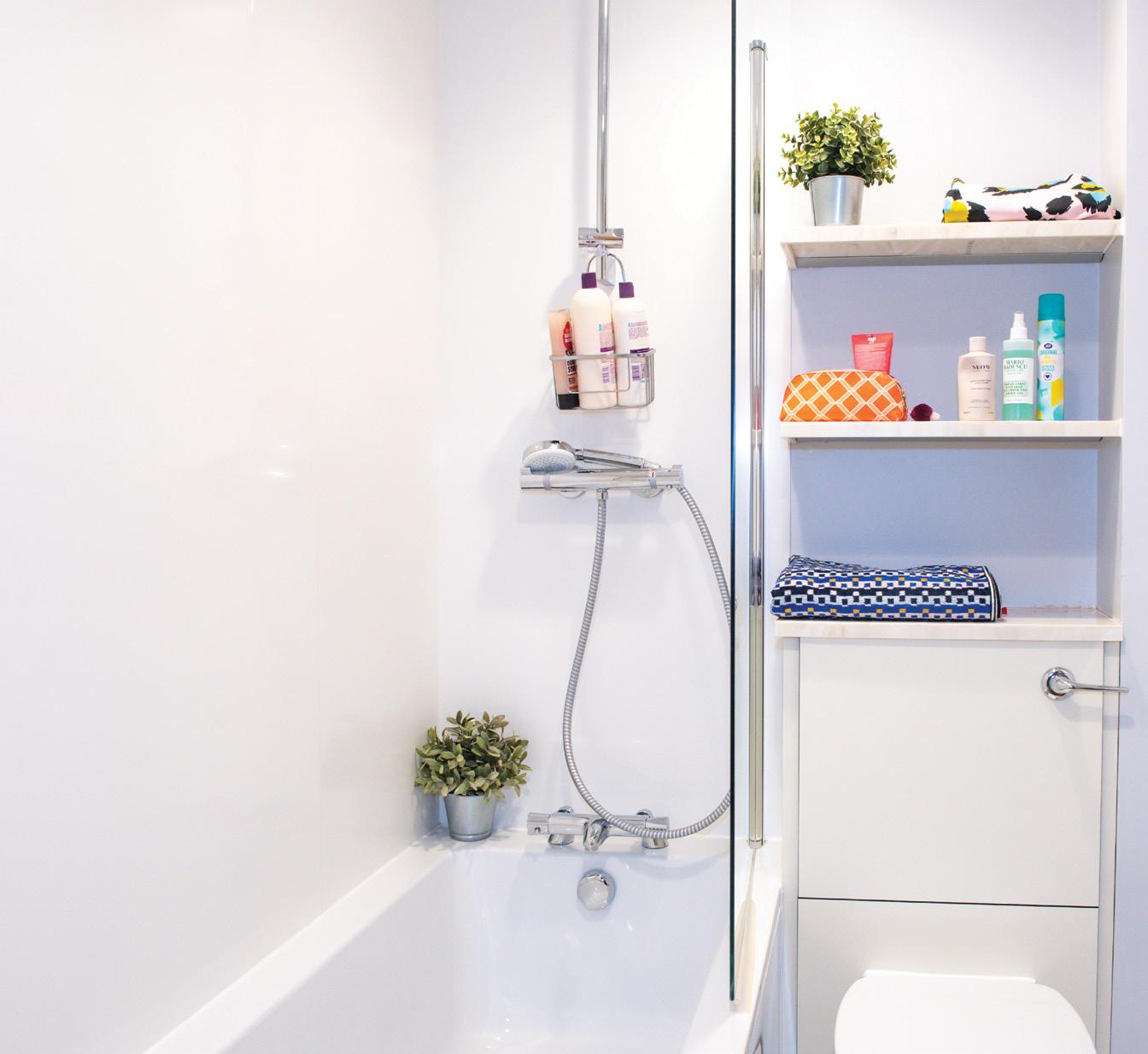
The Sixth Form boarding facilities are pretty, social and calming. It doesn’t feel like an institution, it feels homely.
19
Erica
THE CURRICULUM
WHY A LEVELS & NOT IB?
There are a number of reasons why we continue to offer A Levels at St Catherine’s, rather than International Baccalaureate, or a mixture, but chief amongst these is that they continue to be the best guide to potential. University admissions tutors have told us that they like the fact that A Level students have studied topics in depth.
The A Level structure also offers students much more flexibility and personal choice; for example, in IB you may not study all three sciences together, which many girls wish to do at St Catherine’s, and indeed do so with great distinction. We believe students about to enter the Sixth Form here are already highly qualified at GCSE across a broad range of subjects; they are more than capable of making well-informed choices, fully ready to focus on subjects which will prepare them for Higher Education and potential career choices. Girls can choose freely from 28 subjects. Additional languages such as Mandarin, Cantonese and Russian are also available by arrangement.
HOUSE STUDY/ SUBJECT ‘CLINICS’
Alongside several scheduled non-contact periods, on Tuesday - Friday, a supervised House Study period of 30 minutes allows you to begin your prep in the Speech Hall Library or your boarding bedroom, or access subject clinics. If appointed as a Subject Mentor you may also be asked to help lead in clinics and assist younger girls, consolidating your own subject knowledge and confidence as you do so. Subject Mentors particularly enjoy this opportunity to develop their higher order thinking skills and learn more through teaching.
PHYSICAL EDUCATION
The sports facilities at St Catherine’s are second to none. You will take part in Senior Games on Tuesday afternoons each week. A range of interesting activities is offered, designed to encourage you to think in terms of exercise and fitness for fun and for life. Senior Lacrosse and Netball squads also train at this time, and individual sportswomen may pursue their own choice of specialist sports off-site with permission.
CHOOSING YOUR A LEVEL SUBJECTS
There is lots of flexibility at St Catherine’s over the choice of subjects, enabling you to specialise in those you most enjoy and at which you are most successful. If you do have a specific career in your sights, then bear this in mind when you make your choices. If you do not, do not panic. You are almost certainly in the majority at this stage which is absolutely fine! We do emphasise, however, that study in the L6 year is very important and the material is all part of the linear A Level which will be taken at the end of U6. It is never too early to start finding out more about your potential A Level subjects and trying to glean as much information as you can.
If you are already a St Catherine’s student, as well as information from the respective Heads of Department, you will have a 1-2-1 chat with a senior member of staff during Year 11 who will offer you specific advice and guidance. Ask students already studying the subjects you are considering taking, as well as friends and family. Make sure, however, that the information is as up to date and accurate as possible. Focus on subjects you most enjoy and in which you are most successful or try out a completely new subject, having first used the Taster Lessons (Autumn Term of U5) to identify which of the ‘new to Sixth Form’ subjects you prefer. Trust our team of highly experienced Heads of Department, many of them experienced examiners, who have chosen the approach that best suits their students and helps them gain the right outcomes at the end of the Upper Sixth year.
The flexibility of our system enables you to choose three A Level subjects and an additional subject - a subsidiary - to enhance your experience. See p 24. This may be a subject that you want to pursue to complement your other A Level subjects and potentially have recognised in a formal qualification at the end of U6, such as an additional language qualification, or maybe a subject you have since regretted dropping for GCSE, or it could be something you want to pursue for relaxation and for fun. Your university application will be enhanced by having a broader portfolio and your school week will be even more enjoyable.
In making your subject choices, you will find a great deal of advice on hand, both if you are a current student or an applicant for a place at St Catherine’s. Just ask us.
20
SUBJECT CHOICES & IMPLICATIONS FOR UNIVERSITY COURSES
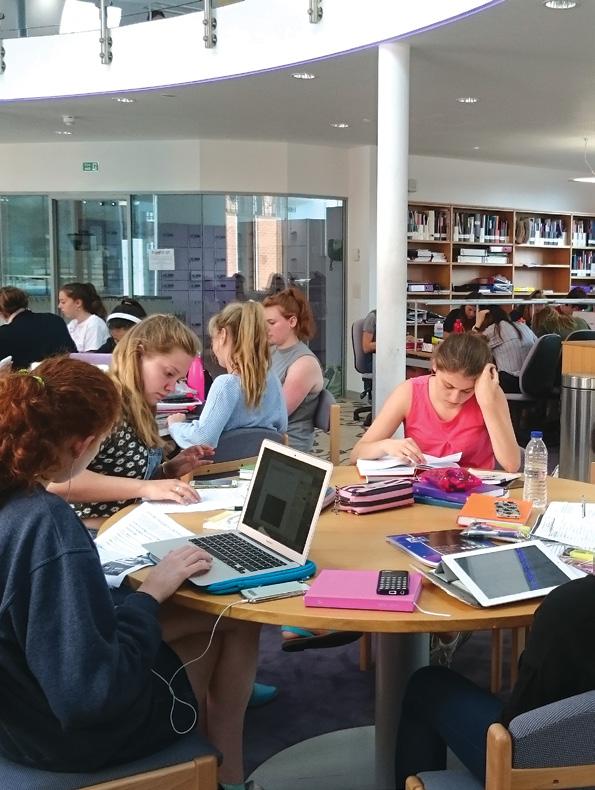
There are particular subjects which may be required or expected for entry to certain degree courses. These requirements may change as universities adjust their expectations, but at present the following guidelines should be borne in mind:
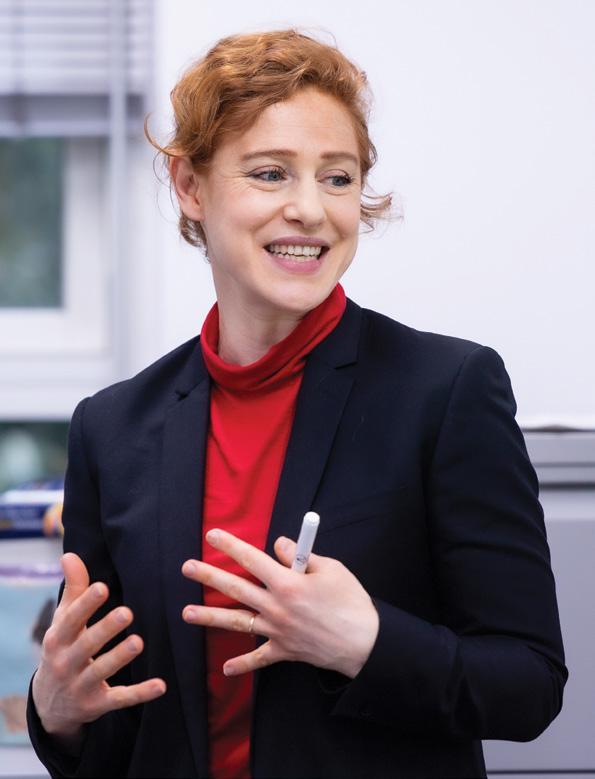
ARCHITECTURE
Some universities express a preference for A Level Design Engineering or Fine Art and all will want to see a portfolio of visual work: drawings, sketches, photography, painting, or collages. A few may ask for Maths or Science at A Level but in most cases the entry requirements these days are not subject specific.
BUSINESS STUDIES, MANAGEMENT
Mathematics helpful, but not essential.
COMPUTING
Mathematics required, and Further Mathematics is highly advantageous.
ECONOMICS, PPE (POLITICS, PHILOSOPHY AND ECONOMICS)
Mathematics is essential for Economics and Further Mathematics is highly recommended, but particularly if you have Oxbridge /Russell Group aspirations. History and Maths may be useful for PPE but university requirements should be checked as they vary considerably.
ENGINEERING
Maths and Physics, and most undergraduates at Russell Group universities will also have studied Further Maths.
FOREIGN LANGUAGES
The support that we get for our UCAS applications from the teachers is incredible.
Phoebe
Two languages (modern or classical) desirable, but many universities will allow you to start a language ab initio, that is, from scratch, in conjunction with a language that you have already studied to A Level.
LAW
Any A Levels, but ideally including one essay based subject e.g. English, History, PRE (Philosophy, Religion and Ethics).
MEDICINE, DENTISTRY, VETERINARY SCIENCE, PHARMACY
Chemistry is almost always required and Biology is strongly advised. If you are considering putting Cambridge as one of your choices for Medicine or VetMed, Maths is the preferred 3rd A Level, however, most courses will not state a preferred third A Level although Psychology has been a popular - and logical - choice for Medical applicants.
NATURAL SCIENCES
Mathematics plus at least two of the three sciences advised.
PSYCHOLOGY
A science required for a BSc course, (which can be Psychology) but entry via arts subjects for BA courses is possible. Two sciences/Maths recommended for Oxbridge.
21
CHOOSING YOUR A LEVEL SUBJECTS
If you are already a St Catherine’s student
Study this booklet carefully to find out what St Catherine’s offers you in the next stage of your education. Read through the subject pages and draw up a shortlist.
Talk to as many people as possible to get more advice, views and guidance, especially Heads of Department, subject mentors and your School Housemistress/Housemaster.
Come to the Sixth Form Open Evening in September. Ask questions and keep an open mind!
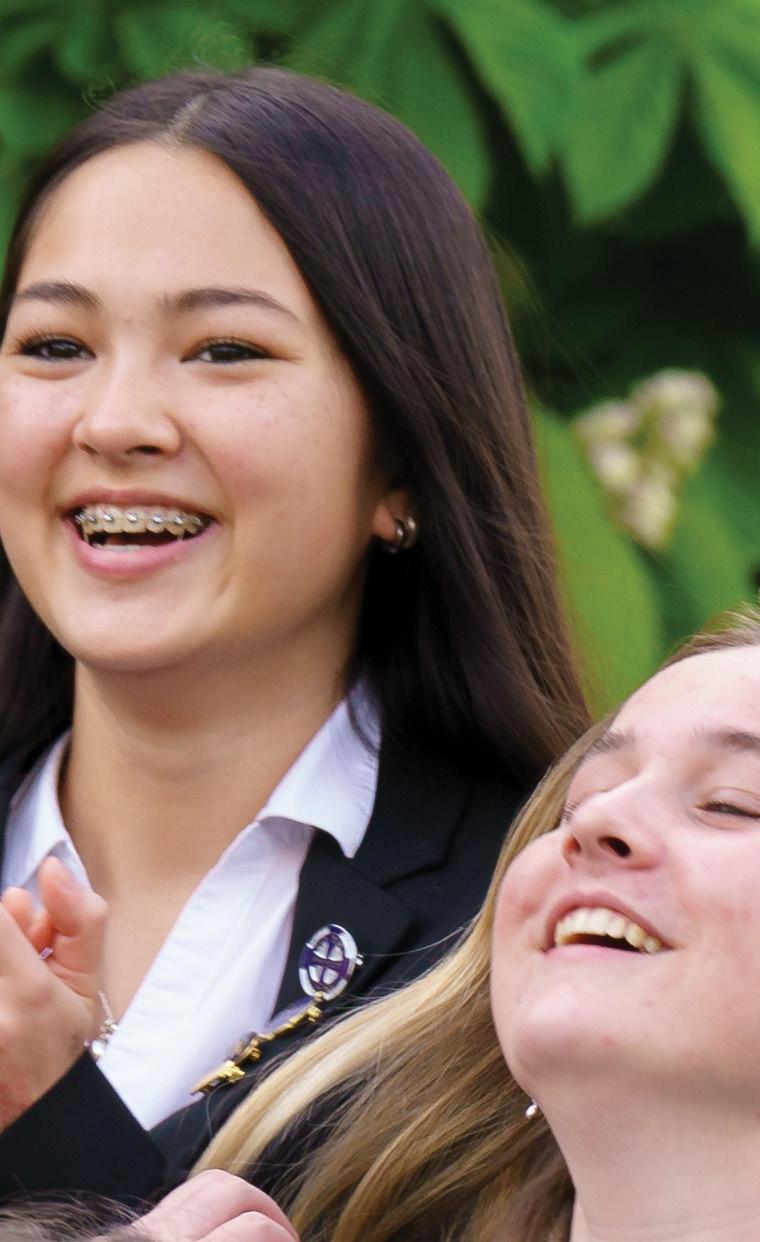
Choose the subjects you would like to explore further during the Sixth Form Taster Day. Use this opportunity to try some new subjects. Why not try taster boarding too?
You will be invited for a series of meetings with your individual A Level Options Mentor to receive support and advice about your subject choices every step of the way. Come to each meeting prepared to talk about YOU. It’s your future!
Assess all the information and then submit your final option choices in February after mock exams.
Concentrate on your GCSEs and IGCSEs, enjoy your summer and wait for excellent results!
St Catherine’s Sixth Form starts here!
22
If you are considering joining St Catherine’s
Study this booklet carefully to find out what St Catherine’s offers you in the next stage of your education. Read through the subject pages and draw up a shortlist.
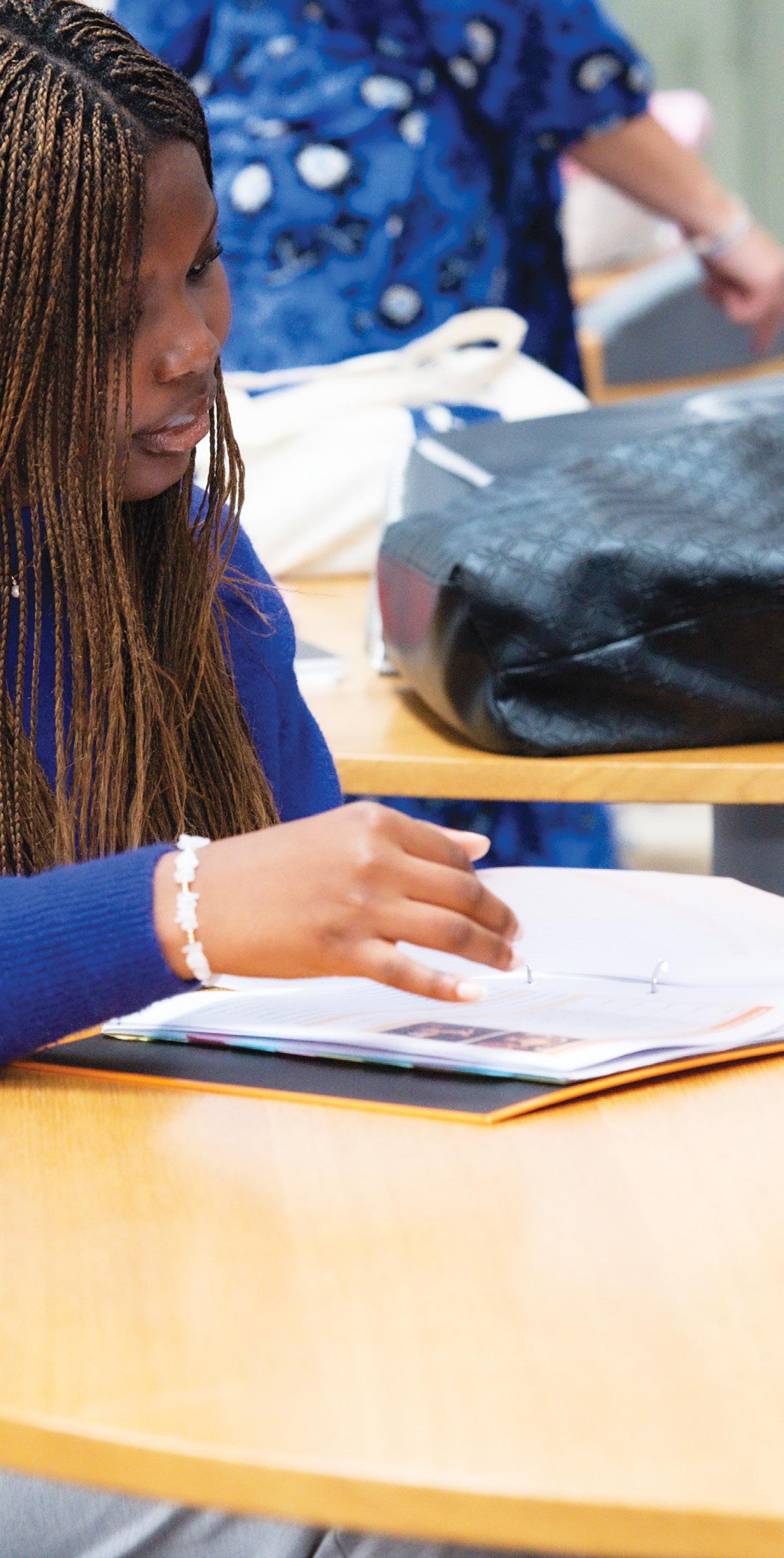
Talk to as many people as possible to get more advice, views and guidance, especially Heads of Department and subject teachers in your current school or here.
Come to the Sixth Form Open Evening in September, look around, ask questions and keep an open mind! If you are unable to attend in person then you will be able to view the talks online.
Register as an applicant.
You are invited to sit the Entrance Examination. You can arrange to sit the papers at a British Council centre or other approved centre.
All overseas applicants who are successful in the Entrance Examinations will have a Zoom interview with the Director of Studies or the Head of Sixth Form and a Head of Department of a subject you wish to study.
Successful applicants will be notified by the end of the Autumn Term.
Assess all the information and then confirm your final option choices when prompted by the School.
Concentrate on your GCSEs and IGCSEs, enjoy your summer and wait for excellent results!
St Catherine’s Sixth Form starts here!
23
ENHANCING YOUR EXPERIENCE
Subsidiary subjects give your Sixth Form experience more substance. Alongside your chosen three A Levels, you will select a course to study between September of L6 and December of U6 for two hours a week with self-directed additional study, depending on the course you choose. Your chosen subsidiary will either: Complement your A Levels and enhance your UCAS application or CV or Continue a creative art or skill that you love, developing your creativity or finding a mindfulness moment in your busy week.
The possible Subsidiary subjects are listed below. The final list is published in Summer 2024 when all requests have been considered.
DESIGN ENGINEERING
Thinking STEM or Engineering at Uni? Want to know how a car works?
Be part of a hands-on team tasked with the technical build of a track car for track and road. You will look at materials, mechanics, suspension geometry, engine and gearbox technology.
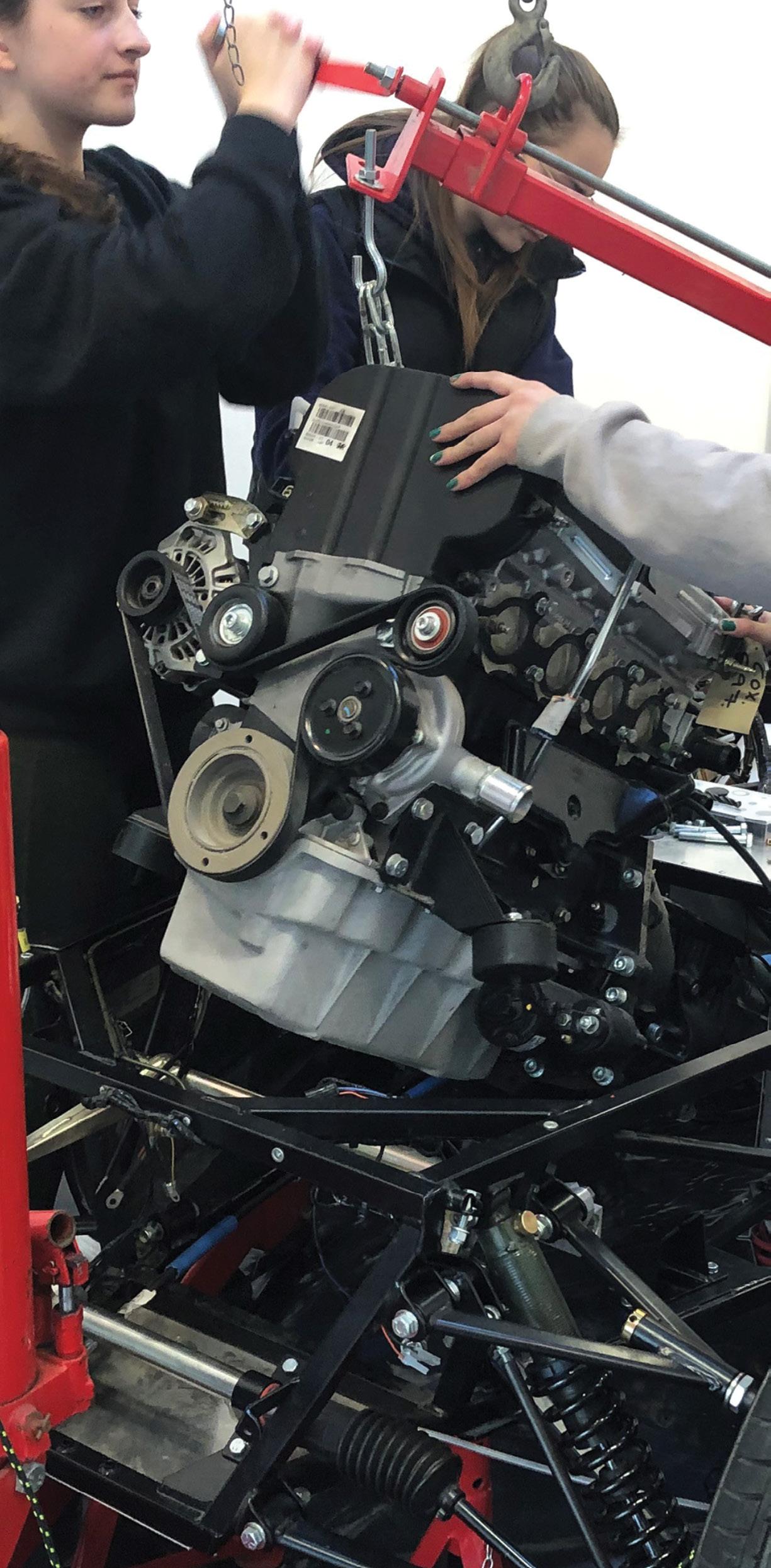
PSYCHOLOGY
Interested in business, marketing, HR or professional psychology?
Explore how we think and learn, what drives criminal behaviour, how children’s brains develop and the qualitative and quantitative research methods that analyse behaviour. Option to take Psychology GCSE.
CLASSICS – CLASSICAL CONTEXTS
Want to explore the many ways the ancient world has shaped our own?
A wide-ranging course looking at the vast, often surprising and sometimes controversial legacy of ancient Greece and Rome in art, literature, politics, and thought. No Latin or Greek required! Complements English, History, Latin/Greek or Fine Art A Levels.
FRENCH BEYOND GCSE
Want to build on your GCSE French and become a more confident French speaker? Want to be able to use your French for travel, fun, living and working abroad?
A fun, new and innovative course to encourage you to use your language skills for career enhancement and as a life skill. Option to work towards a DELF (Diplôme d’études en Langue Française) qualification or a Professional Diploma.
24
GERMAN BEYOND GCSE
Want to build on your GCSE German and become a more confident German speaker for travel, fun, living and working abroad? This course is designed to improve your vocabulary and communication skills to give you an advantage in future studies or in the global market with the option to work towards CEFR (Common European Framework of Reference for Languages) levels.

ITALIAN FOR BEGINNERS
Want to live ‘la bella vita’ in Italy or considering working in Italy? A conversational course so you can speak with confidence about free time, home life, holidays, family and friends, technology and more.
TEXTILES
Want to pursue a career in Arts, Theatre or Design, or just have fun?

Research textile artists and designers, study historical and contemporary genres and create your own garment. You will learn dyeing, printing, embroidery and constructed textile techniques.

CREATIVE ARTS
Do you want to explore the mindful aspects of creativity and learn how to develop a creative project from initial idea to realisation?
Develop skills in Photography, Art and History of Art. Start with a foundation course of techniques, taking you back to basics. You will be taught how to develop your ideas. You work towards a final exhibition in the Autumn Term of the U6.
CULINARY ARTS – STREET FOOD
A fun course, with many delicious dishes you will want to make again and again.
Learn how to make delicious Street Food dishes incorporating various culinary influences and inspirations.
MUSIC
Can’t live without music? Interested in all forms of music from film scores to jazz?
Analyse music from an array of genres, including vocal, jazz, popular and contemporary and hone your taste and develop your aural and composition skills.
SCOPE
- readying you for life beyond School
There’s more to a Sixth Form education than A Levels; that is why we run SCOPE – the St Catherine’s Ongoing Programme of Enrichment. For one hour a week you will enjoy hearing visiting lecturers and specialist speakers on a range of subjects designed to help you approach the challenges of adult life. Topics have included:
• Personal Safety
• Student Finance

• Current Affairs
• Safe Driving
• Healthy Relationships, sexual consent, safe sex
• Interview techniques
• Self-defence
• Mental Health
• Work experience opportunities
• Digital Skills
• Alcohol and Drug Awareness
• Resilience for Life
• Budgeting
• Support services at Universities
• Staying well at University
• First Aid
• Cookery skills
• Transition to University study
25
UNIVERSITY CHOICES
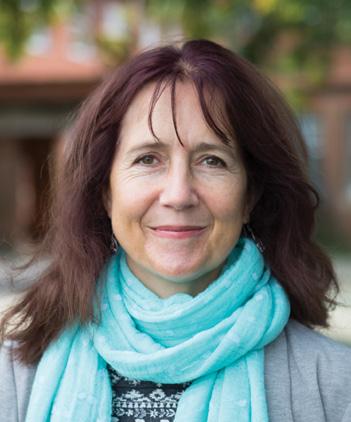
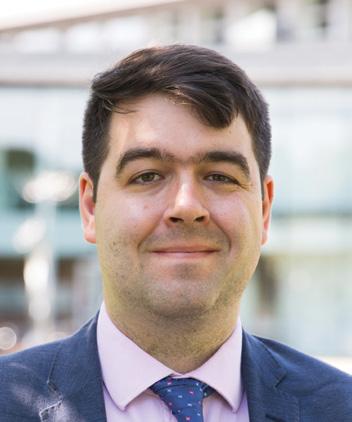
With over 65,000 courses to choose from in the UK alone, not to mention the numerous specialist colleges or conservatoires for Art, Drama and Music, and the increasing number of enticing Degree Apprenticeships, the process of researching and choosing a degree course can feel overwhelming. Careful preparation is needed, and our experienced careers and tutor team are there to guide girls through the process, outlined on the next page, supporting you at every stage. in 2023 96% of our applicants gained places at their first or insurance choices. Please see p.43.
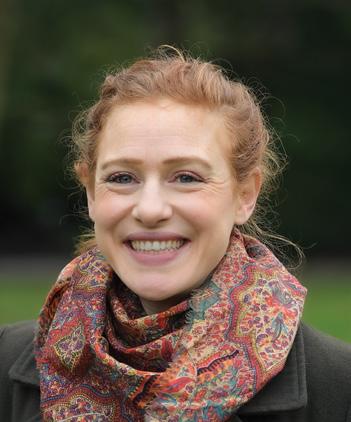
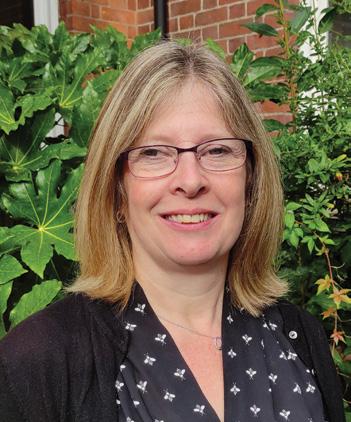
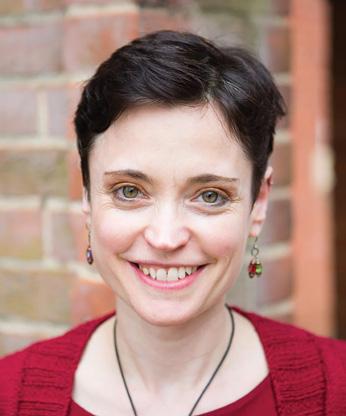
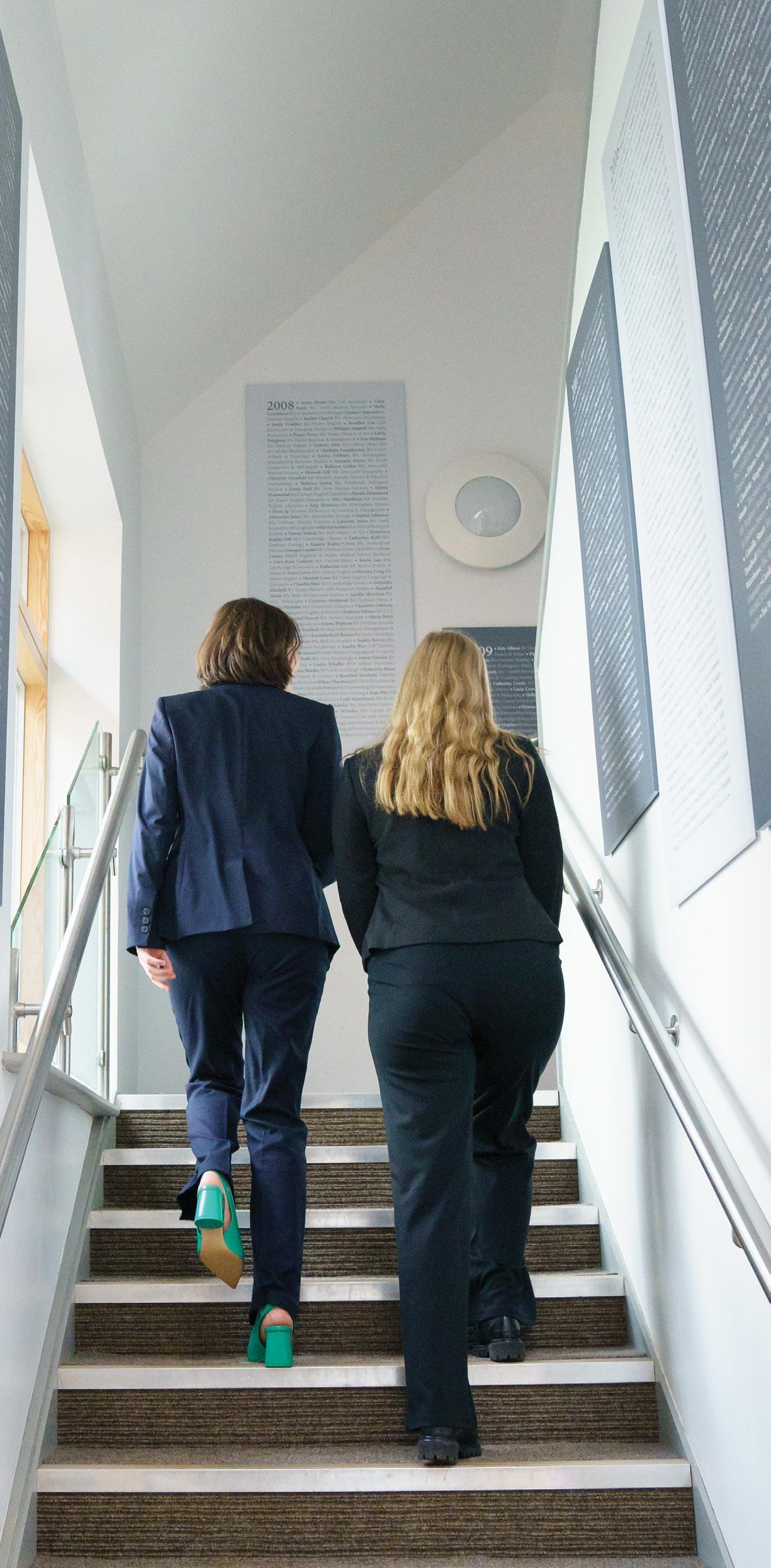
Your team includes:
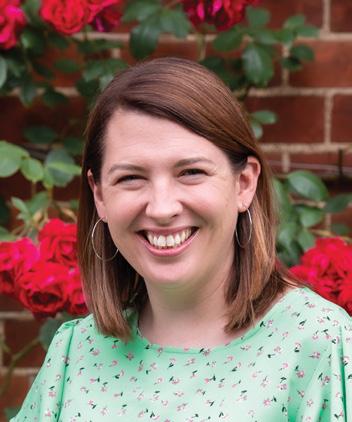 Kate Hawtin Head of Sixth Form Oxbridge Coordinators Oxbridge Visits
Catherine Taylor Head of Careers
Elodie Nevin Director of Studies
Catherine Peel (Arts & Humanities)
Claerwen Patterson (Sciences) Dr Guy Brindley
Kate Hawtin Head of Sixth Form Oxbridge Coordinators Oxbridge Visits
Catherine Taylor Head of Careers
Elodie Nevin Director of Studies
Catherine Peel (Arts & Humanities)
Claerwen Patterson (Sciences) Dr Guy Brindley
26
THE UCAS PROCESS
SPRING OF L6
FUTURE PATHWAYS WEBINAR
FOR PARENTS
• An overview of higher education
• Considering non-university options, gap years, overseas applications
• Degree Apprenticeships
HOW TO CHOOSE A UNIVERSITY
Delivered by the University of Surrey. Exploring league tables, financial support, facilities, study abroad options, distance from home, graduate employability.
UNIVERSITY RESEARCH
How to research courses session, with introduction to online investigative tools that are widely available to help you explore courses such as the UCAS website and BridgeU

1:1 CONSULTATIONS
Available with Senior Sixth Form staff plus regular meetings with your Sixth Form tutor
SUMMER OF L6
UNIVERSITY VISITS
UCAS GRADES GIVEN TO GIRLS
BEGIN YOUR UCAS LOG
Recording progress
HOW TO WRITE YOUR PERSONAL STATEMENT
Delivered by a University Admissions Tutor
PERSONAL STATEMENT WORKSHOPS
To develop first drafts
AUTUMN
OF U6
UCAS EVENING
Individual appointments for parents and girls with your daughter’s tutor, confirmation of choices, challenge and check
1:1 UCAS SUPPORT with Senior Sixth Form staff
SUPPORT IN FINALISING PERSONAL STATEMENTS’
UCAS APPLICATION REVIEW
OCTOBER
UCAS FORMS & PERSONAL STATEMENTS SUBMITTED
INTERVIEW PREPARATION AND PRACTICE (as needed)
SUMMER OF U6
STUDYING ABROAD
JUNE
UCAS DECISIONS REQUIRED
GAP YEAR INFORMATION
AUGUST EXAM RESULTS
• Confirm acceptance or enter clearing
• Post results guidance (as needed)
–
27
OVERSEAS ADMISSIONS
The Sixth Form Tutor Team has experience of supporting girls in applications to the US, Canada, Hong Kong, Australia and Europe, for example Biological Sciences at Harvard, Political Sciences at the University of Toronto and Media and Communications at the University of Sydney. For the US we advise on SATs and personal essays, entry requirements, funding and visas and support girls fully with the administrative side of the process, which can be complex.
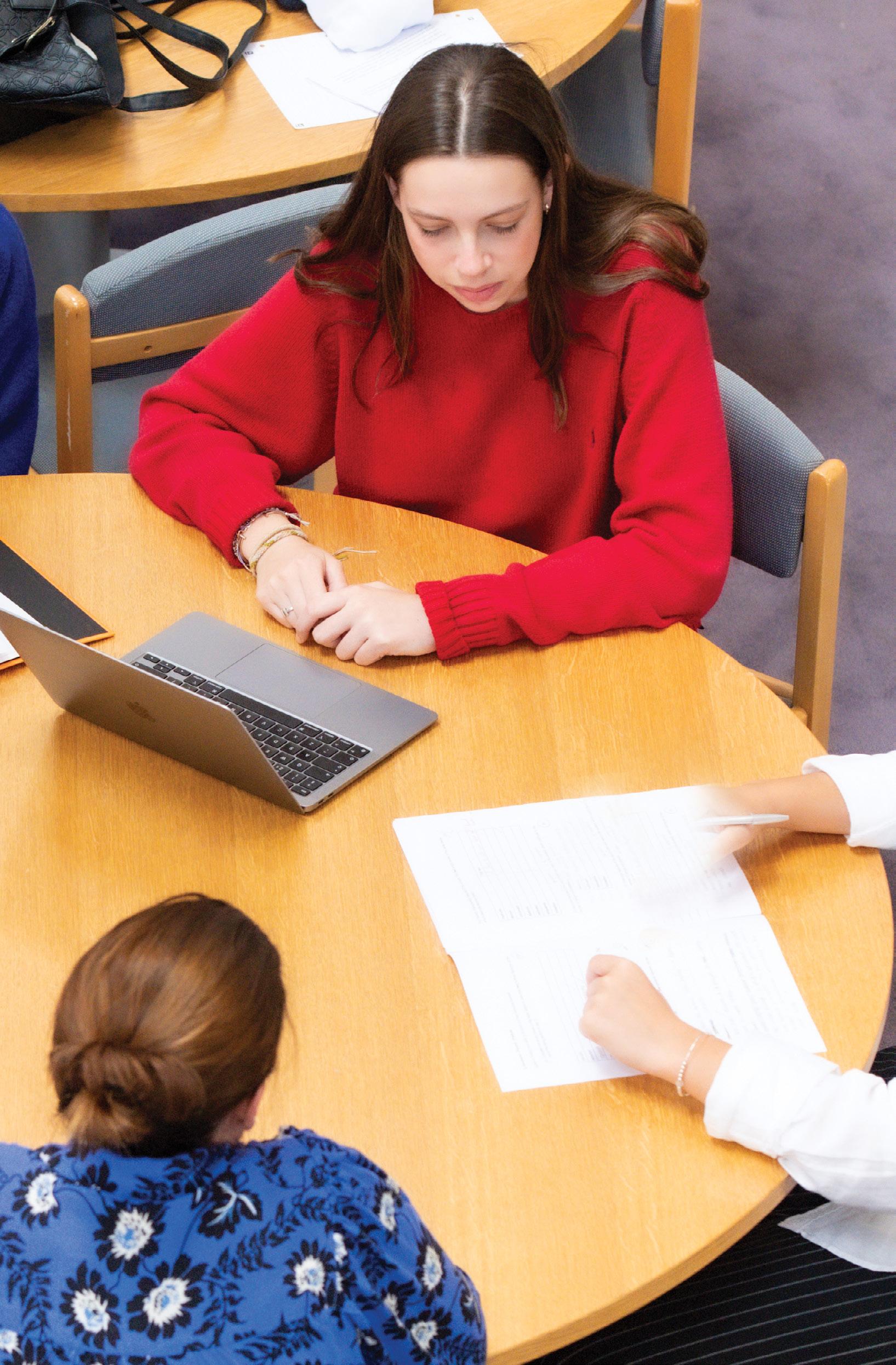
POST QUALIFICATION APPLICATION AND SUPPORT
For those girls who have chosen to have a Gap year we will provide the same level of support to them on the application process but with known
OXBRIDGE APPLICATIONS AND MEDICINE, VETERINARY MEDICINE, DENTISTRY OR LAW
Girls considering Oxbridge and specialist subjects need to demonstrate interest in the ‘super-curriculum’, research that will need to be undertaken independently for example through attendance at local or virtual evening lectures, participation in external essay competitions and their own focused, independent reading. We run an Oxbridge Day in Activities week and applicants will have an Oxbridge Mentor to help prepare them for interviews, review their academic work, develop their knowledge and source work experience. For Medics there is a Medical Reading Club and MedSoc. We are adept at managing the need to meet earlier application deadlines and support girls with Admissions Tests such as UCAT, BMAT or TSA, as well as helping them to make appropriate choices of medical school.
For organ scholarship applications, the Head of Organ Studies and Director of Music provide guidance with preparation for auditions and the very early application process demanded.
28
ART, DRAMA, MUSIC
Recent alumnae have chosen to continue their studies at Central Saint Martins, LAMDA, the Guildhall School of Music and Drama, the Royal Academy of Music and Trinity Laban. Our team can guide you through preparing portfolios, mock interviews, auditions, repertoire and more.
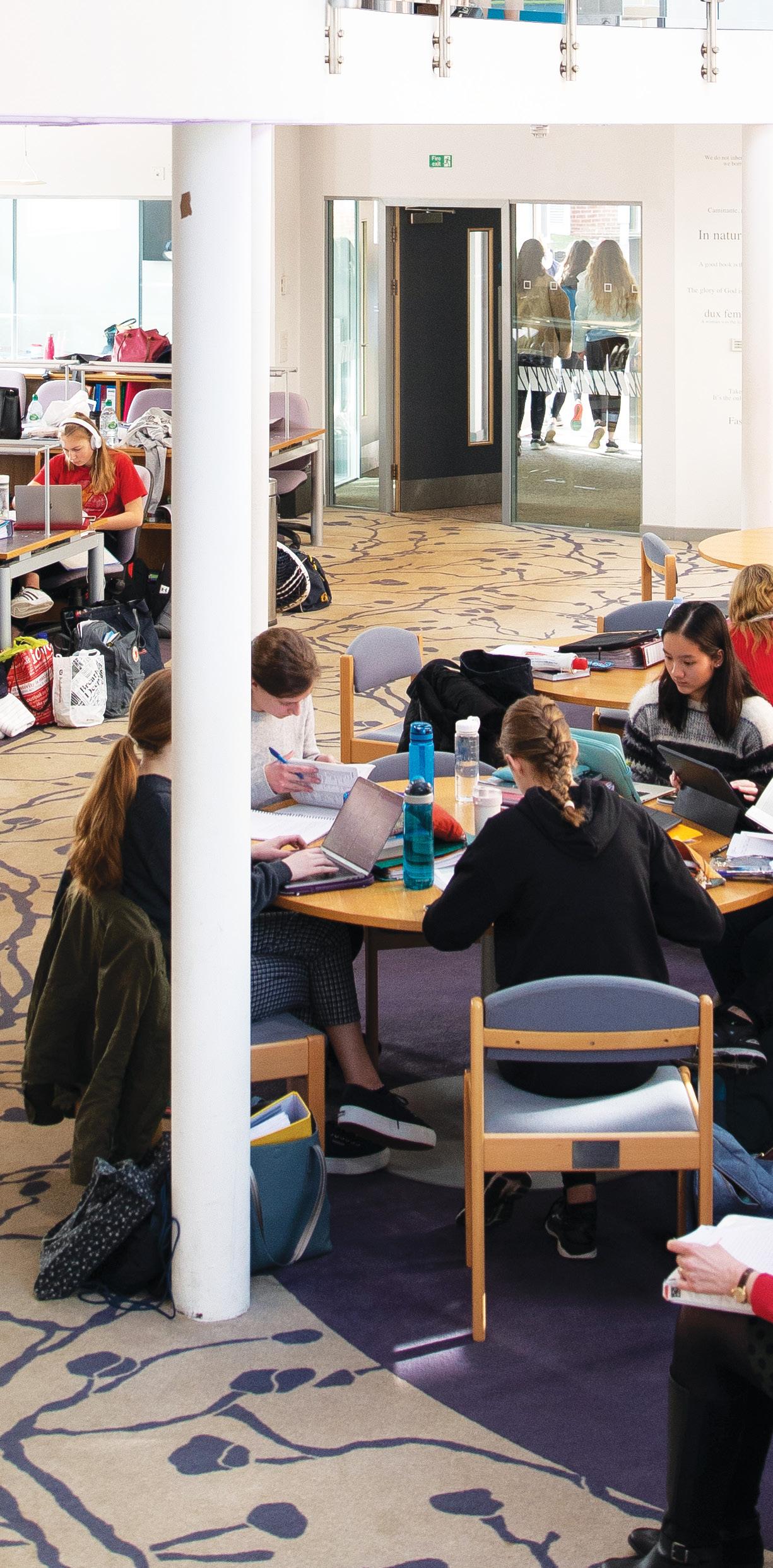
DEGREE APPRENTICESHIPS
Lasting for 4 or 5 years a degree apprenticeship allows you to study for a degree while working. You gain work experience, earn a salary and can graduate debt-free, giving a different ‘University’ experience. We will help you consider this route with the ever increasing number of highly reputable companies offering this option, including Dentons LLP, Dyson, IBM, PWC, Unilever and the Bank of England. Alumna Ellie Speight (Year of 2018) has been a visiting speaker on her Business Degree Apprenticeship with Ernst & Young (EY).
Ellie Speight (2018), shared her experience of a Business Degree Apprenticeship with EY.
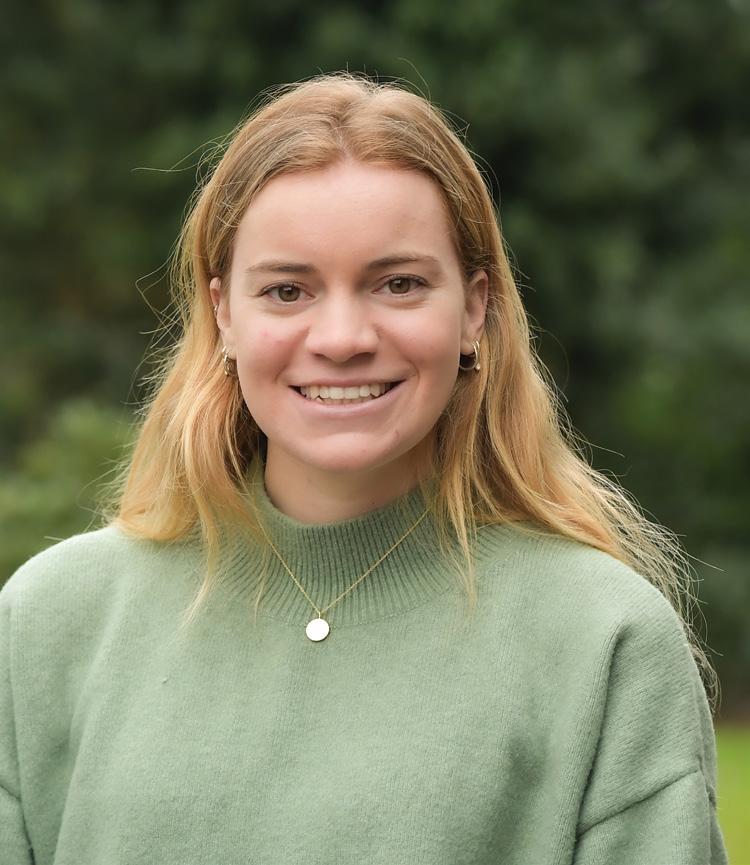
29
CAREERS IDEAS
Future careers are impossible to anticipate precisely therefore we equip girls to develop the personal attributes and skills which will enable them to embrace new possibilities as they emerge.
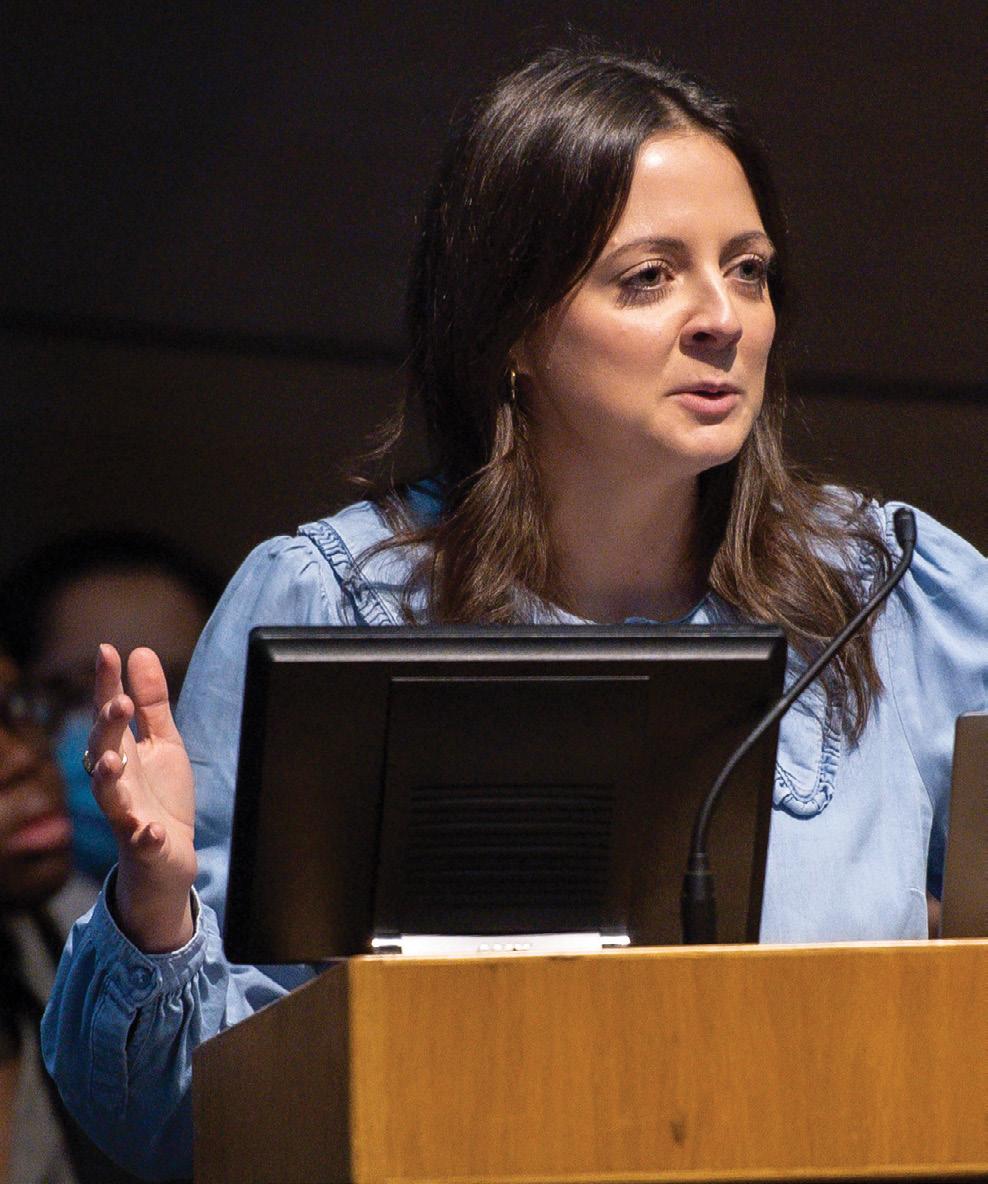
The whole St Catherine’s experience contributes to the ‘employability’ of girls, recognising what employers are looking for: teamwork, leadership skills, creative thinking, adaptability, communication skills, decision making, commitment, time management and problem-solving. These invaluable attributes are developed through the girls’ Prefect roles, the creation of their Sixth Form Musical and their coaching of younger girls in sports and academics. With these strengths, our girls leave School and higher education or training able to learn and adapt to the latest trends and technical developments within their chosen sector and workplace.
Our comprehensive careers education programme is designed to equip girls to take ownership of their own decision making regarding future pathways and careers. Girls develop self-awareness and the skills to research areas of personal interest, culminating in aspirational and exciting choices.
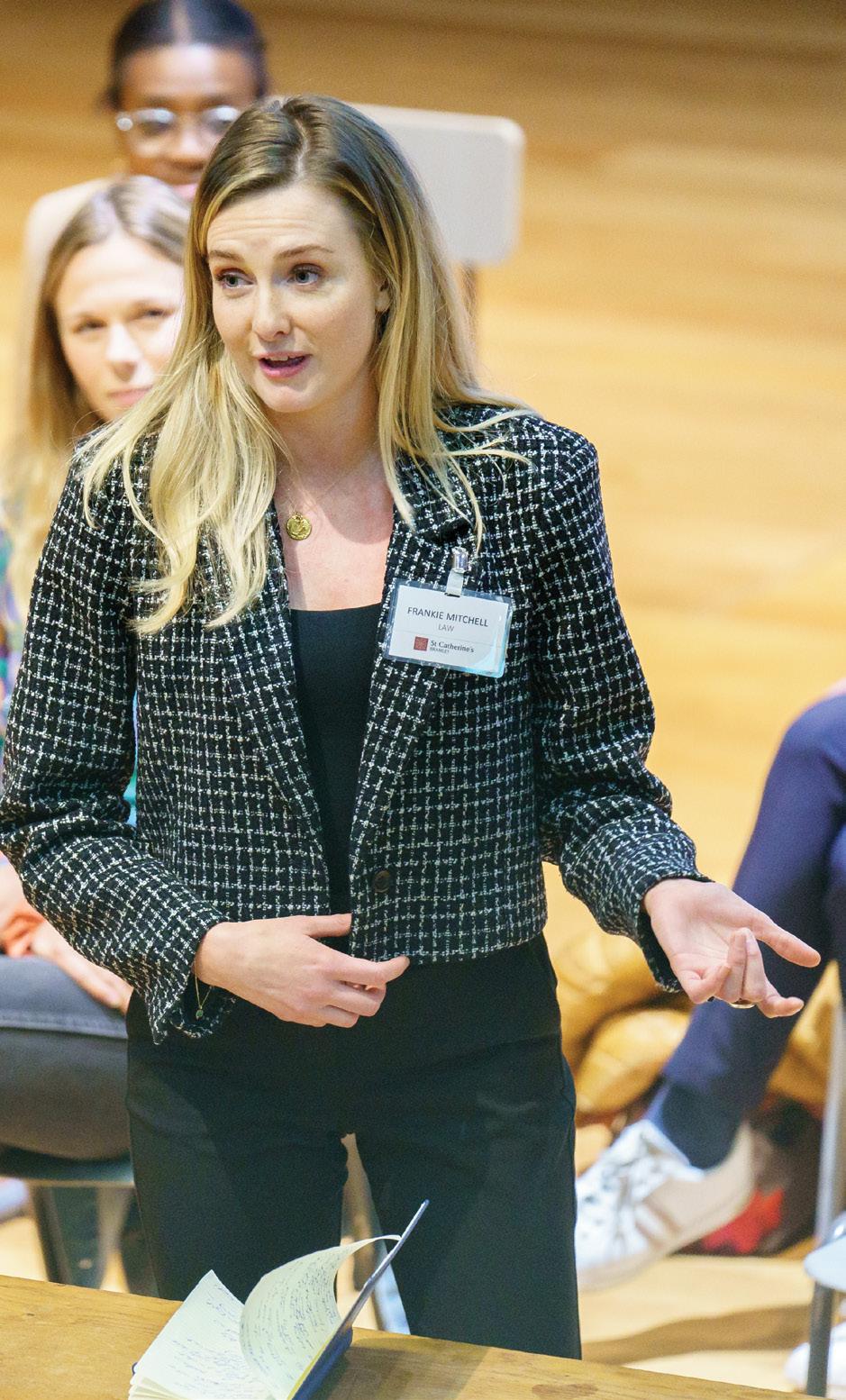
Sixth Form girls are invited to attend a variety of careers events at School as well as external events. The breadth of careers support is enhanced by active involvement of members of the St Catherine’s Association Community.
On the next page are some of our most recent careers events and resources to illustrate the access you will have to ideas, inspiration, knowledge and networks to support you as you plan your future.
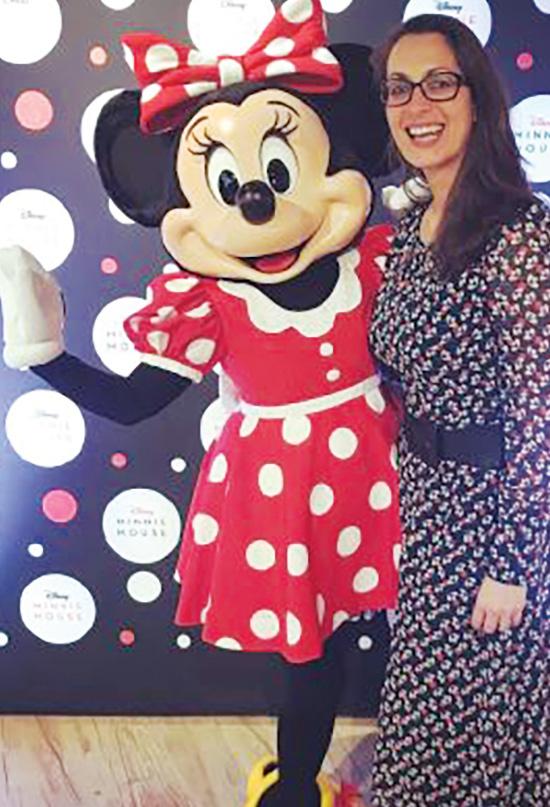 Frankie Mitchell (2010), Barrister, Wilberforce Chambers, discussing careers in law at the Careers Forum
Anna Gibbs (1997), Publicity Director (UK & EMEA) for Disney Studios/ Disney+
Frankie Mitchell (2010), Barrister, Wilberforce Chambers, discussing careers in law at the Careers Forum
Anna Gibbs (1997), Publicity Director (UK & EMEA) for Disney Studios/ Disney+
30
Lucy Johnstone (2006) Head of Entertainment and Partner Marketing for Sky
BIENNIAL CAREERS FORUM
Our Forum gives girls the opportunity to network with alumnae and parents from a wide variety of career sectors. These have included a Cloud Specialist at Microsoft, a Finance Manager at the Ellen MacArthur Foundation, a Global Media Manager at Burberry, an ENT Specialist at Guys & St Thomas’s NHS Trust, among other notable speakers. Girls can hear our visitors’ career experiences and they provide valuable advice to enable girls to appreciate better the challenges and rewards of a wide variety of career paths.
SPECIALIST SECTOR TALKS
These are organised for you, featuring alumnae, such as ‘Careers in the World of Theatre’, with:
• Caroline Lowe (2013)
Stage Manager at The Arts Theatre, London
• Georgia Figgis (2013)
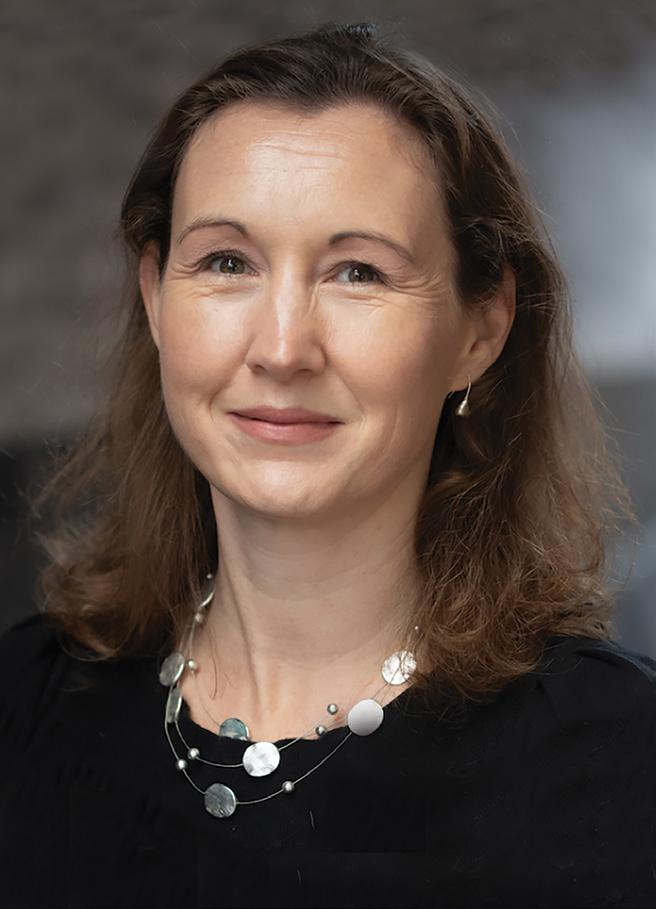
Actor, Director & Writer
• Rosie Townshend (2009)
Senior Producer at the National Youth Theatre
• Anna Lewis (2008)
Award winning Set & Costume Designer
• Clemmie Reynolds (2006)
Associate Director at Shakespeare’s Globe Theatre
GOLDMAN SACHS PRE-UNIVERSITY WOMEN’S EVENT
London based event where the girls explored investment banking careers and are involved in an interactive workshop, put their negotiation skills to the test on the trading floor and share their views on ‘breaking the bias’ in the finance industry.

FOUNDERS FORUM
As part of the SCOPE programme we have previously had Founders Forum CEO Carolyn Dawson share with girls what employers are looking for and how to correlate your School experience - be it in leadership, teamwork, Sports or Debating - to skill sets you have learnt that you can bring to an employer. Strategic career planning was covered - from building a professional digital profile to finding and using mentors, creating networks and securing training.
CAREERS BLOG
Girls are emailed with details of relevant careers events, lectures, competitions, work experience and apprenticeship opportunities. This information is also published on the Careers Blog for all parents and girls to access. Items recently included:
• Weekend Workshops for Digital & Tech
• One Day Courses for Medicine & Midwifery
• Virtual Medical Society
• Careers in Law
• Lower Sixth STEM virtual summer work experience
• Jaguar Land Rover Digital and Engineering Degree Apprenticeships
• FT Political Essay Competition: ‘How to make parliament representative’
• Royal Economic Society Competition: ‘Young Economist of the Year’ Essay
• The prestigious Dukes Essay Competition
• Royal Geographical Society Essay Competition
• Law Mentor ‘Getting into Law’ Conference
• Gap Year 360 guidance video
31
All of the women were so inspirational and very informative whilst also being very entertaining and fun. They were candid about the ups and downs of their jobs and answered all questions very honestly.
Alice
YOUR ST CATHERINE’S ASSOCIATION COMMUNITY
By joining St Catherine’s you will benefit from the St Catherine’s Association Community of over 8,500 members, a community committed to supporting each other in the world of work. The community is active, with alumnae and parents helping current girls to research Universities, explore career opportunities, secure internships or find work experience and refine their networking skills.
A NETWORK THAT WORKS FOR YOU!
During your Sixth Form years, you can expect to hear talks from several alumnae sharing their career pathways with the opportunity to ask questions of them. You will be able to ask advice on work experience, the skill sets they found beneficial in their careers, global opportunities etc.
Recent talks have included alumnae now working as a Zoologist at the BBC, Corporate Solicitor at Linklaters, a PHD student at UCL researching cancer drugs, an HSBC Asset Manager, a Miro Gallery Curator and an Alexander McQueen embroiderer. The breadth and depth of our Association Community is an incredible asset at your fingertips and will be with you for life when you leave School.
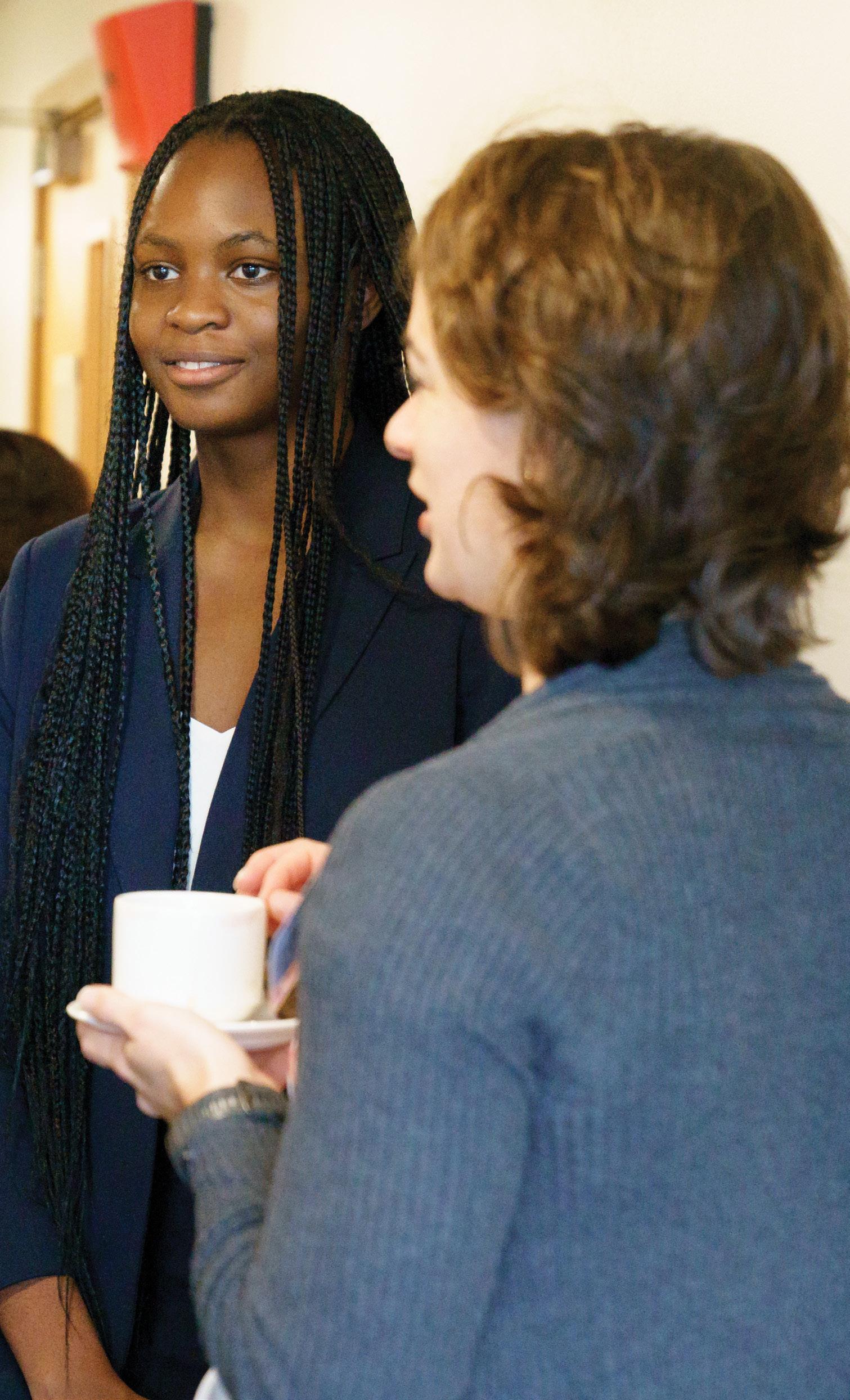
32
Your Association Community can help you with:
UNIVERSITY PREPARATION
Most girls in The 6 take advantage of our ‘UniBuddies’ scheme. We connect girls with alumnae currently at university so you can ask questions about colleges, halls, courses and university life. This can really help you with making your UCAS application eg. Grace was interested in studying Geography at Exeter and we linked her with Sophie (2018) who gave her a personal tour. Bella wanted to know about Dentistry so we linked her to Dr Anjuli (2011) who is a qualified BUPA Dentist and a specialist in Sports Dentistry.
ONE-TO-ONE PARENT & ALUMNAE CONTACT IN CAREER SPECIFIC AREAS
Practical and helpful! For example, Emma was interested in a career in film and we connected her to four alumnae so she could research options, while Isabella was interested in a career in the Civil Service so we linked her to Flora (2014) a Policy Advisor at HM Treasury to discuss the Fast Track graduate scheme.
NETWORKING SKILLS
We run a special group called the London Network for alumnae aged 25-35 and Sixth Form girls can apply to attend these events. The purpose of the London Network is to broaden career options and aspirations by allowing parents and alumnae to network and share industry experience. Sixth Form attendees have the chance to grow in self-confidence and make links for future benefit amongst the parents and alumnae that attend. Upcoming London Network events include:
• How to network
• Resilience in the workplace
• Working life after maternity leave
• Starting your own business
• Managing dual careers
This Network is there for you during the Sixth Form but also throughout your early career and life.
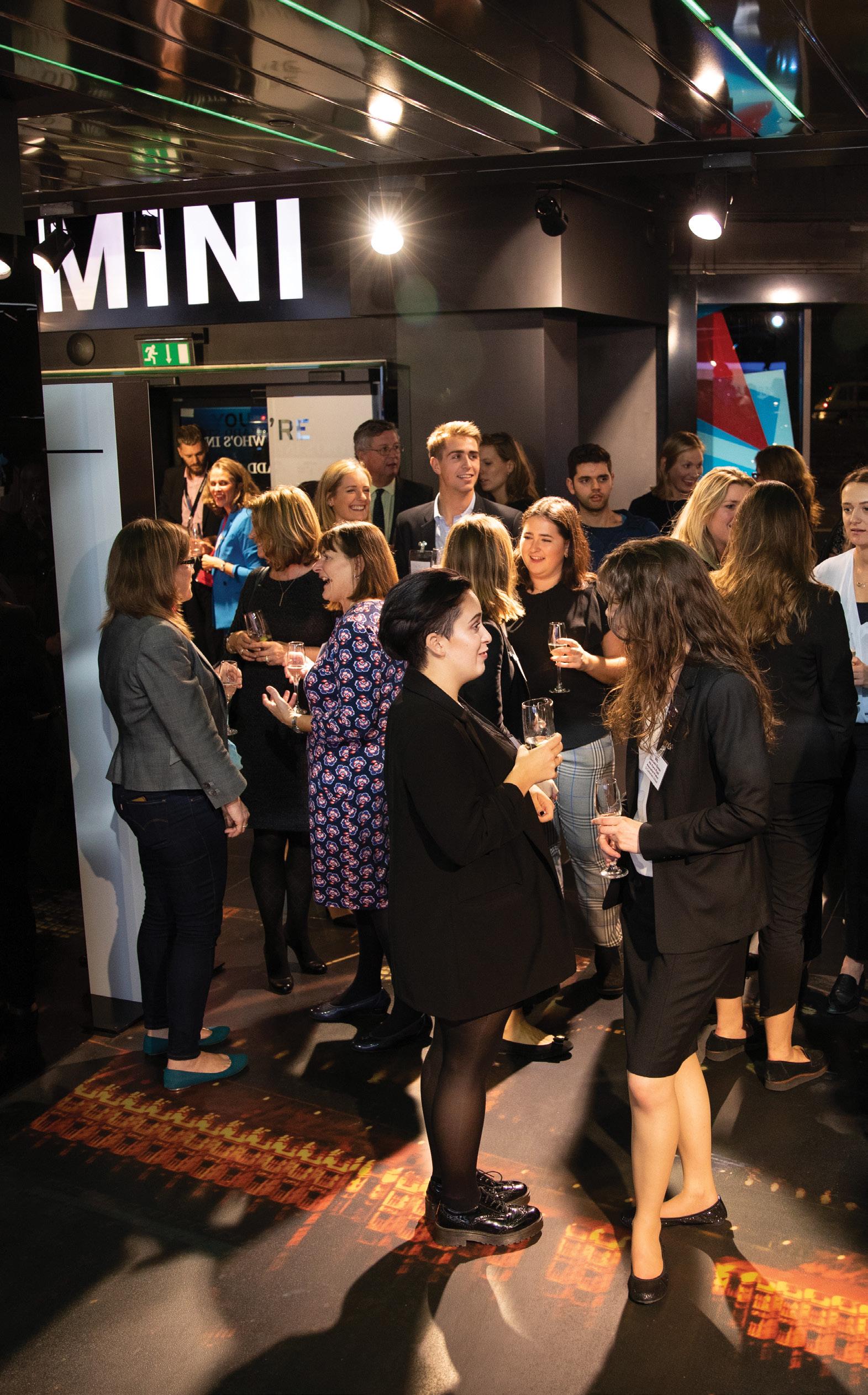
The breadth and depth of our Association Community is an incredible asset at your fingertips.
Current parent
33
THE BENEFITS OF AN ALL-GIRLS SIXTH FORM EXPERIENCE
The world may be mixed gender but is a long way from being gender-equal. An all-girls environment gives girls the freedom in school to define themselves, free from societal stereotypes, expectations and pressures. This ‘world as it should be’ instils self-belief, confidence and purpose within each girl. Our girls expect to be respected and to be heard. And they are, in School and then in life.
Proven benefits of an all-girls education include:
• Stronger academic performance – resulting from girls feeling more confident in the classroom to be more assertive, take risks and ask questions. Achievement is lauded and ability celebrated.
• Increased confidence and self-belief – girls are able to focus on themselves and their potential, free from the constraints of societal or cultural norms. They are encouraged to understand their strengths and be proud of their achievements as their self-esteem is nurtured and reinforced by their academic results.
• Tailored teaching – girls work more collaboratively, thrive in discussion-led learning environments and as such we can make group debate, team-work and co-operation integral to the teaching and enhance girls’ learning.
• Freedom from gender stereotypes – girls make their subject choices based on their interests, bucking the national trend with 67% studying STEM subjects.
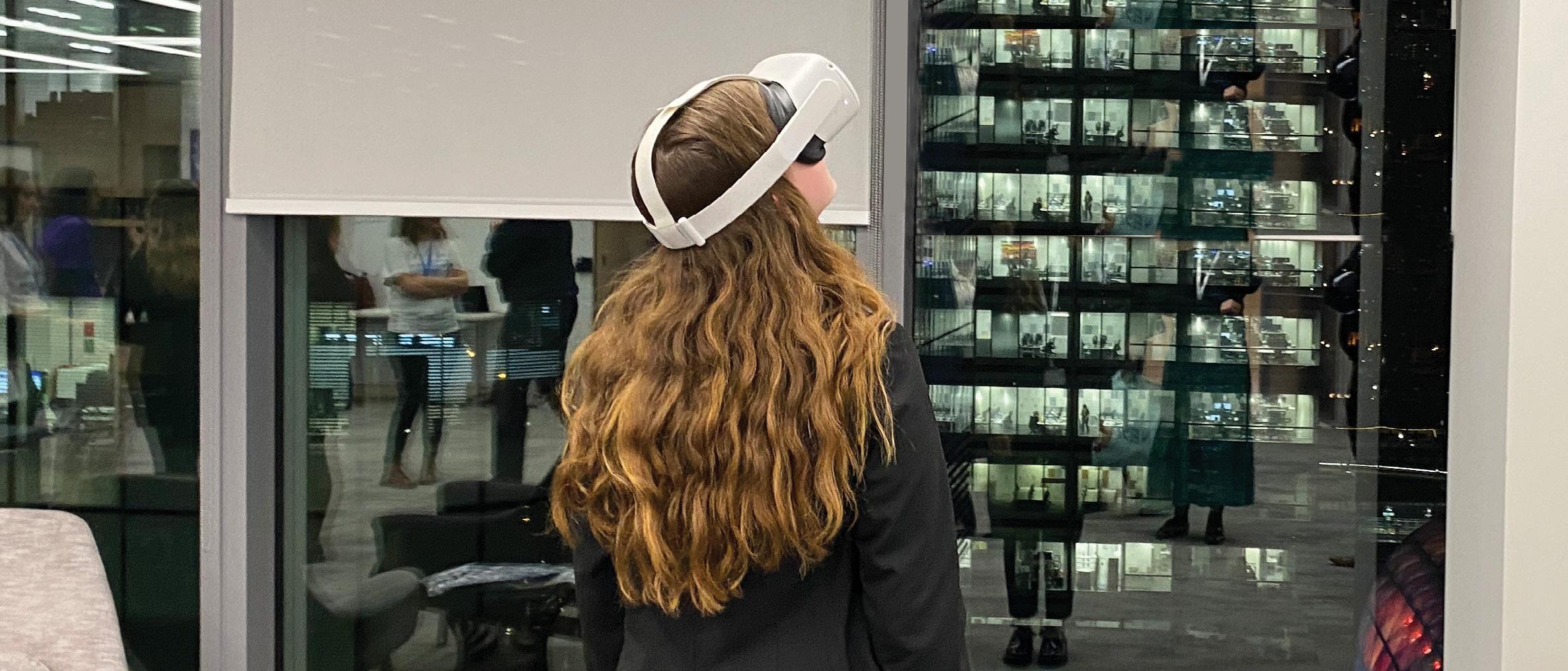
• Opportunities for leadership – all our girls are given leadership positions, learn to assert themselves and to value the quality of their insights and opinions. They are the catalyst for change, modelling a more equitable world.
• Inspirational role-models – alumnae across all sectors generously share their time, providing insights and encouragement as the girls consider their own academic and professional aspirations.
K Stannard, MA PhD, Director of Innovation & Learning, Girls’ Day School Trust
Schools should be set up to challenge, not simply to reflect and reinforce, the gender asymmetries that still pervade the wider world…
34
AS/A LEVEL SUBJECT
GRADE BREAKDOWN & ANALYSIS
10 YEARS IN REVIEW
Results for 2013-2023 here
In 2023, the grade boundaries were returned to the 2019 levels or higher in many subjects. The 2023 candidates also had to demonstrate great resilience as they had no previous experience of public examinations. Their GCSE grades were Teacher Assessed in 2021.
A Level Grade Breakdown A* A B C D E U Totals Art 0 1 0 0 0 0 0 1 Biology 3 16 3 3 0 1 0 26 Business 1 1 3 0 2 0 0 7 Chemistry 3 11 6 1 2 0 0 23 Classical Civilisation 1 0 0 0 0 0 0 1 Drama & Theatre Studies 4 1 0 0 0 0 0 5 D&T Product Design 0 0 0 1 0 0 0 1 Economics 2 6 10 4 0 0 0 22 English Literature 2 7 1 1 0 0 0 11 French 1 1 1 0 0 0 0 3 Further Mathematics 0 1 1 1 0 0 0 3 Geography 5 7 3 1 0 0 0 16 German 0 0 2 0 0 0 0 2 Greek 1 0 0 0 0 0 0 1 History 1 5 3 0 0 0 0 9 History of Art 0 1 1 0 0 0 0 2 Latin 0 2 0 0 0 0 0 2 Mathematics 5 20 5 2 3 0 0 35 Music 1 2 1 0 0 0 0 4 Photography 2 2 1 0 0 0 0 5 Physical Education 0 1 1 1 1 0 0 4 Physics 0 3 4 1 0 0 0 8 Politics 1 4 8 2 0 0 0 15 Psychology 5 8 6 1 1 1 0 22 Religious Studies 0 1 1 1 0 0 0 3 Spanish 1 4 1 1 0 0 0 7 Textiles 0 0 1 0 0 0 0 1 A Level % Breakdown A* A B C D E U Art 0 100 0 0 0 0 0 Biology 12 62 12 12 0 4 0 Business 14 14 43 0 29 0 0 Chemistry 13 48 26 4 9 0 0 Classical Civilisation 100 0 0 0 0 0 0 Drama & Theatre Studies 80 20 0 0 0 0 0 D&T Product Design 0 0 0 100 0 0 0 Economics 9 28 46 18 0 0 0 English Literature 18 64 9 9 0 0 0 French 33 33 33 0 0 0 0 Further Mathematics 0 33 33 33 0 0 0 Geography 31 44 19 6 0 0 0 German 0 0 100 0 0 0 0 Greek 100 0 0 0 0 0 0 History 11 56 33 0 0 0 0 History of Art 0 50 50 0 0 0 0 Latin 0 100 0 0 0 0 0 Mathematics 14 57 14 6 9 0 0 Music 25 50 25 0 0 0 0 Photography 40 40 20 0 0 0 0 Physical Education 0 25 25 25 25 0 0 Physics 0 38 50 13 0 0 0 Politics 7 27 53 13 0 0 0 Psychology 23 37 27 4 4 4 0 Religious Studies 0 33 33 33 0 0 0 Spanish 14 57 14 14 0 0 0 Textiles 0 0 100 0 0 0 0 Grade Analysis A* 39 A 105 B 63 C 21 D 9 E 2 U 0 Total 239 % Analysis A* 16.3 A 43.9 B 26.4 C 8.8 D 3.8 E 0.8 U 0 Cumulative A* 16.3 A 60.3 B 86.6 C 95.4 D 99.2 E 100.0 U 100.0 AS Grade Breakdown A B C D E U Biology 9 5 5 3 0 0 English Literature 8 3 1 0 0 0 Physical Education 2 0 0 0 0 0 AS % Grade Breakdown A B C D E U Biology 41 23 23 14 0 0 English Literature 67 25 8 0 0 0 Physical Education 100 0 0 0 0 0 2023
35
BEYOND THE CLASSROOM
St Catherine’s offers an outstanding extracurricular experience. Our large site provides excellent sports facilities: three full size lacrosse pitches, floodlit netball/tennis courts, a 400 metre running track in the Summer, and immediately adjacent countryside/ pathways for cross country running all year round. Indoors in the 125th Anniversary Halls, sportswomen have all weather access to the full size, bright and light netball/basketball court, a gymnastics hall, squash court, indoor pool and fitness suite. Girls who love the Performing Arts, will find a professional dance studio, music practice rooms, the Senior Drama Studio and a recording studio. At the centre stands the 360 seat auditorium, in daily use by all for assemblies and lectures, complete with orchestra pit and technical galleries enabling girls both to perform in drama productions or concerts, or hone technical theatre skills supporting all performing arts events.
SPORTS
St Catherine’s was ranked nationally as 8th Top Independent Sports School in the UK by School Sport Magazine 2022. We have a record of success at a national level in sports such as lacrosse, swimming, netball, cross country, and athletics. Girls regularly gain national representative honours in different sports. We have fabulous sporting facilities such as a fully equipped fitness suite, our swimming pool and sports hall, trampolines, a squash court and athletics track.
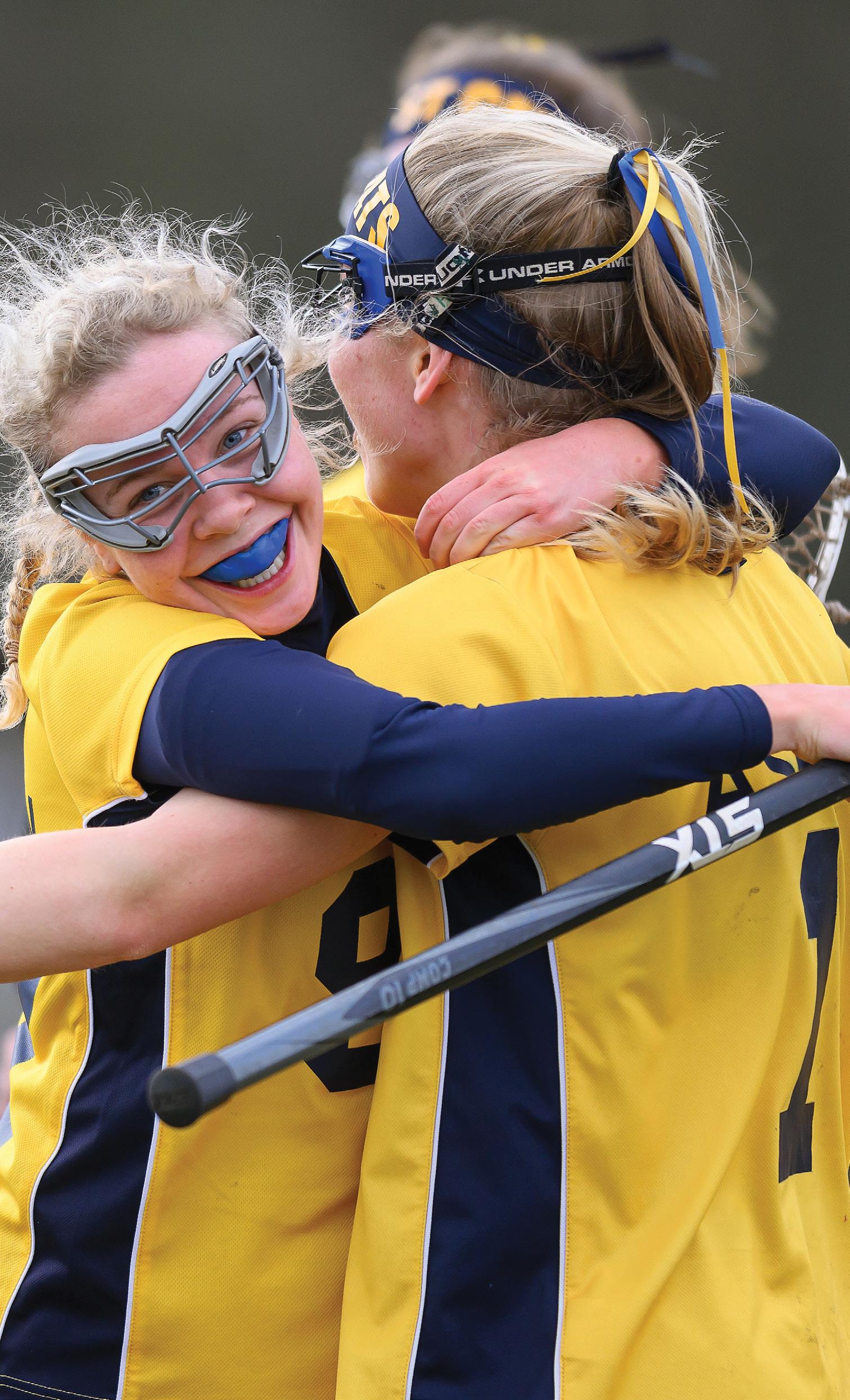
36
Every Tuesday offers an afternoon of senior sport for the Sixth Form, an opportunity for you to enjoy a break from academics and to maintain your personal fitness. You will have the chance to enjoy netball, lacrosse, swimming, tennis, yoga, squash and fitness sessions. You can also pursue your own individual interests such as badminton or trampolining, or try something new, for instance, football.
We are proud to field 5 senior lacrosse teams and 4 senior netball teams performing at the highest levels. Playing team sports helps you make friends, learn teamwork, show leadership, shape ambitions and form a competitive edge! If you would like to find out more about what is on offer contact sport@stcatherines.info
MUSIC
In the Sixth Form there is a vast range of opportunities to continue singing or playing your instrument, or to try something new. You can use skills already learned and take part in a number of musical ensembles such as Symphony Orchestra, Concert Band, Jazz Band and Camerata (our senior string ensemble). However, if you prefer to be part of a small group, there are chamber groups and smaller ensembles that you can join. There are four choirs open to the Sixth Form: Senior Choir (non-auditioned), Chapel Choir (for boarders, non-auditioned), Senior Chamber Choir (auditioned) and Cantores (auditioned), with Cantores being made up of a small number of the best choral singers from L5 to U6. There really is something for everyone at all levels, and you will quickly make a lot of good friends in the Music Department!
We have around 40 music staff and offer individual lessons in a wide range of instruments and singing. Some students decide to take up a new instrument in the Sixth Form; many continue with instrumental lessons that they have been taking for years and some even work towards higher level exams such as diplomas. We are happy to teach at all levels, and there is no obligation to take exams if you do not want to. This may be your moment to take up a new instrument.
There are also lots of performance opportunities, with many informal and sectional concerts for all styles, including our much-loved Jazz and Rock Concert each year just before May half term. The Gala Concert on St Catherine’s Day in November sees our choirs and large ensembles showcase their talents. In the Sixth Form, you may have the opportunity to lead a choir, orchestra or ensemble, and Music Scholars perform a concerto movement.
If you would like to find out more about what is on offer in the Music Department, whether that might be opportunities to perform as a
soloist or in choirs and ensembles, our range of concerts, or individual music lessons, please contact Matthew Greenfield, Director of Music. music@stcatherines.info
To see the full Music Calendar for 2023-24 please scan this QR code
JENNIFER BATE MEMORIAL ORGAN SCHOLARSHIP
This is an exciting and valuable opportunity for a girl who plays the organ and would like to develop her all-round performance expertise. The late Dr Jennifer Bate was an internationally acclaimed organist and a world authority on organ music, as well as a great friend of St Catherine’s. Throughout her life she was committed to helping and encouraging young women organists and gladly gave her name to our Scholarship which is open to any student who meets our academic standards for Sixth Form entry and who can show she has the potential to maximise her talents through this Scholarship which is awarded in conjunction with Guildford Cathedral. For further details please contact Matthew Greenfield, Director of Music. music@stcatherines.info
A full bursary place may be available to support the Scholarship. Attendance at the annual Jennifer Bate Organ Academy may help you explore this option. Please see the website for further details www.stcatherines.info/JBOA
SIXTH FORM MUSICAL
One of the real highlights of the Sixth Form year is The Sixth Form Musical. This is directed, produced and choreographed as well as performed by members of the L6 after their summer examinations. The production in 2023 was Annie. Past productions have included High School Musical, Beauty and the Beast, Legally Blonde, Joseph, How to Succeed in Business without Really Trying, The Producers and Grease. Each successive year group takes lasting memories away from these performances which are entirely student-led.
BUSINESS ENTERPRISE
Lower Sixth students have the opportunity to set up and run their own company through the St Catherine’s Business Enterprise Programme.
Students elect their own management team and allocate roles and responsibilities; design and produce a product of their own; raise
37
start-up finance and, finally, wind up the business, producing an end of year balance sheet and profit and loss account. They then donate their profit to a charity of their choosing. The programme is designed to be run over a school year and, in this time, students improve their understanding of enterprise and business whilst learning to work collaboratively. Typically, students meet once a week and there are regular sessions from teachers and experienced business and marketing professionals on the knowledge, skills and behaviours needed to excel in the competitive, entrepreneurial world of today.
CULINARY ARTS
If you are interested in cooking, you might like to sign up for the Culinary Arts cookery course: a 16-week course which runs during most Monday evenings in term-time through a calendar year. This takes place in our new Culinary Arts Studio opened in September 2022, which offers facilities that you would expect to see in a professional kitchen; think ‘MasterChef’! The course is charged as an extra, and is run by Mr Philip Friend, Head of Food and Nutrition and a finalist on BBC1’s Best Home Cook (2018). The course focuses on higher-end cooking and covers a variety of cuisines and skills. You will make many exciting dishes, learn many new skills and have a lot of fun in the process. Please note that this is a different course from the Culinary Arts subsidiary, which takes place during lessons and focuses on Street Food.
THE DUKE OF EDINBURGH’S AWARD
The Duke of Edinburgh’s Gold Award is a well-respected and recognised achievement and you will enjoy an unforgettable experience as you pursue it. An impressive number of St Catherine’s girls complete this prestigious award which also stands out on your CV and university application, while being very rewarding for its own sake.

CHARITY INVOLVEMENT
Raising money for good causes is a very important aspect of life at St Catherine’s, especially in the Sixth Form. Three fundraising groups - the Charities Board, Community Board and the Philanthropy Boardwork to promote further awareness of, and maintain links with, schools and projects in Kenya and Zambia and also work to identify other areas where they feel they can offer help. For example in 2023, the U6 girls
travelled to Cambodia to work with a local community farming and installing sanitation facilities. You may apply to become a member of these Boards which agree upon and organise a number of major events every year. In the past these have included the very popular Fashion and Talent Show, an African themed dinner dance, the Father-Daughter Dinner and the annual Jumble Sale. The Boards routinely raise several thousand pounds for good causes each year.
DISCUSSION & DEBATE
There are many occasions throughout your sixth form years to get involved in talking about all sorts of issues. In Debating Club, there are plenty of opportunities for internal and external combative British Parliamentary style debates, whilst maintaining regular ‘friendly’ debates with other schools. Our modern linguists also debate in French, German and Spanish. There is also an active Model United Nations club.
Eminent speakers address the Sixth Form on important issues as a means of curricular enrichment, with plenty of time for challenging questions!
CHAPEL
The Chapel at St Catherine’s offers a quiet place for reflection and contemplation in an otherwise busy environment. All Sixth Formers attend a short weekly morning Chapel Service conducted by our very popular Chaplain, the Rev’d Dr McNair Scott. Girls may be Confirmed during their time at School and can also read or give an address if they wish.
38
TRIPS
You will be offered the opportunity to take part in trips both close to home and further afield. Some are curriculum focused, and will enable you to deepen your understanding and bring to life a topic which you may only have been able to study from a book. Other trips will take you out of your comfort zone, where you tap hidden depths in your own personality. Whatever you decide to do, St Catherine’s trips will contribute to your Sixth Form experience. Here is a flavour of what we have offered recently:
Art & Photography Regular trips to London and Regional Galleries and Theatres
Biology Field trips e.g. Juniper Hall, Dorking
Business BMW Mini Factory, Cowley
Classics Sicily, Rome
Geography Field Study trips to Dorset and Iceland
History of Art Amsterdam
Music Prague, Dublin, Malta
Psychology Psychology in Action Conference, London
Politics Houses of Parliament
Sport USA and Barbados
Theatre Studies Edinburgh Fringe, London theatres
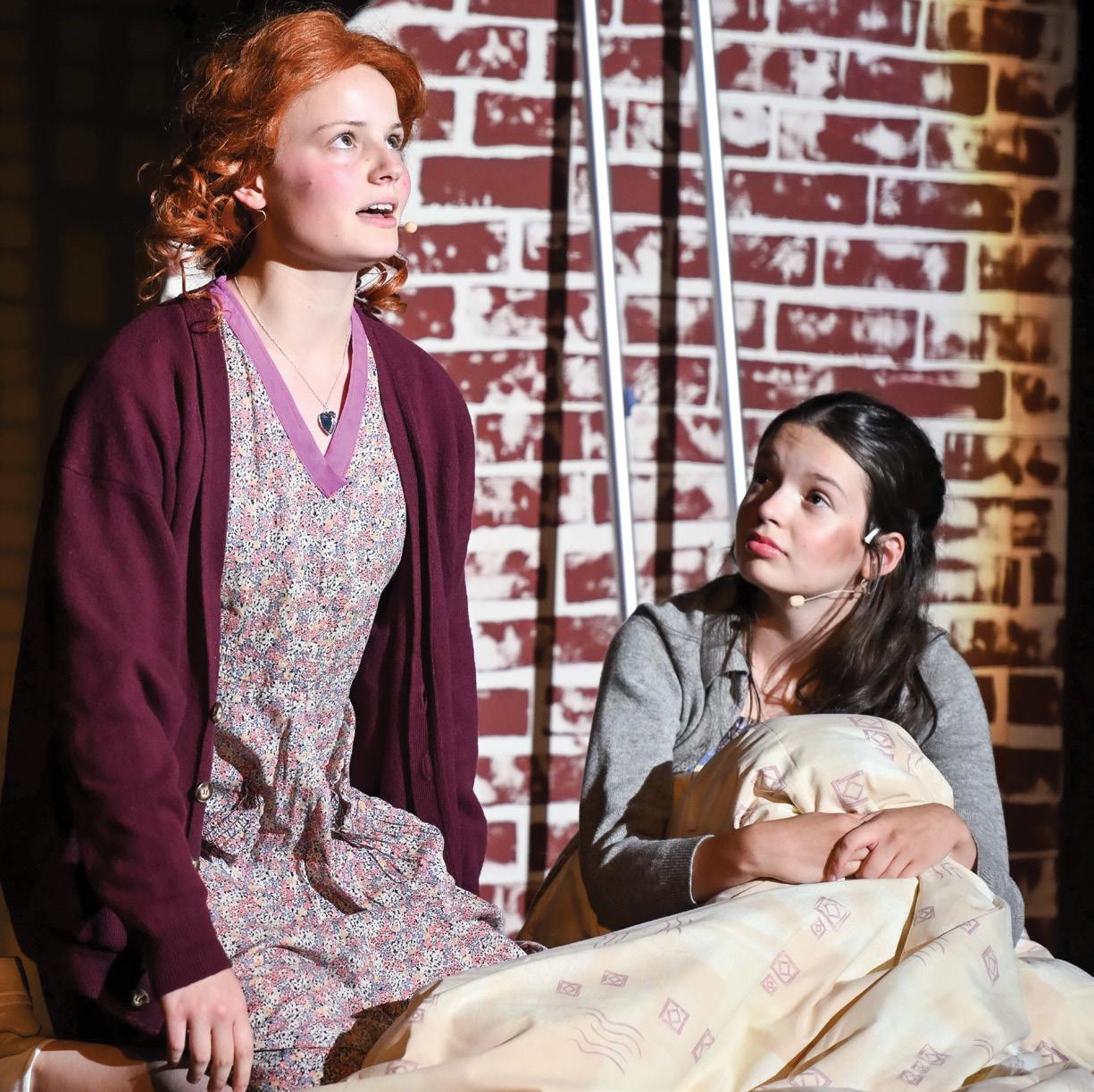
Sixth Form Expedition Recent destinations include Borneo, Costa Rica, Vietnam, Cambodia and Tanzania

Sixth Form students may also apply for three types of travel/project bursaries, worth in total over £3,500, to assist with financing Gap Years or Summer holiday projects.

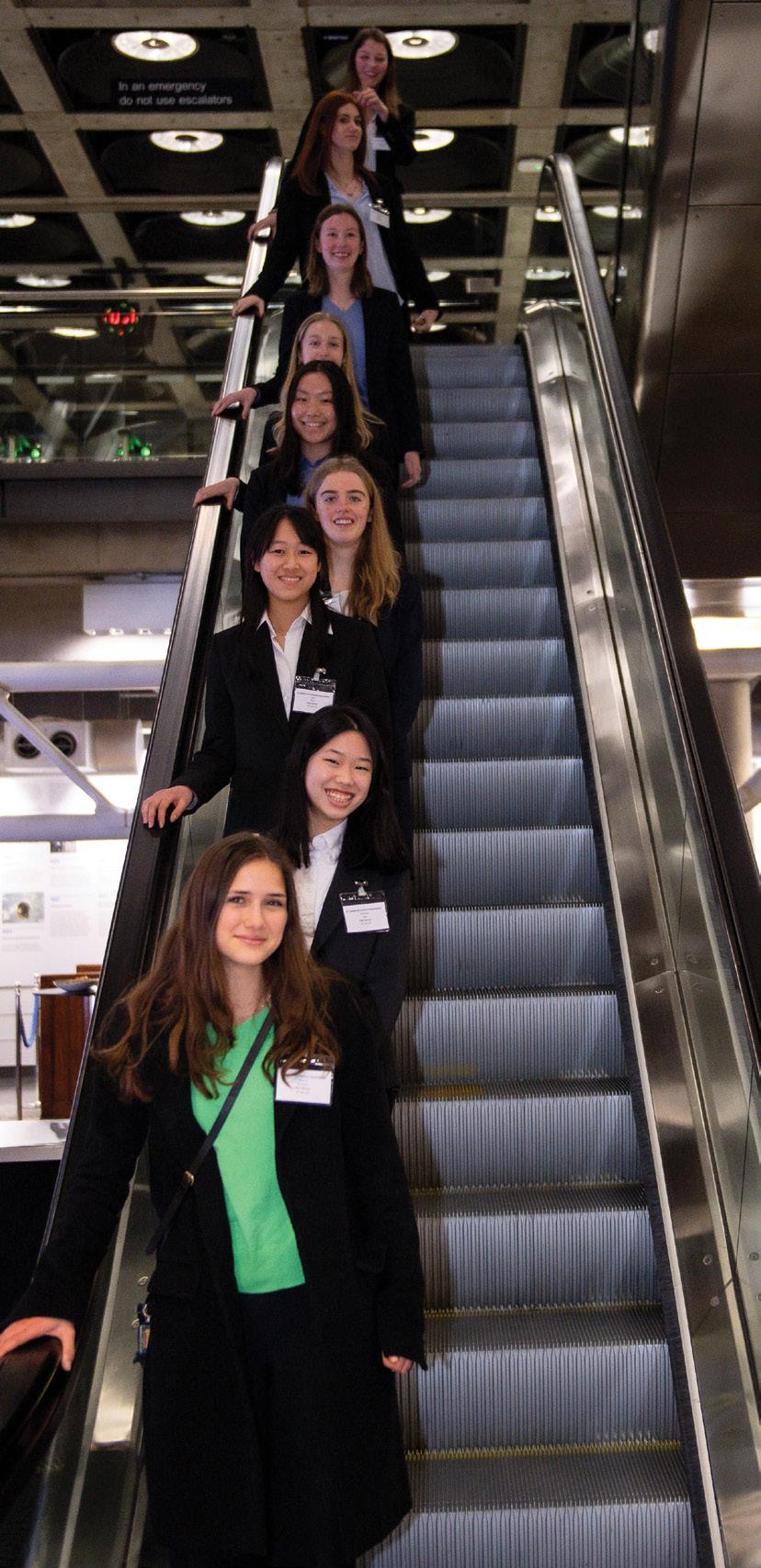
39
ALUMNAE INSPIRATION
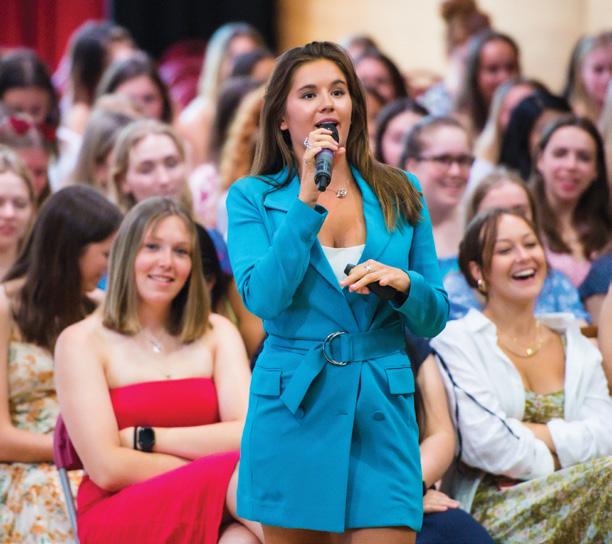
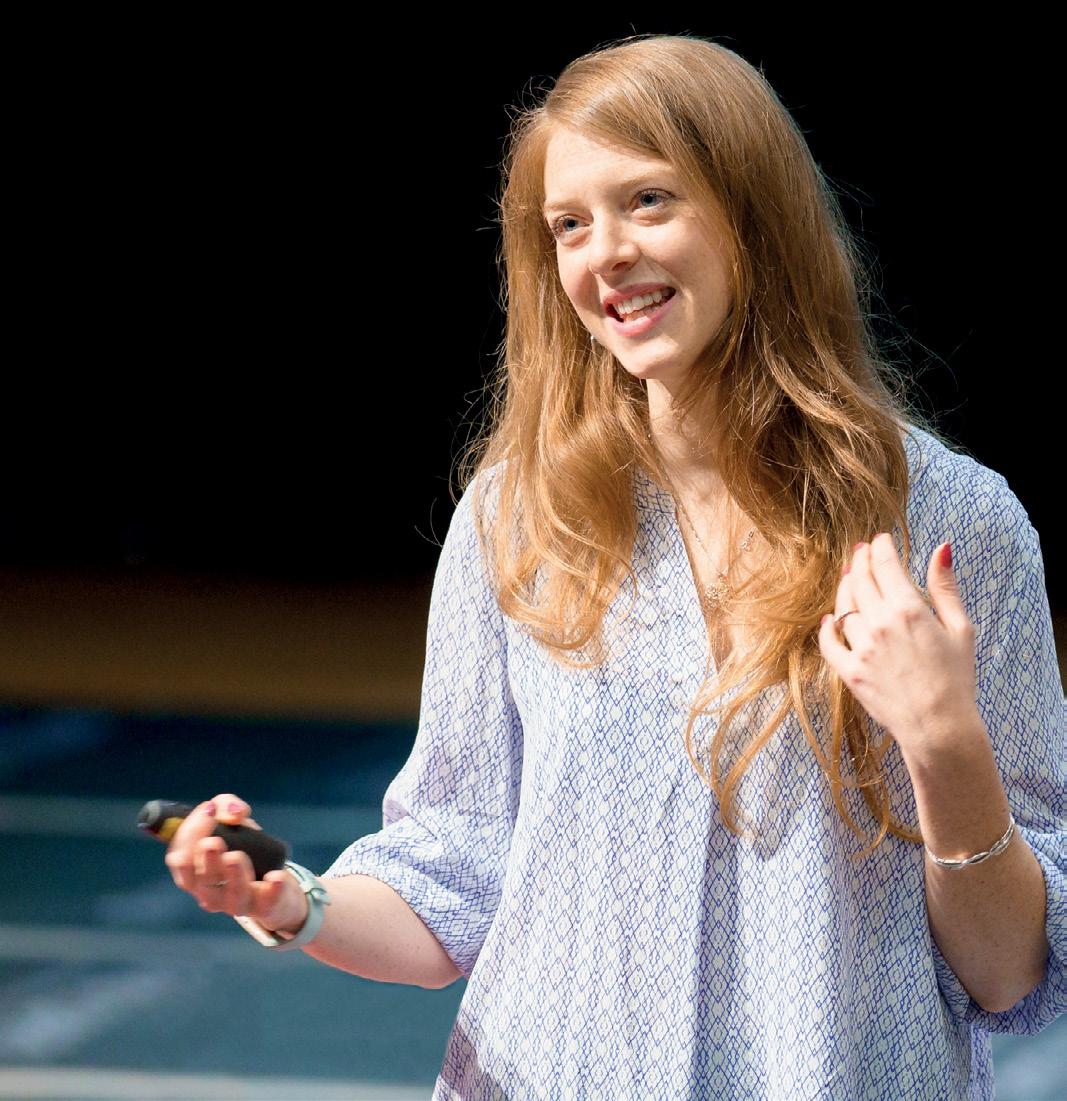
The Association has been invaluable to me, helping me connect with alumnae when I was considering universities and degree courses. It is so lovely to still feel connected to St Catherine’s.
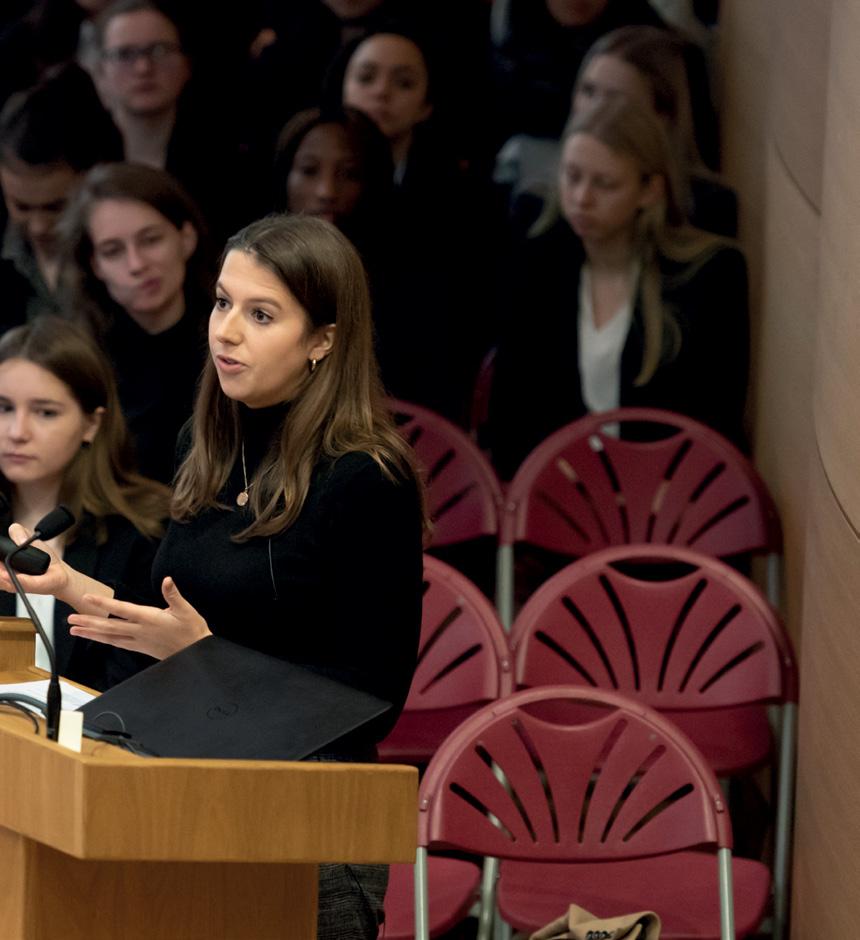
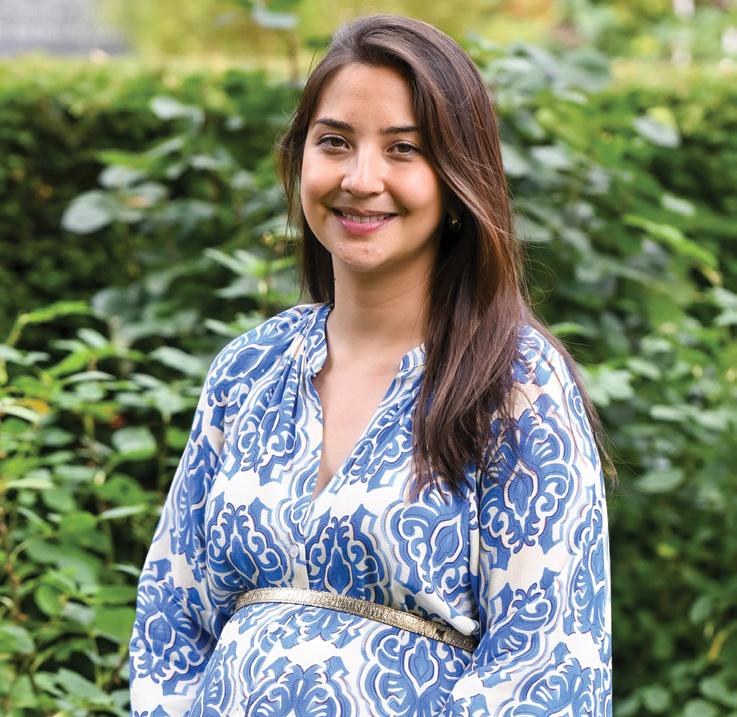
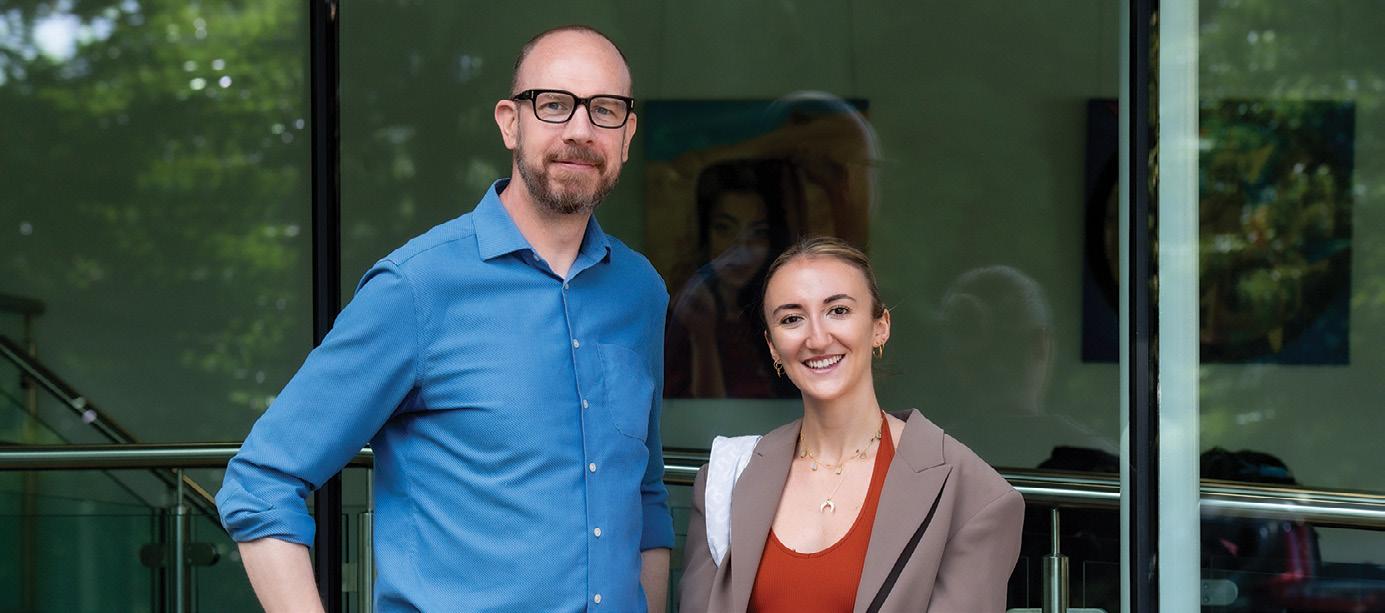
Alumna,

SELF-BELIEF FROM ST CAT’S
Year of 2021
Scarlett Peterson (2016) Print Designer for Sweaty Betty
Carly Brown (2009), Freelance Editor in Film and Television - worked on The Crown Series 4 and Belfast with Sir Kenneth Branagh
Cassa Jackson (2016), singer/songwriter and modern languages graduate, in 2021 performing at the O2 and speaking at St Catherine’s in 2022.
Ellie de la Bedoyere (2011), speaking about her work as Senior Policy Advisor in The Cabinet Office to Michael Gove
– Speech Day 2023 40
Camilla Alonzo (2008) International Human Rights Lawyer at the Human Rights Advocacy Centre (EHRAC) as guest Speaker
WHERE DO ST CATHERINE’S GIRLS GO NEXT?
We have an enviable reputation for girls gaining offers from top universities in the UK and further afield. You will be offered advice and encouragement every step of the way. Girls who choose to take a gap year come back to benefit from the support we offer or can be supported online from far-flung locations. In an increasingly competitive application process it is good to know you are going to be taken very seriously. Take a look at the Destination of Leavers data which can be found on the following two pages to see where our Sixth Formers go. No editing. The full story!
20222023
UNIVERSITY DESTINATIONS
The Association Office is a valuable resource for St Catherine’s students during their time at school and afterwards. The team is able to connect students to alumnae who are enrolled at, or are graduates of, universities that they may be interested in, and who provide them with guidance and interview preparation if needed. Additionally, the office assists former students in finding internships through the network of St Catherine’s alumnae. I have found this network to be of much help when seeking out work experience opportunities in the field of politics and social justice.
Noor, Alumna, Year of 2022
Russell Group (excluding Oxbridge)
Non Russell Group and Conservatoires
Oxbridge
Overseas Universities
The Russell Group represents 24 world-class, research-intensive universities which include Oxford and Cambridge, Birmingham, Bristol, Cardiff, Durham, Edinburgh, Exeter, Glasgow, Imperial College
London, King’s College London, Leeds, Liverpool, London School of Economics, Manchester, Newcastle, Nottingham, Queen Mary’s London, Queen’s Belfast, Sheffield, Southampton, University College
London, Warwick and York.
Other leading universities include Bath, Lancaster, Southampton, St Andrews and Swansea, along with the major conservatoires.
Please contact the Head of Careers Education on careers@stcatherines.info if you would like further information.
41
Bath International Management and Modern Languages
– Spanish
Bath Physics with Astrophysics
Bath Robotics Engineering
Bath Spa Fashion Photography
BIMM Institute (Manchester) Popular Music Performance & Music Production
Birmingham Economics and Politics
Birmingham Politics and International Relations
Bristol English
Bristol Liberal Arts
Bristol Pharmacology
Bristol Veterinary Science
Cambridge Land Economy
Cambridge Theology, Religion, and Philosophy of Religion
Cardiff Computer Science
Cardiff History
Cardiff Medicine
Durham Anthropology
Durham Business and Management
Durham Politics
East Anglia
Microbiology
Edinburgh Social Anthropology
Edinburgh Veterinary Medicine
Exeter Geography
Exeter Drama and Film & Television Studies
Exeter History
Exeter Liberal Arts
Falmouth Theatre & Performance
Kent Psychology
King's College, London Medicine
King's College, London Psychology
King's College, London
Religion, Philosophy and Ethics
Lancaster Computer Science
Leeds Geography
Leicester Politics and International Relations
Leipzig, Germany Physics with Astronomy
London School of Economics Accounting & Finance
London School of Economics
International Social and Public Policy with Politics
London School of Economics Management
London School of Economics Philosophy and Economics
London School of Economics Politics
Loughborough
Manchester
Psychology
Drama and English Literature
Manchester Economics
Manchester Politics and Sociology
Newcastle Medicine and Surgery
Newcastle Psychology
Newcastle Psychology
Nottingham Architecture
Nottingham Geography
Nottingham Management
Nottingham Management
Nottingham Management
Nottingham Medicine
Nottingham Psychology and Cognitive Neuroscience
Nottingham Trent Economics
Oxford Mathematics and Philosophy
Oxford Medicine
Oxford Spanish and Arabic
Oxford Brookes Criminology
Peking University, China
Accounting & Finance
Reading Economics
Rice University, Texas Psychology
Royal Birmingham Conservatoire Music
Royal Conservatoire of Scotland Technical Theatre
Royal Holloway Philosophy
Sheffield Japanese Studies
Southampton Geography
Southampton Mechanical Engineering/Mechatronics
Southampton Natural Sciences
St Andrews Medicine
Sunderland Medicine
University College, London Comparative Literature
University College, London Linguistics
University College, London Medicine
University College, London Pharmacy
University of Hong Kong Dentistry
Vrije University, Belgium Politics and International Relations
Warwick Physics with Astrophysics
Warwick Psychology
Washington University, St Louis, USA Biomedical Sciences
York Economics and Philosophy
UNIVERSITY COURSE UNIVERSITY COURSE
The Class of 2022 includes all 2022 leavers, including those who deferred their University entrance to 2023.
42
Aston Medicine
Bath Chemistry
Bath Pharmacy
Birmingham Business Management with Marketing
Birmingham Medicine
Birmingham Modern Languages and History of Art
Bournemouth
Marketing Communications with Digital Media
Bristol Dentistry
Bristol English and Classical Studies
Cambridge Geography
Chichester Musical Theatre Performance
Durham Engineering
Durham Modern Languages and Cultures
Durham Natural Sciences
Durham Natural Sciences
Durham Social Sciences
Exeter Geography
Exeter Accounting and Business
Exeter Anthropology
Exeter Businesss
Exeter Business and Management
Exeter Communications and Modern Languages
Exeter Economics
Exeter Economics and Politics
Exeter Geography
Exeter History and Modern Languages
Exeter Mathematics with Finance
Exeter Physics
Exeter Politics and International Relations
Exeter Politics and International Relations
Exeter Politics and Sociology
Exeter Psychology
George Washington University, USA International Development with Economics
Glasgow Medicine
Kent Economics
Lancaster Zoology
Liverpool Criminology
Loughborough Management
Manchester Economics
Manchester Economics and Finance
Nottingham Architecture
Nottingham Criminology and Sociology
Nottingham Geography
Nottingham History and Politics
Nottingham Politics and International Relations
Nottingham Politics and International Relations
Nottingham Politics and International Relations
Nottingham Psychology
Oxford Classics
Oxford English Language and Literature
Oxford History and Economics
Oxford Brookes Interior Architecture
Oxford Brookes Real Estate
Reading Animal Science
Reading German and Business
Southampton Medicine
St Andrews
Surrey
The College of William & Mary, USA
Evolutionary Biology
International Relations
Politics and Sociology
The Royal Academy of Music Music
University of Science and Technology, Hong Kong
Economics and Management
University College, London History and Politics of the Americas University College, London Pharmacology
University College, London Psychology
University of British Columbia, Canada Management
Utrecht University, Netherlands Politics and Sociology
Warwick Theatre and Performance Studies
York Economics, Econometrics and Finance
The Class of 2023 for now includes 7 girls who have secured places to start their degrees in 2024. It excludes 12 girls who have chosen to apply to University during a gap year of structured work/internships/travel. They continue to be supported by St Catherine’s staff as they make these applications and will be listed next year.
UNIVERSITY COURSE UNIVERSITY COURSE
43
THE ST CATHERINE’S DIFFERENCE
CONFIDENCE, CAPABILITY AND COMPASSION
In the 21st century, self-esteem and self-belief are critical if you are going to maximise your potential, not only as an individual but in how you make an impact on the world around you. In and outside the classroom, we offer you the experiences, leadership opportunities and support to build your confidence and capabilities. With a deep sense of self-belief and your feet firmly on the ground, you can excel academically and in life. An ethos of believing ‘there is nothing a woman cannot do’ is our constant lodestar.
The A-level classes are extremely small. The lessons are therefore heavily discussion based and I am able to obtain individual time with teachers very easily.
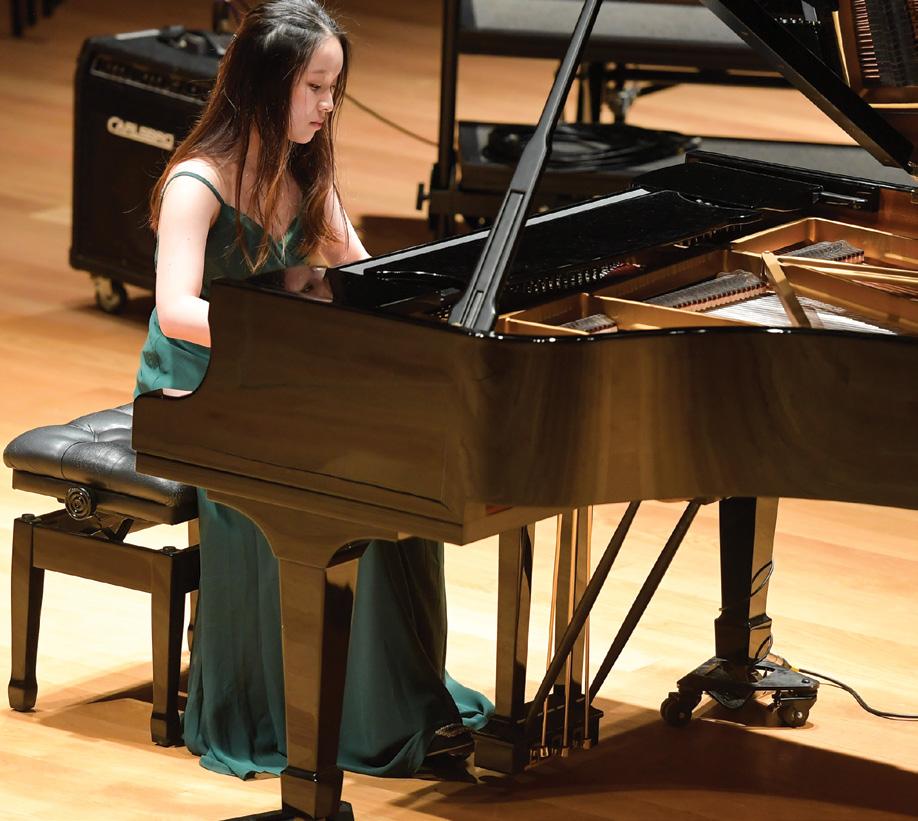
Sixth Form in The 6 is a really warm and friendly environment, where you can form friendships and socialise with girls across both year groups.
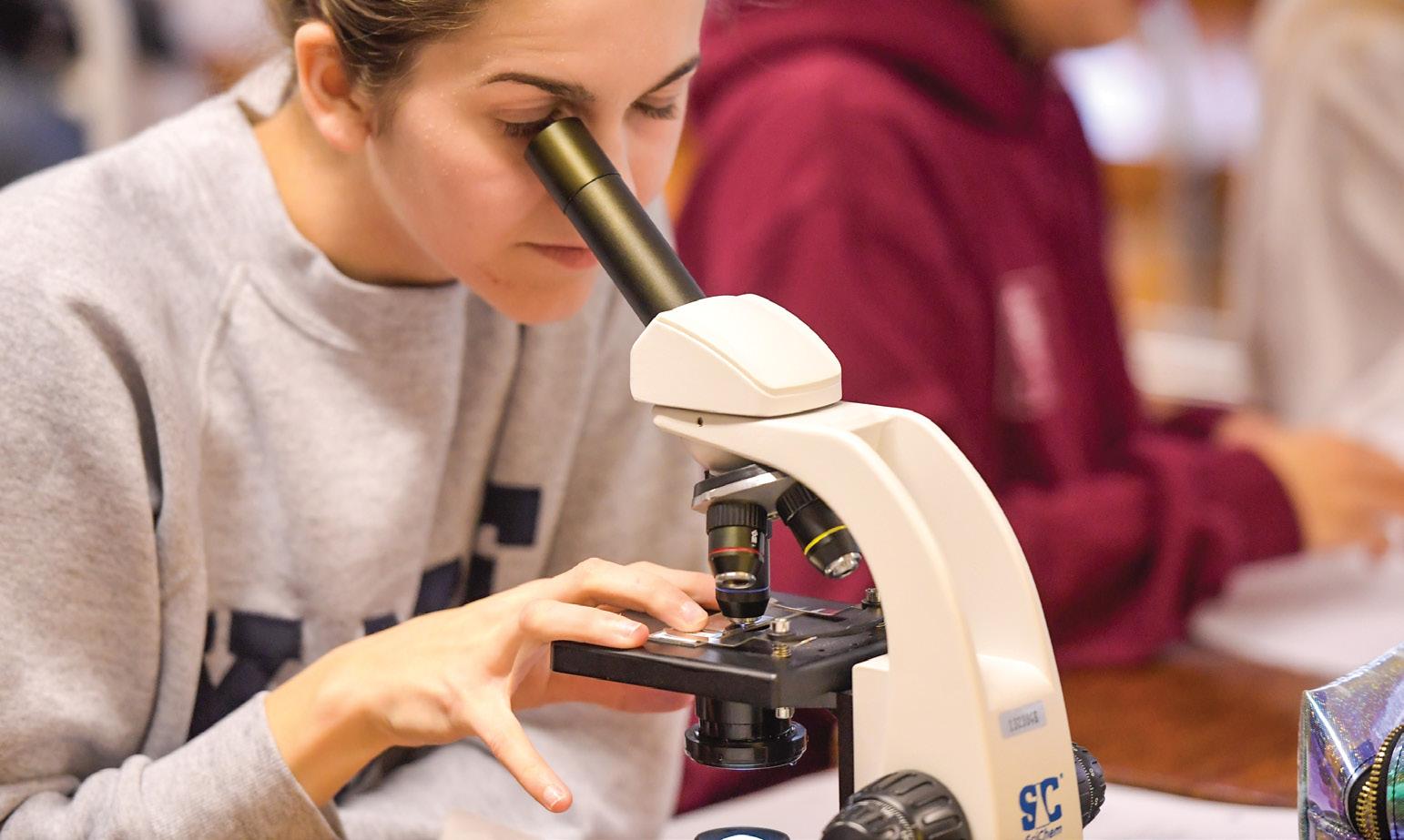
Sarah-Jane, Day Girl
Thank you so much for organising and leading the Cambridge University visiting for the girls interested in Oxbridge applications. My daughter came home buzzing.
I love the sense of community. Long after leaving St Cat’s, the communication between students and alumnae is still strong.
Our daughter is loving Sixth Form – and absolutely loving boarding. She has four University offers and is waiting to hear from Edinburgh.
Current Parents, 2023
Annabel, Day Girl Mrs Salford, Current Parent
Sophie, Boarder
44
A LEVEL SUBJECTS
BIOLOGY AS/A A
Head of Department: Mrs Claerwen Patterson BA, MA Oxon, PGCE Cambridge Assessment International Education (CAIE)
WHY STUDY BIOLOGY?
“Overpopulation, the destruction of the environment, and the malaise of the inner cities cannot be solved by technological advances, nor by literature or history, but by measures that are based on an understanding of the biological roots of these problems.”
Ernst Mayer - This is Biology: The science of the living world. Biology not only unlocks some of the mysteries of living things but also inspires young people to want to know more about themselves.
COURSE CONTENT
We explore the ultrastructure of cells and the importance of the biological molecules which make up the cell components and enable them to carry out their functions. We also discover the vital roles of DNA, RNA and enzymes. Transport systems in plants and animals a re investigated and you will be able to apply this knowledge to gain an in-depth understanding of how the heart beats, the role of haemoglobin in the blood and how sucrose is transported around a plant. You will learn about the role of antibodies as they assist our immune systems and explore the world-wide importance of diseases such as malaria and HIV/AIDS.
We then explore biodiversity, classification and the importance of species conservation. This is complemented by studying the important role that genes play in our lives, which leads naturally on to evolution and natural selection. We delve into the intricacies of respiration and photosynthesis, which will unlock many of life’s mysteries. We also study homeostatic mechanisms including the structure and function of the kidneys and the role of nerves, muscles and hormones. We then get to grips with cellular control, biotechnology and the fascinating world of plant responses.
ASSESSMENT
NB: The AS Level is carried forward to contribute to the A Level
AS Level:
1 x 1 hour 15 mins multiple choice paper
1 x 1 hour 15 mins structured question paper
1 x 2 hours practical skills paper
A Level: (In addition to AS Level)
1 x 2 hours structured question paper
1 x 1 hour 15 mins planning analysis and evaluation paper
BUSINESS
Head of Department: Mrs Cathy Williams BA Cantab Examination Board: Edexcel
WHY STUDY BUSINESS?
Have you ever wondered how Urban Outfitters has managed to increase prices whilst maintaining busy shops and cash tills? Or what has driven Apple’s phenomenal growth and brand loyalty? Or why Elon Musk’s SpaceX and Tesla are valued so highly? From here, how will the current economic environment shape business strategy, plans and finance?
A Level Business is a useful and pragmatic subject that gives a thorough understanding of the way in which businesses in the world today are run. You will gain an understanding of business in a range of contexts and will develop a critical understanding of organizations and their ability to meet society’s needs and wants. You will build a range of skills including decision-making, problem-solving, and critical analysis and you will be exposed to some of the ethical dilemmas and responsibilities faced by organisations and individuals. Business and management is a growing subject at both undergraduate and post graduate level. There are now over a hundred MBA courses on offer in the UK and the numbers of students enrolling on them are increasing. At degree level, many universities offer options to combine Business with a language; in today’s globalised business environment, A Level Business is definitely an option worth considering.
COURSE CONTENT
• The key internal functions of business including: marketing, people management, finance and operations management.
• How managers use quantitative and non-quantitative data in decision-making, and the factors that affect whether a decision is successful.
• Markets and the competitive environment in which businesses operate.
• Business ethics and corporate social responsibility including environmental issues.
ASSESSMENT
A Level:
3 x 2 hour examinations taken at the end of the U6.
Paper 1: Marketing, people and global business: consisting of data response questions and an essay.
Paper 2: Business activities, decisions and strategy: consisting of data response questions and an essay.
Paper 3: Investigating businesses in a competitive environment: data response questions based on a pre-released theme.
45
CHEMISTRY A A
Head of Department: Mrs Nicola Austin MChem Oxon, QTS Examination Board: Edexcel
WHY STUDY CHEMISTRY?
One of the first things that you will notice as you progress through to A Level is that some of the ideas that you took for granted at GCSE have more to them than you thought. As you gain a deeper understanding of the underlying principles involved, you will start to see how all the many and varied aspects of the subject are held together. The ability to apply your mind in this way is highly valued in the wider world, hence why Chemistry students rarely find difficulty in obtaining employment. Studying A Level Chemistry will allow you to discover more about the fascinating world we live in and the science behind major technological developments.
COURSE CONTENT
In the L6 you will study many topics covered at GCSE in more depth. These include atomic structure, energetics, rates and amounts of substance. You will also study the foundations of Organic Chemistry and analytical techniques.
In the U6 you will learn a wider selection of reactions in Organic Chemistry and how they can be used to synthesise everything from pharmaceuticals to fabrics. You will study analytical techniques with a wide range of applications including forensics, medicine and in industry. Physical Chemistry topics are developed and mathematical techniques are applied to predicting whether reactions occur, interpreting pH and analysing rates information. The colourful world of transition metals and their applications to modern day life are also explored.
16 core practicals are integrated into the two year course and you will have ample opportunities to develop your understanding of experimental methods and practical skills.
CLASSICAL CIVILISATION
Head of Department: Mrs Jessica Ashby MA Cantab, PGCE Examination Board: OCR
WHY STUDY CLASSICAL CIVILISATION?
Classical Civilisation is a rewarding, stimulating and enjoyable subject –brilliant for lovers of Literature, Drama, History and Art. You will revisit many of the myths that might have inspired you as a child, examine works of art that you will have seen in books and on posters, and study the history and culture that shaped Western Civilisation. Through your studies you will learn how the ideas and institutions, the artefacts and achievements of the Greeks and Romans continue to have an enormous impact on our modern lives. No prior knowledge of Latin or Greek is required.
COURSE CONTENT
You will study two modules in the L6 - The World of the Hero, and Culture and the Arts.
The World of the Hero Paper involves the study (in translation) of one of Homer’s incredible epics, the Odyssey, charting the Greek hero Odysseus’ adventure-packed journey home to Ithaca. Among the many themes this story presents, you will explore the concept, values and behaviour of a hero, including the ideas of honour and reputation.
The Culture and Arts Paper explores different aspects of Greek Theatre. You will look not only at three plays from both the comic and tragic genres - texts which continue to be performed today and which have had a profound and wide-reaching influence on modern culture – but also at the physical and cultural context in which theatrical performances developed: for example, looking at evidence for costumes, masks and the theatres themselves.
In U6, you will supplement your L6 study of Homer’s Odyssey with study of Virgil’s Roman epic, the Aeneid. You will also develop your awareness of the culture of Greece and Rome by exploring in more detail some of the religious, political and social beliefs which underpinned these societies.
ASSESSMENT
A Level:
2 x 1 hour 45 mins papers
1 x 2 hours 30 mins paper
At A Level there is also a teacher assessed practical competency. This will be reported separately to your A Level grade.
ASSESSMENT (no coursework)
A Level:
The World of the Hero paper: 2 hours 20 mins (40% of A Level mark)
Culture and Arts paper: 1 hour 45 mins (30% of A Level mark)
Beliefs and Ideas paper: 1 hour 45 mins( 30% of A Level mark)
46
CLASSICAL GREEK COMPUTER SCIENCE
Head of Department: Mrs Jessica Ashby MA Cantab, PGCE Examination Board: OCR
WHY STUDY CLASSICAL GREEK?
If you have studied Greek GCSE, A Level should be well within your grasp as we have plenty of time to cover the syllabus and revise grammar. The girls currently studying the subject in the Sixth Form love the small groups and informal nature of the lessons. Discussions range from the sublime to the ridiculous, taking in all sorts of aspects of the Greek World – from the status of women in Athenian society to why Persians got drunk when making decisions.
COURSE CONTENT
The key elements of the course are still Language and Literature. The course in the L6 involves unseen translation from Greek into English and a choice of further unseen translation or English - Greek sentences. These are very straightforward and even enjoyable! Translating into Greek can be very satisfying and excellent for your knowledge of those tricky principal parts.
Your L6 prose text will be either the start of Herodotus Book 1, about the early kings of Lydia, including nudity, revenge and oracular utterances, or extracts from Plato’s Republic, dealing with some of life’s big questions – age versus youth, the value of wealth, how to live a good life and what is justice? You will also read parts of either Homer’s lliad 16, where Patroclus offers to fight instead of his friend Achilles and is killed dramatically in battle, or Euripides’ Hippolytus, where a stepmother falls in (extremely unrequited) love with her stepson, with terrible consequences for all concerned. You will extend these linguistic and literary studies in the U6 by studying further prose and verse set texts, which can be tailored to suit the interests of the typically small but stimulating teaching groups.
ASSESSMENT (no coursework)
A Level:
Unseen Translation: 1 hour 45 mins, 33% of A Level
Prose Composition or Comprehension: 1 hour 15 mins, 17% of A Level
Prose Literature: 2 hours, 25% of A Level
Verse Literature: 2 hours, 25% of A Level
WHY STUDY COMPUTER SCIENCE?
If creating the next software application interests you, or if you want to find out how to develop systems to solve real-world problems, then consider Computer Science. This course is all about both the academic and the practical. You kick off by understanding how computers are actually built, which feeds into techniques of how to develop software. Lots of practice in writing algorithms and working with data structures gives you the tools you need to build systems. In the second year you start your programming project which is completely your own; you seek out what you want to build, then develop a system for other people to use. Throughout the course, you will use environments and techniques used in industry, e.g. agile development.
Computer Science sits well alongside other Science subjects, including Maths, Further Maths, Physics and Economics. To be successful in this subject you need precision, careful reasoning and a large dose of creativity.
COURSE CONTENT
In the first year you will explore and absorb core principles, acquired through both theory and practical activities. In the second year this all starts to knit together as you develop your skills through working on your personal project, which is a perfect springboard for moving up to higher education and the workplace.
COURSE REQUIREMENTS
GCSE Computer Science
ASSESSMENT
A Level:
Component 01 (40%): Computer Systems 2 hours 30 mins
Component 02 (40%): Algorithms and Programming 2 hours 30 mins
Component 03 (20%): Programming Project
A A
Head of Department: Miss Sandra Morris BSc Surrey, PGCE Examination Board: OCR H446
47
PRODUCT DESIGN A A
Head of Department: Mr Alastair White BA Winchester, QTS Examination Board: AQA
WHY STUDY DESIGN ENGINEERING?
Studying DE enables you to get to grips with social and environmental issues surrounding the use of the materials of our world in a way that is practical, thought provoking and intellectually challenging. DE is a rapidly growing subject; some students choose DE because it fits well with their Science courses, others because it gives them a valuable life experience in managing a truly personal project across long timescales.
COURSE CONTENT
The A Level course has two main elements, the theory preparation for the examination and a non-examined (coursework) assessment (NEA). This will be a substantial iterative project with a portfolio of supporting design work. You will be required to undertake a project based on a need or opportunity of your choice. The project will address some need for improvement in the world. Originality, spontaneity and a willingness to take risks (not too many!) are all really important. New technologies such as electronics will be incorporated into your project as required.
The content of the written paper is taught separately to your project work, but where possible you will study the theory work through practical activities.
Technical Principles covered include materials and their applications, performance characteristics of materials, digital design and manufacture, intellectual property rights, enterprise and marketing and industrial manufacture.
Design Principles elements of the course include design methodology, technology, critical analysis, responsible design and National and international standards.
DRAMA & THEATRE STUDIES
Director of Drama: Mrs Laura Grizzelle-Lang BA London, PGCE Examination Board: AQA
WHY STUDY DRAMA & THEATRE STUDIES?
Drama and Theatre Studies is a fascinating subject for anyone with a genuine interest in theatre and is not just for students who want to take up the Performing Arts as a career. The course involves practical performance and/or design work, the study of set texts and practitioners, and the analysis of contemporary productions. Going to the theatre is therefore, an essential part of the course and that is a definite plus! It is also a highly respected academic subject (past students have gone on to study at Oxbridge and other reputable universities) and it combines well with a wide range of other subjects at A Level.
COURSE CONTENT
A Level: You will rehearse and perform sections of text from three different plays, one of which will be performed to an audience, whilst keeping a portfolio of your research and performance development. You will also study two set plays and see a minimum of four productions at the theatre, learning how to analyse the production and performance techniques employed on stage. Finally, you will create a devised performance, influenced by the work of your chosen practitioner, and produce an accompanying notebook to reflect upon the process. The written exam at the end of the two years will comprise of Live Theatre analysis and questions on your two set texts.
ASSESSMENT
A Level:
Examination Paper: 2 Hours 30 mins - Technical Paper (25%)
Examination Paper: 1 hour 30mins - Design Paper (25%)
Coursework: 1 Major Project (50%)
ASSESSMENT
A Level: 3 hour written paper on two set plays and their potential for performance as well as a question on the work of theatre makers in a single live theatre production - 40%
A practical group project (Devised group piece) + working notebook (coursework) and the performance of three scripted pieces + working notebook (coursework) - 60%
48
ECONOMICS ENGLISH
Head of Department: Mrs Cathy Williams BA Cantab Examination Board: Edexcel
WHY STUDY ECONOMICS?
Economics is a fascinating subject that will enable you to learn more about how the world works. For example, what will be the longer-term impact of disrupted supply chains, heavy government borrowing and overstretched health care systems? Why has inflation risen so high recently and why has it proved so intractable in the UK in particular?
More generally you will understand why some people earn so much more than others and why water (essential to life) costs very little whereas a painting by Klimt sold recently for 86 million euros. You will understand why the government provides some services and leaves others to the private sector. Why are some countries rich and others poor and what can be done about it? Finally, you will understand why climate change has happened and what Economics can tell us about possible solutions.
Alongside, you will develop an enviable range of transferable skills such as problem-solving, communication, numeracy, commercial awareness, analysis and decision-making. All of this means Economists can make a difference to society.
COURSE CONTENT
L6 or Year 1: Microeconomics is the study of individual markets. A good example of a micro market that has rarely been out of the news in the last decade is housing. For many years house prices rose at a spectacular rate, will this continue? Occasionally, market forces can create unfavourable outcomes for society, for example, should the government allow firms to pollute the environment and to employ children? Macroeconomics concerns economy-wide issues such as the causes of economic growth, inflation and unemployment. You will also study the impacts of government economic policy on the economy.
U6 or Year 2: In the second year you will study micro and macroeconomics in more depth, applying your knowledge to specific markets and economies. For example, is road pricing the answer to congestion on UK roads? A Level macroeconomic issues include: the economics of international trade, exchange rate determination, the balance of payments, and development economics.
ASSESSMENT
A Level: 3 x 2 hour examinations. These examinations consist of a mixture of essays and extended data response questions.
Head of Department: Mrs Hannah Simcock MA Oxon, PGCE Examination Board: Cambridge Assessment International Education (CAIE)
WHY STUDY ENGLISH?
A Level English Literature is a very popular academic subject, highly regarded by universities and employers in a variety of careers. It is a good companion to studies in History and Languages though it may be taken in conjunction with a range of subjects in both the Humanities and Sciences. You should come to lessons prepared to work diligently, to read both extensively and with close attention to detail, to think hard, and to discuss your ideas in the classroom and beyond. The rewards lie in the enriching of your mind that comes with encountering a variety of great literature, in the sharpening of your ability to express yourself clearly and coherently in speech and writing, and in the sheer pleasure that reading and discussion provide. By the end of the course, the books you have read, discussed and written about will ideally be part of an unfolding lifetime’s enjoyment of literature.
COURSE CONTENT
The L6 of 2023-2024 take two AS Level papers, one on drama and poetry, and one on prose and an unseen text. The set texts on the former paper will be Measure for Measure and poems from the CIE anthology Songs of Ourselves Volume 2. The prose set text is Atonement, by Ian McEwan.
The U6 of 2023-2024 are taking two A Level papers, one on Shakespeare and drama, and one on pre and post 1900 poetry and prose. The set texts on the former paper will include The Merchant of Venice as well as a modern play by Eugene O’Neill. The latter paper will require study of Pride and Prejudice and poetry by the former US Poet Laureate, Natasha Trethewey.
The full A Level course, therefore, requires the detailed study of seven texts, covering drama, poetry and prose, and ranging across several centuries. The course tests the ability to analyse each of these texts closely, as well as the application of this skill to an unseen text.
ASSESSMENT
NB: The AS Level is carried forward to contribute to the A Level AS Level: Assessed in 2 x 2 hour papers. These same two papers make up 50% of the full A Level
A Level: 2 x 2 hour papers, making up the final 50% of the full A Level
AS/A
A 49
FINE ART A AS/A
FRENCH
Head of Department: Mr
Alex Perry-Adlam BA Liverpool John Moores, Cert Ed., PGCE Examination Board: AQA
WHY STUDY FINE ART?
Art is not only about making beautiful images and objects, it is also about creative problem-solving, developing personal opinions about art works, as well as responding to historical events, and becoming more in touch with the visual world that surrounds us.
We are in the middle of an artistic renaissance with Britain being at the forefront of creativity in all areas from fine art to graphics and fashion to film. Many of the leaders in this new wave of creativity took Art for A Level and credit the course with teaching them the foundation of how to work experimentally and creatively.
Most importantly, the course is about you. It’s about finding your style of working and developing your personal interest in the subject.
COURSE CONTENT
The start of the course is more traditional where you will learn formal elements of Art such as colour theory, composition, oil painting techniques and how to develop your ideas through sustained investigations to record a number of outcomes.
The second coursework project is more self-guided and where you will investigate an area of Art that interests you. You will also write a 2,500 word extended essay on the theme of the project you have chosen.
The final exam is a topic given by the exam board in January of the final year.
ASSESSMENT
A Level: 60% Personal Investigation: Practical work and a personal study; a written essay of 2,000 - 3,000 words
40% Externally Set Assignment: Assessed as an independent unit: 15 hour examination
Head of Department: Mrs Catherine Peel
MA Oxon, PGCE Examination Board: AQA
WHY STUDY FRENCH?
Studying a foreign language and the people who speak it will:
• give you skills and experiences that will expand your horizons for the rest of your life;
• give you an advantage over others in an increasingly globalised labour market and open up career opportunities in Europe and beyond;
• help you to understand the motives, politics and culture of countries that are vital to the future of the UK, especially in the EU;
• teach you to look at the world through the eyes of others;
• develop important and highly transportable skills of analysis, debate and independent thought.
Do not fall into the trap of thinking that studying a foreign language (or two!) is just for those who want to teach or translate. Ask your teachers about the vast array of career opportunities with languages as your main academic pursuit or in combination with other subjects. Just think how much more confident a communicator you would be – and how much more of an asset to your future employer - if you weren’t tongue-tied every time you left Heathrow!
Be an entrepreneur or an agent provocateur, read Sartre in Montmartre or eat gâteau in a chateau. We offer entente cordiale and many a grand prix. There may be some déjà vu but you will always be bienvenue!
COURSE CONTENT
Year 1: Aspects of society and artistic culture and the study of a film (La Heine).
Year 2: Aspects of political life and current issues in society and the study of a book (Un Sac de Billes).
ASSESSMENT
AS Level:
Paper 1: Listening/Reading/Writing 1hr 45mins
Paper 2: Writing 1hr 30mins
Paper 3: Oral 30 mins (teacher examined)
A Level:
Paper 1: Listening/Reading/Writing 2hr 30mins
Paper 2: Writing 2 hrs
Paper 3: Oral 30 mins (teacher examined)
50
GEOGRAPHY GERMAN
Head of Department: Mrs Sophie Mackness BSc London, PGCE Examination Board: Edexcel
WHY STUDY GEOGRAPHY?
Geography’s strength comes from its ability to unite knowledge from different disciplines and to interpret the bigger picture within a spatial context, dealing with issues of genuine contemporary significance. Geography is the only subject that combines scientific concepts with social and cultural understanding, making it an ideal subject to place alongside both Arts and Science subjects. Geography encompasses a vast array of transferable skills such as data collection and analysis, research, decision-making, IT and communication skills.
COURSE CONTENT
Dynamic Landscapes: Tectonic Hazards and Coastal Landscapes and Change
Dynamic Places: Globalisation: You will study shifting patterns of wealth and the cultural implications of globalisation.
Regenerating Places: You will study how places are economically dynamic and how regeneration affects people’s lives.
Water Insecurity: You will investigate conflict over national and international water sources.
Carbon cycle and Energy Security: You will investigate how the carbon cycle maintains planetary health and the consequences of the increasing demand for energy.
Human systems and Geopolitics: Superpowers: The impact of superpowers on the world economy, global politics and the environment. Geopolitical conflict and new geopolitical relations.
Global development and Connections. Migration, Identity and Sovereignty: The study of contested borders, the consequences of disunity between nations.
ASSESSMENT
A Level:
Paper 1: Physical 2 hrs 15 mins
Paper 2: Human 2 hrs 15 mins
Paper 3: Synoptic 2 hrs 15 mins
Coursework:
Independent Investigation - 20% of A Level
A Level Independent Investigation of 3,000-4,000 words, marked by teachers and externally moderated.
Head of Department: Mrs Catherine Peel MA Oxon, PGCE Examination Board: AQA
WHY STUDY GERMAN?
• German is the most widely spoken language in all of Europe
• Germany has the third strongest economy in the world
• German is the language of inventors and innovators, poets and scientists; whatever your academic interest, Germans are at the forefront of research
• Because fewer students in the UK are studying German, choosing it at A Level will make you stand out
Studying German will also:
• give you skills and experiences that will expand your horizons for the rest of your life;
• give you an advantage over others in an increasingly globalised labour market and open up career opportunities in Europe and beyond;
• help you to understand the motives, politics and culture of countries that are vital to the future of the UK, especially in the EU;
• teach you to look at the world through the eyes of others;
• develop important and highly transportable skills of analysis, debate and independent thought.
Do not fall into the trap of thinking that studying a foreign language (or two!) is just for those who want to teach or translate. Ask your teachers about the vast array of career opportunities with languages as your main academic pursuit or in combination with other subjects.
Just think how much more confident a communicator you would be –and how much more of an asset to your future employer –if you weren’t tongue-tied every time you left Heathrow!
COURSE CONTENT
AS Level: Aspects of society and artistic culture and the study of a film (Das Leben der Anderen).
A Level: Aspects of political life and current issues in society and the study of a book (Der Vorleser by Bernhard Schlink).
ASSESSMENT (no coursework)
AS Level:
Paper 1: Listening/Reading/Writing 1hr 45mins
Paper 2: Writing 1hr 30mins
Paper 3: Oral 30 mins (teacher examined)
A Level:
Paper 1: Listening/Reading/Writing 2hr 30mins
Paper 2: Writing 2 hrs
Paper 3: Oral 30 mins (teacher examined)
A
AS/A
51
HISTORY A A
Head of Department: Mrs Nicky Higgs BA Manchester, PGCE Examination Board: AQA
WHY STUDY HISTORY?
History is a fascinating subject which provides you with a number of extremely transferable skills. You will learn to analyse, debate and argue; your knowledge and understanding of the world today will be further enhanced through studying past events and the great ‘movers and shakers’ who have left their mark. History sits extremely well with both arts and science subjects. Discussing events, personalities, causes and consequences in small classes develops vital communication and critical analysis skills. History teaches you how to write in a coherent and structured manner, considering multiple factors and then arriving at conclusions based on empirical evidence. Working on your independent study in the U6 allows you to put these skills into practice.
History is one of the A Levels most widely respected by university admissions officers and employers. A Level History - the subject that keeps on giving!
COURSE CONTENT
Breadth Study: A Level – The Tudors: England 1485-1603 You will study broad themes of government, foreign relations, social and economic developments, intellectual and religious changes and the role of key individuals across the Tudor period.
Depth Study: A Level – The American Dream: reality and illusion, 1945 – 1980 You will investigate the extent to which the post-war ‘American dream’ was a reality and the nature of democracy in a pluralist society.
Historical Investigation, 4,500 words (non - exam assessment). A piece of independent research using primary and secondary sources, which focuses on the fascinating history of Russia over the course of 100 years 1855-1955.
ASSESSMENT
A Level Breadth Study: exam 2 hours 30 mins, three questions 40% of A Level
A Level Depth Study: exam 2 hours 30 mins, three questions 40% of A Level
A Level: Independent Investigation 4,500 words, 20% of A Level, marked by teachers, moderated by AQA
HISTORY OF ART
Head of Department: Mrs Rose Shawe-Taylor BA Nottingham, MA London School of Arts’ Examination Board: Edexcel
WHY STUDY HISTORY OF ART?
Art History is one of the most relevant and influential subjects on offer in the Sixth Form. The development of visual literacy and cultural understanding of your own history and that of others is a vital stepping stone into the multi-cultural, image-conscious world in which we live. In Art History, you will examine architecture and artefacts from across the globe, exploring the contextual, political and stylistic influences and impacts of key works.
You will need to develop your skills of reading, research and analysis. You will learn to work independently and as part of a team, to prepare and respond to creative briefs learning from some of the most creative problem-solvers to have lived across the ages. This is a genuinely fascinating course which is inter-disciplinary by nature, combining aspects of history, art, politics, sociology, literature and languages. You do not need to be a practising artist, although all artists will find this course adds extra depth to their own experimentation.
COURSE CONTENT
This a two year course leading to a full A Level. There is no AS Level available.
The course begins with an introductory Visual Analysis module, before embarking on two Themes (Identities and Nature) which will be explored across the world and over time. Then, we will explore two Periods of Western Art History (the Baroque in Catholic Europe (1597-1680), and French Avant-Garde (1884-1899) to provide students with a ‘depth’ of knowledge and analysis to pair with their broad understanding of thematic study.
ASSESSMENT
A Level:
Paper 1: Visual Analysis and Themes (3 hours, 50%)
Paper 2: Periods (3 hours, 50%)
52
LATIN MATHEMATICS & FURTHER MATHEMATICS
Head of Department: Mrs Jessica Ashby MA Cantab, PGCE Examination Board: OCR
WHY STUDY LATIN?
No translated text can ever express in full the nuanced and layered meanings which are exposed and explored when studying a text in the language in which it was originally written. By choosing Latin at A Level you will have the opportunity to read some of the world’s greatest literature in the original language – a challenging, exhilarating and enlightening experience! Latin appeals to lots of different sorts of students; we regularly have scientists as well as arts students in the Department. To enjoy Latin at A Level, you should like one or more of the following: variety, challenges, logical analysis and problem solving, discussion, great literature, sarcasm and scandal!
COURSE CONTENT
The reformed Latin A Level retains the same key components of study: Language and Literature.
The Language course in the L6 involves unseen translation from Latin, and English to Latin sentences. Translating into Latin is enjoyable and satisfying and we teach it in bitesize chunks to build up your confidence and precision. Your L6 prose text will be extracts from Tacitus, Annals XI, dealing with the machinations of the power-hungry arch-manipulator, Agrippina the Younger, to secure her son, Nero, as successor to the emperor Claudius.
You will also read parts of Virgil’s Aeneid II, the best book of his entire oeuvre, where he manages to reinterpret the fall of Troy so successfully that the Greeks appear as two-faced tricksters and the Trojans as morallyupstanding warriors, with a higher mission which transcends the simple defence of Troy.
You will extend these linguistic and literary studies in the U6 by studying further prose and verse set texts, and by translating passages from a varied and stimulating range of authors.
A
Head of Department: Mr Alasdair Wright BSc Hertfordshire, PGCE
Examination Board: Edexcel
WHY STUDY MATHEMATICS & FURTHER MATHEMATICS?
Studying Mathematics enables you to think logically and reason effectively. You learn the importance of independent thought and what constitutes proof. Mathematics is a much respected academic subject, combining well with both science and arts A Levels, and valued by universities and employers alike.
COURSE CONTENT
Everyone will study both Statistics and Mechanics alongside Pure Mathematics as part of the course.
Year 1: The course consists of Pure Mathematics topics and includes algebra, co-ordinate geometry, trigonometry, calculus and numerical methods. Alongside this, you will study both Mechanics and Statistics.
Year 2: The balance of the course remains the same, and the topics become more challenging.
Further Mathematics: Students will follow the A Level content in the first year. In year two, you will study Further Pure Mathematics with either Further Statistics or Further Mechanics. You sit both the Mathematics A Level and Further Mathematics A Level at the end of year two.
ASSESSMENT
A Level:
Unseen Translation: I hour 45 mins, 33% of A level
Prose Composition or Comprehension: 1 hour 15 mins, 17% of A level
Prose Literature: 2 hours, 25% of A level
Verse Literature: 2 hours, 25% of A level
ASSESSMENT
Mathematics:
A Level: 3 x 2 hour papers
Coursework Requirements: None
Further Mathematics:
A Level: 4 x 1 hour 30 mins papers
Coursework Requirements: None
A 53
MUSIC A A
Head of Department: Mr Matthew Greenfield MEng Oxon, LTCL, QTS
Examination Board: Edexcel
WHY STUDY MUSIC?
Studying Music gives you the ability to express yourself through different media, as both an academic and, creative musician. You will develop your performance and compositional skills as well as gaining a more informed understanding of how and why music was written and performed. It is a highly respected academic subject, combining well with other Arts and Humanity A Levels or with Sciences. Universities welcome musicians as they are self-motivated, inquisitive, cultured and inspiring people.
COURSE CONTENT
Students will have opportunities to practise performance skills in solo and/or ensemble work, to compose music in styles of their own choice, and to learn about the basics of Harmony through specific technical study. Aural and analytical skills will be cultivated by way of six Areas of Study: Vocal Music, Instrumental Music, Music for Film, Popular Music and Jazz, Fusions and New Directions. While not compulsory, we recommend that each student purchases their own copy of the set of scores for these set works, together with the accompanying CDs. We can organise this through the School.
For students who want to take this course, the experience of interacting with music from a wide range of time and place will provide you with a broad and satisfying experience with valuable new insights into the world of music. This course also offers ideal opportunities for those who wish to progress further to degree level qualifications in music.
PHOTOGRAPHY
Head of Department: Mr Alex Perry-Adlam BA Liverpool
John Moores, Cert Ed., PGCE
Examination Board: Edexcel
WHY PHOTOGRAPHY?
Everyone has a camera on their phone but not many people know how to take a truly great photograph. It is not about taking a snapshot, but about capturing the atmosphere, feeling and essence of a moment and expressing your view to other people. You will learn how to use the latest camera equipment and studio lighting to start developing your eye for an image. You will then go on to learn how to create a narrative and use the formal elements of colour, composition, perspective and form to allow you to express your own personal interests or style.
You will also be learning how to use film as a medium and how time and image can be brought together to enhance the message you want to express. Most importantly the course is about you. It’s about finding your style of working and developing your personal interest in the subject.
COURSE CONTENT
The start of the course is more traditional where you will learn formal elements of Photography such as composition, lighting, form, cropping and positioning, amongst many others. You will also learn how to use digital manipulation to enhance an image and develop your ideas through sustained investigations to a number of outcomes. The second coursework project is more self-guided and where you will investigate an area of Photography that interests you. You will also write a 2,500 word extended essay on the theme of the project you have chosen. The final exam is based on a topic given by the exam board in January of the final year.
ASSESSMENT
A Level:
Performing (30%): 8 minute recital (approx. grade 7-8 standard).
Composing (30%): two compositions (at least one to a specific brief) with a combined length of at least 6 mins.
Appraising (40%): a 2 hour and 10 mins written paper focusing on set works and listening skills.
ASSESSMENT
A Level:
60% Personal Investigation: Practical work and a personal study: a written essay of 2,000 - 3,000 words.
40% Externally Set Assignment: assessed as an independent unit: 15 hour examination.
54
PHYSICAL EDUCATION PHYSICS
Head of Department: Mrs Nancy Moore BA Wales, PGCE Examination Board: OCR
WHY STUDY PHYSICAL EDUCATION?
Studying Physical Education gives you an insight into all the theoretical concepts of the sport you play. It covers the physiology, psychology, biomechanics and sociology aspects of sport and provides an in-depth understanding of how to improve your own, and others’, performance. It is a well-respected subject, combining positively with others Science and Arts A Levels.
COURSE CONTENT
AS Level: Focuses on the anatomy and physiology of the body, exercise physiology, diet and nutrition, biomechanics, including technology in sport, how the mind interprets and develops sports skills, the teaching and learning of skills, the social issues in sport such as drugs etc. and a look at other countries in comparison with the UK, in achieving excellence. The Practical looks at your skill in one sport and evaluating and assessing others’ performance for improvement.
A Level: Extends knowledge within applied anatomy and physiology, exercise physiology, biomechanics, skill acquisition, sports psychology, sport and society, contemporary issues in physical activity and sport. The Practical focuses on performance or coaching, demonstrating skill and tactical awareness in competitive situations in one sport, as well as evaluating and assessing others performance for improvement.
ASSESSMENT
AS Level:
2 x 1 hour 15 min written paper (70%), practical (30%).
AS Level:
1 x 2 hour written paper, 2 x 1 hour written paper (70%), practical (30%).
Coursework Requirements:
AS Level: Practical assessment in one sport + Evaluation of Analysis of Performance (EAPI)
A Level: Practical assessment in one sport + Evaluation of Analysis of Performance (EAPI)
Head of Department: Dr Kathleen Puech BSc, PhD Dublin, PGCE
Examination Board: OCR A
WHY STUDY PHYSICS?
Physics is the most fundamental of the sciences. It forms the basis of our understanding of the Universe and provides an excellent general knowledge base for understanding the physical world.
Physics challenges our imaginations with concepts like quantum theory, and leads to great discoveries, like computers and lasers, that lead to technologies which change our lives. The World Economic Forum predicts that with artificial intelligence, robotics, nanotechnology and other socio-economic factors replacing the need for human workers, the professional clusters that will exhibit the highest growth rates over the next three years include Artificial Intelligence, Engineering and Cloud Computing. In other words, most new jobs will require a robust understanding of Maths and Physics.
Finally, studying Physics strengthens quantitative reasoning and problem-solving skills that are valuable in areas beyond Physics.
COURSE CONTENT
A Level: You will study all of the material you are familiar with from GCSE as well as more advanced topics such as Quantum Physics, Electric, Magnetic and Gravitational Fields, Simple Harmonic and Circular Motion, Astrophysics, Particle Physics and Medical Physics.
ASSESSMENT
Assessment at the end of U6 will be based on performance in 3 written papers:
2 x 2 hour 15 mins papers and 1 x 1 hour 30 mins synoptic paper. These will test both theory and practical skills.
Practical work will be carried out throughout the year as a standard part of the course and will be assessed internally on a pass/fail basis.
There are internal exams at the end of L6, but no public examination.
AS/A A
55
POLITICS & INTERNATIONAL RELATIONS
Head of Department: Mr Carl Gladwell BA London, PGCE Examination Board: Edexcel
WHY STUDY POLITICS & INTERNATIONAL RELATIONS?
The world is a complex place with problems that cross borders. Here in the UK we continue to deal with the aftermath of both Brexit and the pandemic. Finding its new place in the world, outside the EU, continues to be a significant challenge for the UK. There are challenges regarding national identity, the economy, and security, all of which were made even more difficult by coronavirus and our response to it. The course goes on to look at more global aspects of politics such as poverty, human rights, and relations between the major powers. We also consider how political ideas offer differing solutions to the issues we face. Girls at St Catherine’s do extremely well in their Politics examinations and achieve excellent results.
COURSE CONTENT
In the first year we look at UK politics and how it is constantly changing:
• We have left the EU, but what does this mean and what might it lead to?
• How is Brexit affecting the future of Britain?
• How united is the United Kingdom? Is Britain really democratic?
We examine the UK political system to try to understand the extent of the change that could happen and analyse the longer-term effects of the events since 2016. The second year is split into two sections so feels very much like a university modular course. The first section focuses on political thought that gets to the essence of what politics is about –what sort of society do we want to live in? We look at four ideologies in our search for answers. The second section addresses great global political issues of our time:
• What are the global implications of Russia’s war against Ukraine?
• Is China overtaking the US as the world’s greatest power?
• What can international bodies like the UN do to deal with challenges such as climate change, global justice and human rights, and the Ukraine crisis?
• Is the rise of nationalism threatening the internationalism of the last 50 years?
Both sections contain ideas and concepts which will challenge the way that you think about the world in which you live.
ASSESSMENT
A Level: 3 x 2 hours each paper
Coursework Requirements: None
PSYCHOLOGY
A
Head of Department: Mr George Montagnon-Fox MA Cantab, MSc London, PGDip Examination Board: OCR
WHY STUDY PSYCHOLOGY?
Psychology is the study of human behaviour and experience. The course will introduce you to the theories and methods of psychology. It offers the opportunity to look at some of the explanations psychologists make to understand humans and their interactions with the world. From a personal perspective you should find the fundamental questions of the psychologist interesting: Why do I behave like this? Why do I think like this?
COURSE CONTENT
Research Methods: Planning, conducting, analysing and reporting psychological research across a range of experimental and nonexperimental methodologies and techniques.
Core Studies Paper: Introduces some of the central areas of investigation in psychology organised in key themes. Each key theme is represented by a classic and a contemporary core study. The studies include: one of the first accounts of the phenomenon of multiple personality; an experimental study that explores the thinking styles of autistic children and how these differ from neurotypical people, and a study that uses split-brain patients to look at the functions of different areas of the brain.
Applied Psychology: Compulsory section on Issues in mental health. Learners will also study two of the following applied options: Child Psychology, Criminal Psychology, Environmental Psychology, Sports and Exercise Psychology.
ASSESSMENT
Psychology A level will be taken at the end of a two year linear course. Typically this will involve 3 papers of two hours each assessing Research Methods, Core Studies and Applied Psychology.
A Level: 3 x 2 hours each paper
A
56
RELIGION AND ETHICS (PRE)
Head of Department: Miss Cecilia Scott BA, MA London Examination Board: OCR
WHY STUDY PRE?
How do we decide between right and wrong? Should a person have complete autonomy over their own life and decisions made about it? Can human beings flourish in the context of capitalism and consumerism? What is our conscience and are we really free? Why is there evil and suffering in the world? Does God exist? What is the nature of reality? Is there a distinctive human nature? Are heaven and hell real places? Is faith sufficient reason to believe in God? Is the principle of love sufficient to live a good life? Can it ever be right to practise civil disobedience? Should Christians ever seek to convert people from other faiths? Have secular views of gender equality undermined Christian gender roles? Is God an illusion and the result of wish fulfilment? Should religion play any part in public life?
Studying Philosophy, Religion and Ethics helps you to think critically, analyse arguments and construct your own case logically and coherently; this subject will help you develop these essential skills. PRE combines well with a variety of other subjects. Obviously with other Humanities, but also with social sciences like Psychology and Economics, where you will find many cross curricular links. Philosophy also works well with Maths, because the same skills of logical reasoning and analysis can be applied to written arguments. Thinking philosophically about Ethics also links with other subject choices. Potential medics will particularly benefit from our module on Medical Ethics.
In addition, the world needs people who can think deeply about religion. For good or for ill – globally, nationally and locally – religion makes a difference to the world. Religion impacts on politics, families, education, culture, economics. Religion is too important and powerful to be left to the large number of people who don’t think about it. PRE invites you to become one of the people who think deeply and intelligently about religion. PRE is an exciting and challenging A Level choice!
COURSE CONTENT
Philosophy of Religion: Arguments for the existence of God; challenges to God’s existence and the problem of evil, the nature of God and Religious Language.
Ethics: A study of ethical theories, for example, Natural Law, Kant and Utilitarianism, and applied ethics, for example, medical ethics and sexual ethics and business ethics. The nature and role of conscience in ethics.
Developments in Christian Thought: Human nature, death and the afterlife, the nature of revelation, religious pluralism and society, feminist theology, liberation theology, religion and the challenge of secularism.
ASSESSMENT
A Level: 3 x 2 hours each paper
Coursework Requirements: None
Head of Department: Mrs Alicia Robinson BA Leeds, PGCE Examination Board: AQA
WHY STUDY SPANISH?
If you have a talent for languages, you might want to join the 400 million Spanish speakers in the world as it is the second most widely spoken language. It is also one of the most spoken languages in Europe. Studying a foreign language and the people who speak it will:
• give you skills and experiences that will expand your horizons for the rest of your life
• give you an advantage over others in an increasingly globalised labour market and open up career opportunities in Europe and beyond
• help you to understand the motives, politics and culture of Spain and the countries of Central and South America
• teach you to look at the world through the eyes of others
• develop important and highly transferrable skills of analysis debate and independent thought.
Studying a foreign language (or two!) is not just for those who want to teach or translate. There is a vast array of university courses, with languages as your main focus or combined with other subjects such as a social science, many of which include a year abroad studying or working. Career opportunities abound in diverse fields, particularly in business, marketing, tourism, events management and with NGOs.
A knowledge of Spanish and an understanding of Hispanic culture opens many doors. Just think how much more confident a communicator you would be as you head off for a holiday job in Tenerife, fly out for your gap year in Argentina or embark on your first job in Madrid.
COURSE CONTENT
Year 1: Aspects of Hispanic society, artistic culture and the study of a film Volver by Pedro Almodóvar.
Year 2: Aspects of political life and current issues in society and the study of a book La Casa de Bernarda Alba by Federico Garcia Lorca.
ASSESSMENT
AS Level:
Paper 1: Listening/Reading/Writing 1 hour 45 mins
Paper 2: Writing 1 hour 30 mins
Paper 3: Oral 30 mins (teacher examined)
A Level:
Paper 1: Listening/Reading/Writing 2 hours 30 mins
Paper 2: Writing 2 hours
Paper 3: Oral 30 mins (teacher examined)
A AS/A PHILOSOPHY,
SPANISH
57
TEXTILES

AS/A Head of Department: Mrs Margaret Maunder BEd Leeds Examination Board: AS Level - Eduqas, A Level - Edexcel
WHY STUDY TEXTILES?
Textile Design is a dynamic and highly creative subject that encompasses many disciplines in Art and Design. The field of Textiles is a broad and exciting one that combines drawing and painting with print, felt making, fabric manipulation, machine embroidery, fashion and constructed textiles. During the course you are encouraged to develop and build on your creative strengths through an expressive and experimental approach. This allows for a high level of creative individuality. Final outcomes are a personal decision arrived at through rigorous investigation and can take any form.
Through the study of Textiles you have the opportunity to follow pathways into many areas of design.
COURSE CONTENT
AS Level: The course involves one personal practical project with contextual links made throughout. There is not a requirement for a separate written study at this level.
A Level: The start of the course involves the exploration of a theme using analysis and research to develop skills and knowledge in design, colour, dyeing and stitch techniques. Contextual studies in art and design are required as a written element and will support your practical investigations. You will research artists and designers related to your practical work.
You will have opportunities to generate and develop ideas, research primary and contextual sources, record practical and written observations, experiment with media and processes, and refine ideas towards producing personal resolved outcomes. The full A level is a linear course allowing students to develop their work over the two years. The written personal study will relate to the coursework element and has a separate mark awarded.
ASSESSMENT
AS Level: 100% Personal practical Investigation project.
A Level:
60% Personal Investigation
40% Externally Set Assignment:
Practical work and a personal study; a written essay of 2,000 - 3,000 words - assessed as an independent unit: 15 hour practical examination
58
LOCATION

Just 45 minutes from Heathrow and Gatwick, yet with a spacious, green campus.
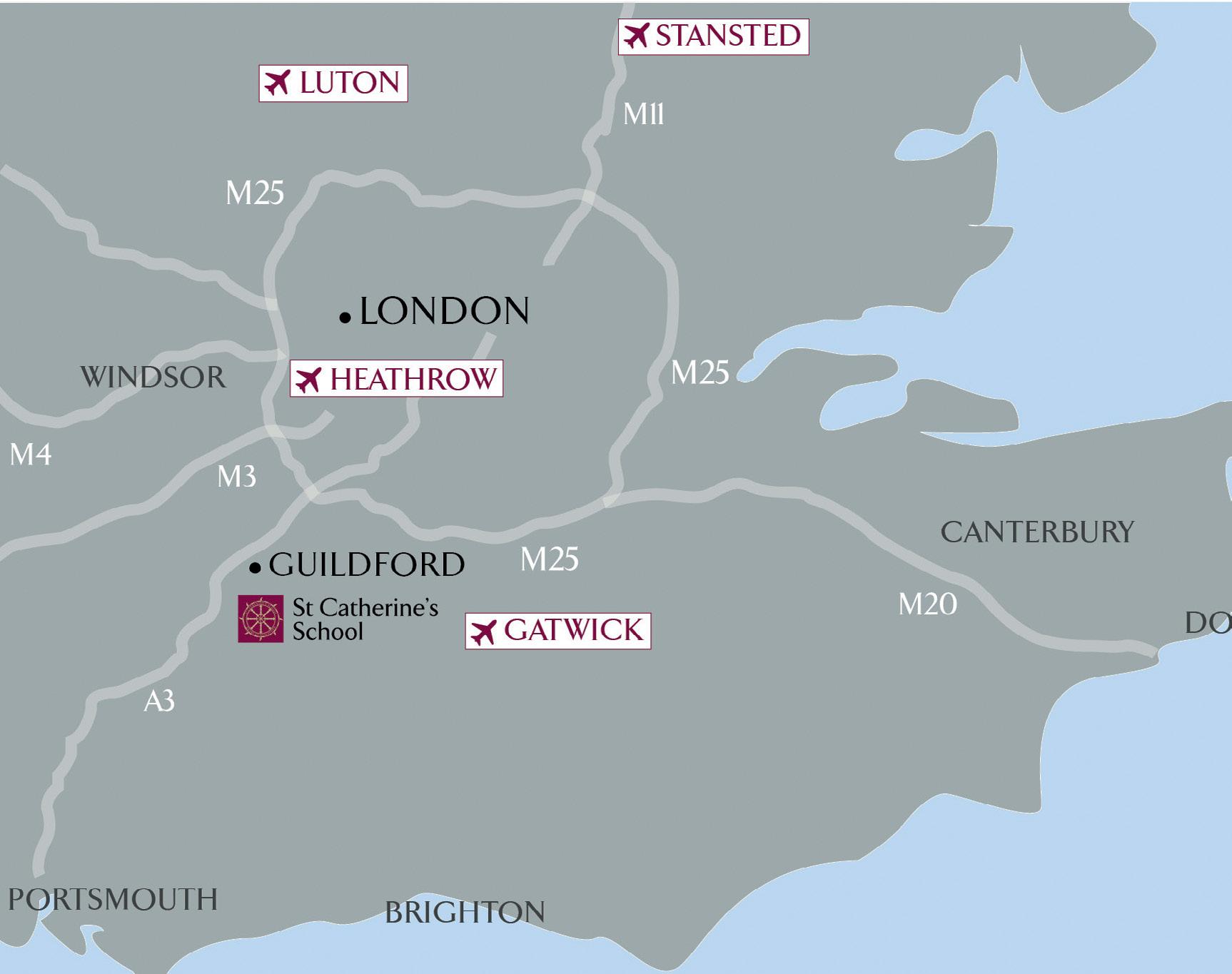
Ms Chan, Parent
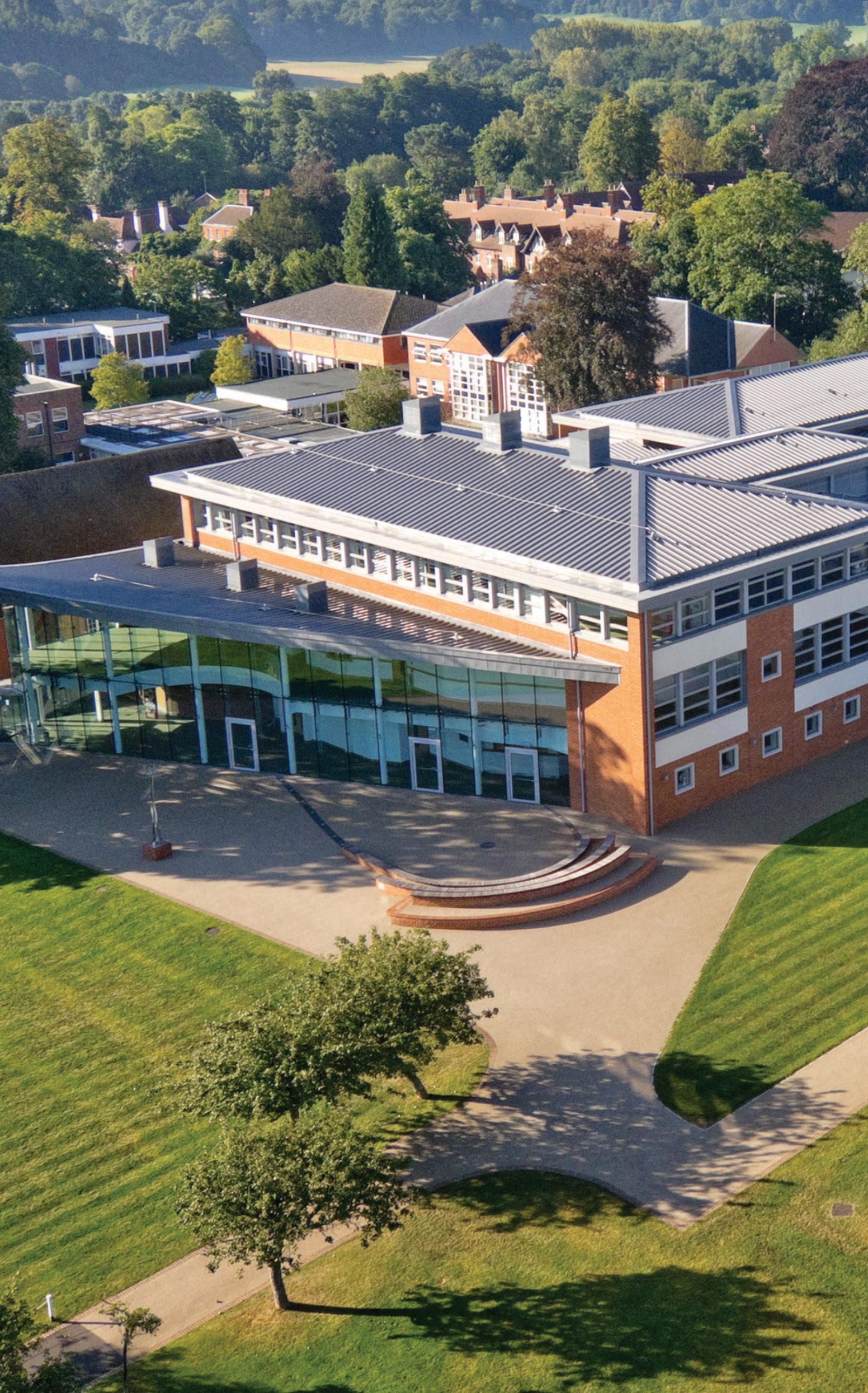
59
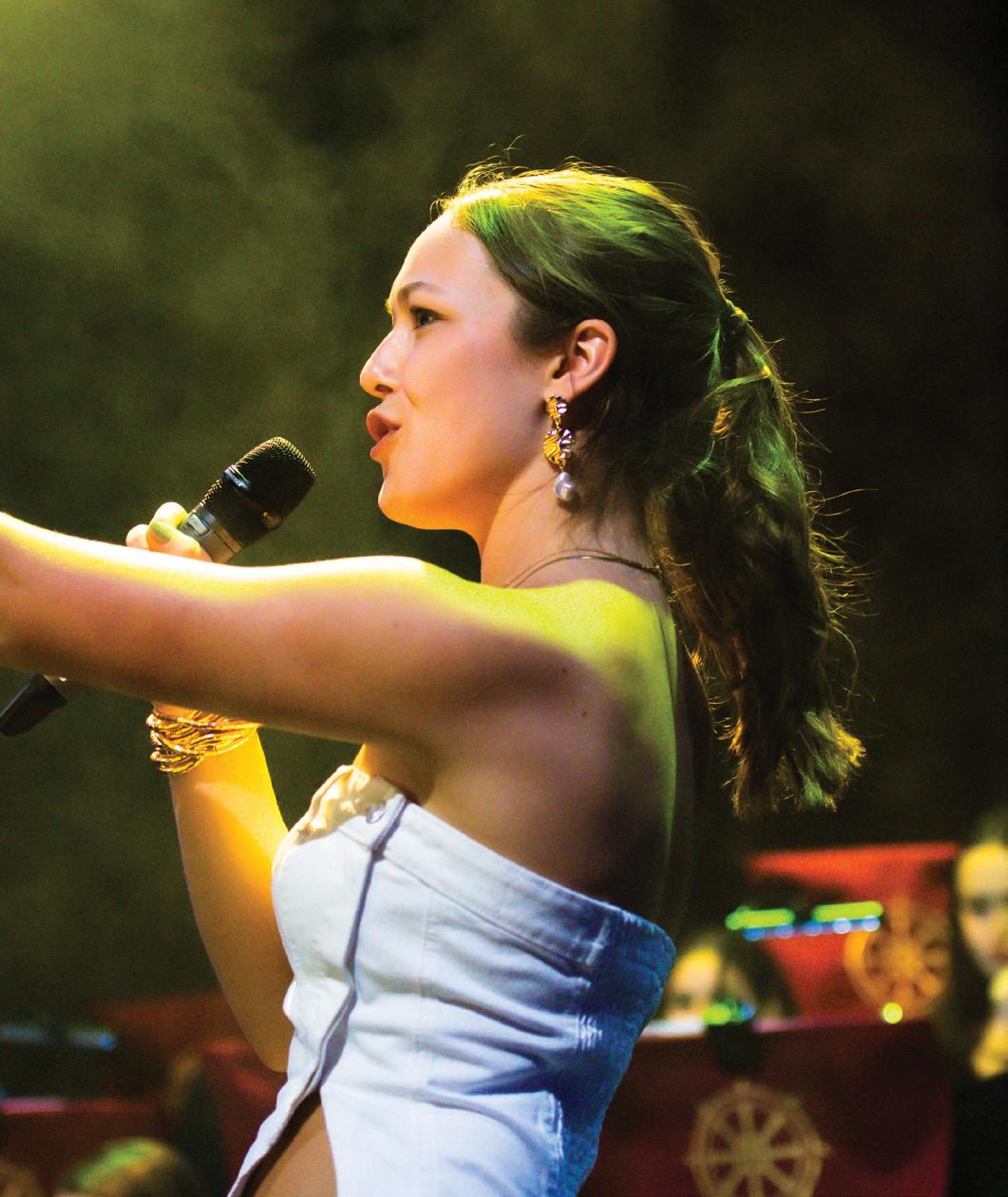
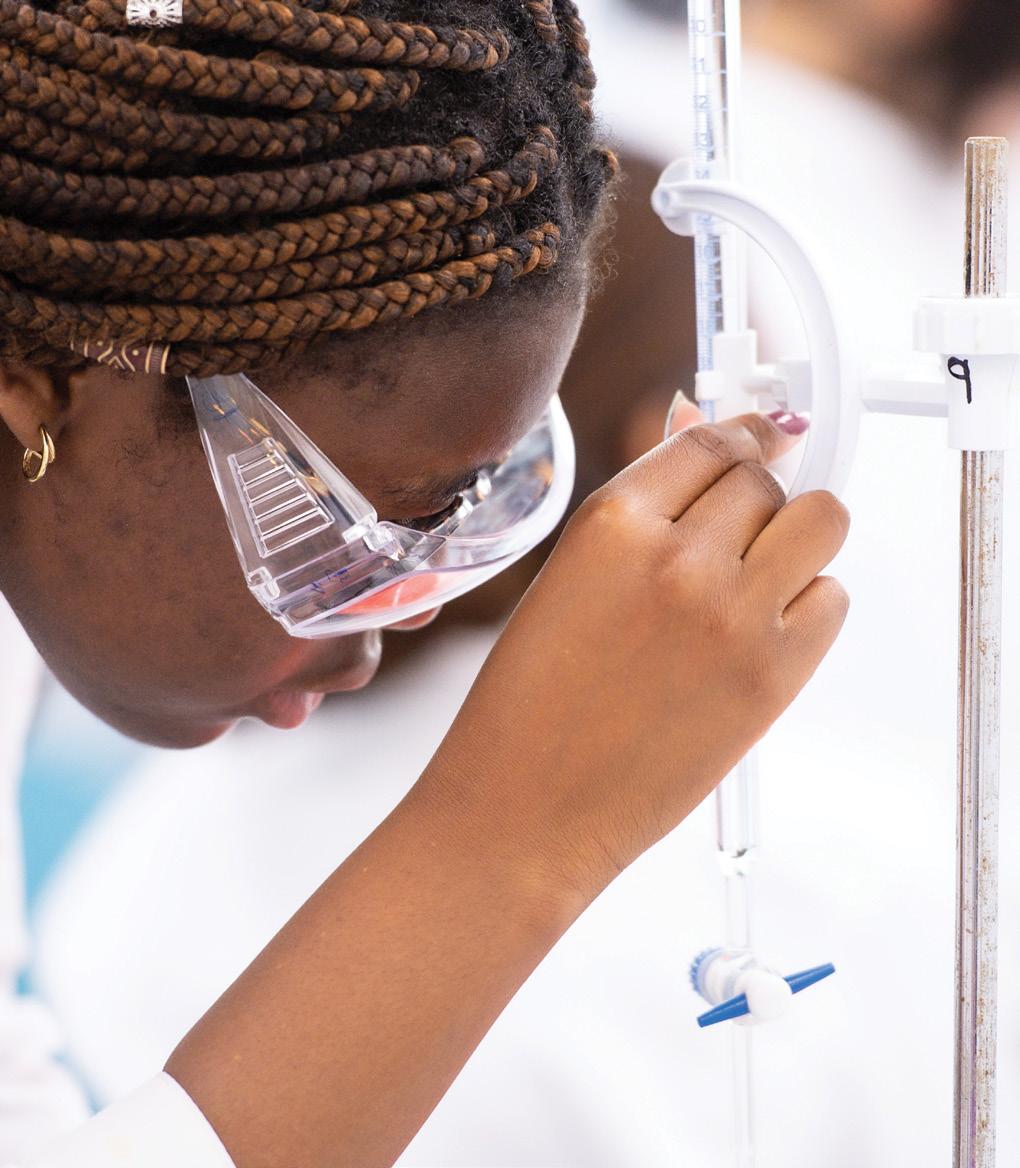
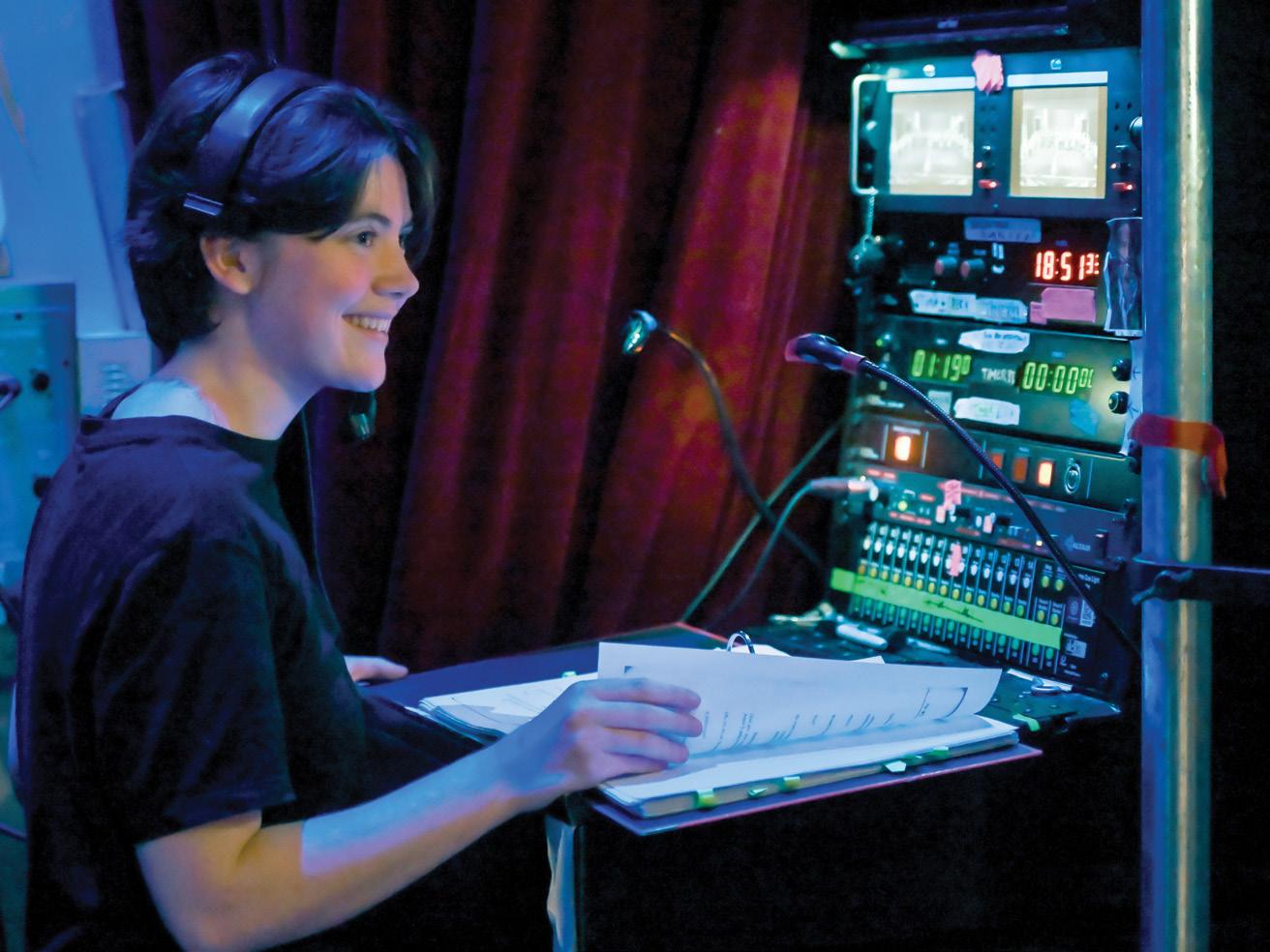
St Catherine’s School Bramley, Guildford, Surrey GU5 0DF t: 01483 893363 | f: 01483 899608 | e: schooloffice@stcatherines.info | www.stcatherines.info
It is very inclusive and allows for a melange of cultures, enabling girls from all over the world to form deep connections. Takyiwahh

















































 Kate Hawtin Head of Sixth Form Oxbridge Coordinators Oxbridge Visits
Catherine Taylor Head of Careers
Elodie Nevin Director of Studies
Catherine Peel (Arts & Humanities)
Claerwen Patterson (Sciences) Dr Guy Brindley
Kate Hawtin Head of Sixth Form Oxbridge Coordinators Oxbridge Visits
Catherine Taylor Head of Careers
Elodie Nevin Director of Studies
Catherine Peel (Arts & Humanities)
Claerwen Patterson (Sciences) Dr Guy Brindley






 Frankie Mitchell (2010), Barrister, Wilberforce Chambers, discussing careers in law at the Careers Forum
Anna Gibbs (1997), Publicity Director (UK & EMEA) for Disney Studios/ Disney+
Frankie Mitchell (2010), Barrister, Wilberforce Chambers, discussing careers in law at the Careers Forum
Anna Gibbs (1997), Publicity Director (UK & EMEA) for Disney Studios/ Disney+

























